
…is still with us, though a welcome email from our MP during the week contained welcome news about funding for the future. The promise is for all schools, not just Bishop’s – one of an increase in the National Funding Formula from £4,800 per Year 7-11 pupil to £5,000, together with a commitment to fund the recent increase in employer’s pension contributions for the next three years. Together this represents an encouraging increase in funds of around 4.5% and, if it comes to fruition, will strengthen our budget considerably. The current political uncertainty does not give grounds for confidence at any level however; growth predictions for UK PLC as we exit (or perhaps don’t exit, or think about exiting) the EU vary considerably, and I worry about therefore whether pre-election commitments will turn into post-poll reality. Time will tell.
So those of us in schools still wait for the dawn to break in the world of education finance. Here in Bishop’s the increase in numbers in the Lower School is helping, but money remains tight and we are continually a year behind as the money follows the boys. That means that the school’s Gift Aid Scheme remains as axiomatic as ever; the simple truth is that for the price of a pint of beer/glass of wine a week our provision for all of our boys can be made absolutely top class. I am immensely grateful to all of our parents who have already enrolled in the scheme; if you have not given it thought so far please do. You can make a difference.
SDS
…took place last Thursday in the Cathedral. After a swift registration in school, the bells summoned the great phalanx of blue-blazered bodies onto the North Walk and Bishop’s Walk, and the diagonal path across the Green filled rapidly. It is only really on such mornings that I suddenly realise just how many boys there are at our school as they stream towards the North Porch. Once inside Bishop’s Boys decant into the nave and transepts, settling in a chattering mass and changing the dynamics of the medieval building dramatically. That must be how it has happened for over a century and, as I said when I introduced the service, the hand of history on the shoulder is inescapable. We benefited from some rather rare sunshine on Thursday morning which transforms the nave into a work of Art, diagonal shafts of light falling across the space and catching the dust spiralling upwards. Golding wrote of this in ‘The Spire’, and it easy to see why it caught his imagination. We are so privileged to be able to come into such a space so often, and I urged everyone in the service to not take it for granted, to soak up the atmosphere for themselves. It is of such things as these that memories are made.
The theme of the service was ornithology, a passion of mine since a very young age, and the service sheet and my script should be available on the BWS website at http://www.bws-school.org.uk/main/The_Chapel/. The particular focus was on the relationship between mankind in the UK and the Red Kite, employing the species as a proxy measure for the health of the environment. It is not a story without hope; in Tudor times kites were common scavengers in cities and countryside throughout England, Scotland and Wales, but a combination of hunting, trapping, poisoning and habitat encroachment caused their decline to near extinction by the late twentieth century. Since the late nineties however their prospects have dramatically changed, so much so that I now regularly see kites flying over my garden to the North East of Salisbury, and they can even occasionally be seen soaring at height over the city centre. Research, reintroduction, protection and monitoring have reversed the population decline, so that kites now rival buzzards on the summer thermals across Southern England – a wonderful sight for everyone, whether you are a bird enthusiast or not.

The story of the Red Kite gives hope for environmental change and the power of mankind to effect change for the better. My hope is that governments also understand that positive action can achieve similar change on a bigger scale in the future, and that they can be persuaded to take appropriate and proportional action now.
SDS
There’s something really brave about reading a piece of poetry in public. You never really know how the audience might react – if it is humorous will they ‘get’ the funny bits? Will they laugh at all or will they sit there stony-faced or cynical, asking (without actually asking) why you bothered in the first place? If it’s not funny will they laugh anyway, at rather than with the reader? Or will they simply be mentally elsewhere, coming to at the end of the last stanza with a telling look that says ‘oh good, finished at last then?’. And of course it’s worse if you are not entirely used to doing the job. Will I get the flow and rhythm right, will I stress and un-stress so as to make sense of both what the poet has written and what underlies the words? And do I really understand what the meaning of the words really is – not just the literality spelled out by the words and phrases. Do I know enough? Do they know more than me?
All of which makes NPD an intimidating prospect for all of those who are not gifted enough to be English Teachers, and who have therefore not got the necessary toolbox for the job to hand. But each year the day comes around at the beginning of October and each year Craig Ennew (BWS’ Head of English) sends out the rallying call across the BWS staff to encourage as many brave souls as possible to read at the beginning of each lessons that they teach. And each year there is a response from across the departmental divides. 2019 saw an eclectic mix, D.H Lawrence rubbing shoulders with Seamus Heaney and Dylan Thomas. There was more school-focused material, for example ‘Economics’ and the rather prosaic ‘Eye Have A Spelling Chequer’, but boys also heard the wonderful ‘The Road Not Taken’ by Robert Frost, and Ewan MacColl’s ‘Dirty Old Town’. The Languages Faculty played a full part with Victor Hugo’s ‘Demain, des L’aube’ and (slightly less profound) ‘An Ode to My Socks’ by Pablo Neruda. There will have been many others…
I toyed with the idea of a rock-centred poem, of course. Auden’s ‘Ode To Limestone’ was perhaps first in line, but on balance I thought better not – it’s not perhaps his most compelling piece! Instead I was completely self-indulgent and chose one of my all-time favourites, Ted Hughes’ ‘The Thought-Fox’. It’s hard to read, and even harder to fully comprehend what Hughes had in mind when he wrote it, but the imagery that he uses has always gripped me, mainly because of my lifelong fascination with the natural world around us here in Britain. The fleeting images that I have had of foxes, almost always on very early morning bird watching trips come back to me vividly every time that I read the poem. The images stay with me, inspirational and un-faded, and I guess in Hughes’ words the page is printed.

I read the poem and, much to their credit, my A level Geologists listened. I was really impressed that there was some hinterland of knowledge too, so that they were aware of not only the poet but also some of his traumatic life story too. I really do hope that my rendition of the poem made them want to read some more. If they do, then it is mission (partially) accomplished for NPD 2019.
SDS
HMC’s annual get-together this year is at the Intercontinental O2, an enormous monument to steel and plate glass architectural ambition on the southern meander of the Thames. As I write I am facing the mesmerising panorama of Canary Wharf as the outriders of Hurricane Lorenzo race through, the gleaming slabs of the financial district reflecting a sky in turmoil. It’s an image that has parallels with the mood of the meeting this year, as independent school Heads contemplate the latest policy announcements from the Labour Party Conference last week; taxation, abolition and redistribution, the storm clouds seemed to be gathering as HMC prepares yet another rearguard action against a battalion of threats. The very good opening address by this year’s Chair, Fiona Boulton (Guildford High School) focused as might be expected on the benefits of collaboration with the state sector, the investment in bursaries and the sharing of facilities and resources with state schools’ which continue to suffer from underfunding. But there was also defensiveness there too, inevitable given the context, and some justifiable defiance. Angela Rayner really had thrown the proverbial kitchen sink at the private sector in a speech that went down very well at the Labour Conference but then had a distinctly lukewarm reception from the broader audiences, both public and media. Sticks and stones I guess in the end and maybe the brief political squall served both sides well as it galvanised opinion as much as it polarised views.

As always I feel a little bit on the edge of the debate here, but very glad that I have come nonetheless. Despite the preoccupation with politics, the conference has once again been endowed with breadth, richness and diversity. The range of schools from the UK and abroad lends a range of experience that cannot be matched by the state sector, and the pulling power that HMC has enables the conference to attract great speakers – notable this year was Mark Thompson (CEO of the ‘failing’ New York Times and ex-DG of the BBC) who spoke compellingly about the role of the media in times of uncertainty and the rise of populism. It would be difficult to find a better advocate for the Fourth Estate on either side of the Atlantic and it was fascinating to hear the inside track on some of the great issues impacting on press freedom and independence over the past two decades. Networking with other Heads and exhibitors at conferences is always useful and often interesting, but my annual pilgrimage to this conference is invariably made memorable by a headline speaker.
I will come away with some misgivings nonetheless; my unanswered questions about Oxbridge admissions, the nature of charitable status and the fairness (or otherwise) of the employment of top-quality teachers when state schools are struggling to persist. State schools are compared, unfairly, to HMC schools of the same size which have operating budgets which are three or even four times larger, and yet the state sector is targeted all too often as being ‘inefficient’ (I include BWS in this of course). But despite these concerns, I am still really glad that HMC is there, and that the many fine schools that it includes continue to give parents the choice that they deserve. My job is to make sure that Bishop’s can match the best of them so that as many parents as possible can access an education for their children that is of startlingly high quality, and there is no doubt in my mind that attending the HMC gathering at the O2 helps me to do the job.
SDS
…or at least that’s what it felt like to me when I visited a large 11-16 comprehensive school over the border in Hampshire last week as part of our recruitment campaign for BWS Sixth Form 2020. I always like going to visit other institutions, and this experience was no exception as the school concerned was different from BWS in so many ways. On the surface there were similarities, as the boys and girls were well turned out, very smart in their blazers and ties and very polite and welcoming throughout. The staff were great too – making sure that lost souls like me who meandered around the site were directed on the right path to the Sports Hall, and then fed and watered through quite a lengthy session. But then the differences hit home as I set up my stand and arranged prospectuses and paraphernalia over the BWS display cloth. There were no other schools at all at the HE and Careers event. Instead, mixed in with the apprenticeship providers, employers and public service stands were at least 5 colleges with thick, glossy publicity booklets full of a myriad of courses for youngsters to consider once the age 16 milestone has been passed. I had sort of anticipated that contrast to Wiltshire, but the reality of the world of FE only really hits home when you are in the thick of it; it hit home last week for me forcibly.
The good thing (for BWS) is that being present in such an environment makes us very, very different. There was a widening of eyes when I pointed out that our sixth form was one-tenth the size of the other providers, and there was an intake of breath when they then asked about GCSE and A level results; some even thought that they had misheard and had to ask again to check. Some, both students and parents, thought that BWS must be fee-paying and again couldn’t quite process the fact that there was no termly billing. Year 11 boys and girls took prospectuses, Year 9 students took leaflets for future consideration and parents went away clearly wondering how they had not heard of BWS before. All in all a fascinating experience for everyone I think, and certainly the first of an annual fixture from now on.
Now I am entirely realistic, and I tried hard to engender a sense of hard-nosed realism into all those conversations with boys, girls, mums and dads. BWS is not for everyone; the grade requirements are steep for some at 48 points from the best 8 GCSEs, and grade 7s required for a significant number of subjects. That will make the school inaccessible to some, an inevitable consequence of differentiation by outcome, but we all have to be sure that the pace, pressure and learning is at an appropriate level for boys and girls who choose to study in The Close. It’s not just a question of merely coping, we want the students to feel comfortable so their self-esteem and confidence grow and they have the time to get stuck into all of the other parts of sixth form life too. That’s life. But equally, there is the question of aspiration there too. For those who feel that the grade requirement may be within reach, there is an added incentive to work hard and do as well as they can so that they have BWS as an option if they wish to apply. It’s very easy to blend into a big year group, to swim with the tide and if that happens then aspiration can be one of the first casualties. I really do hope that a significant number of those boys and girls who took a copy of our lovely new prospectus home think seriously about giving a BWS application a go, and that their performance at GCSE is boosted as a direct consequence. In some ways the leaflets for the Year 9s were even more important, as for them BWS is now on the radar and they have more time to focus on working for what matters most – a chance at a World Class Education, but in an entirely different world.
SDS
Prize Giving is always a bit of a glance in the rear-view mirror. As the last academic year dwindles in the memory we take a last, nostalgic look before turning to glance at what is coming up. This year the event felt rather different, as it started at 1530 and was finished well before 5pm. Instead of coming out through the North Porch of the Cathedral into darkness, this year there was a lovely spectacle of families reuniting to celebrate achievement in the autumn sunshine. The sun also played its part in the service itself, as I think that the nave always looks utterly spectacular when the source of light is outside the building. For the first time that I can remember virtually everyone, both staff and boys, was present – and that is really important I think, as it is these whole school events in Great St Mary’s which are so memorable. As I said to Year 7, this is your chance to ‘get’ Bishop’s, to understand the essence of your new school. I suspect that Prize Giving 2019 will have made a lasting impression on them; the upshot is that the new arrangements are here to stay.
If your eye strays down this page you will see the text of my speech. I have published it for the first time together with the programme copy, partly for the benefit of those who couldn’t attend but mainly because there are some key messages there relating to our move to a coeducational sixth form from September 2020. I took the opportunity to deal with some of the questions that I have been asked over the past 6 months or so since the new Admissions Policy has been in place. Will the BWS Sixth Form grow (yes), will there be places for everyone who gets the entry requirements (yes), will boys lose out (no), will there be adjustments made to suit female students and ensure they are happy (yes, of course) and so on. What is really good is that as far as I can tell everyone concerned seems to be on board with the change, and there is a palpable feeling of excitement as my staff start to visit schools to highlight what we have to offer at Bishop’s. Many schools over-use the term ‘outstanding’ as an adjective to describe their provision and thus erode its potency. My view is what is on offer with us in the Cathedral Close is very special and unique in ways that are both quantifiable and not, and the only real way to get a feeling for what is here is to do your research and then visit. Once potential sixth form students have done that they cannot fail to be impressed and, in the same way as those Year 7 boys in the Cathedral for the first time, they will quickly understand just how much potential our school offers. In the 11+ last Saturday we had a record number of around 380 sitting the test; in the same way, I am hoping that there will also be a record number of applicants to join Year 12 in 2020, from both young men and women from across the region.
SDS
Good afternoon ladies and gentlemen and boys, and a very warm welcome to Bishop’s Prize Giving 2019. Just that first sentence marks this event out as being rather different, a break with tradition as we start and finish the annual celebration of our boys’ achievement as the shafts of Autumn sunshine pierce the windows of the Nave. For the first time in living memory our new Year 7 boys are at Prize Giving with the rest of us too; in fact this will be the first time that they have been in this wonderful place for a school service at Bishop’s. The first of many – so boys you are especially welcome, read, watch and listen carefully to what goes on here, as this shows what Bishop’s is all about. The young gentlemen who are collecting prizes are a little further down the road than you, and that very long list of university places will probably be you in 7 years’ time. It’s all here on this Thursday afternoon – awe and splendour, legacy and tradition, spirit and celebration, aspiration and high achievement and, at the very heart of all of that, nearly 1,000 boys. Thank you all for joining the school this afternoon, and I do hope that you enjoy the novel experience of emerging through the North Porch onto a bright sward amid a bustling cityscape, rather than stumbling out into the gloom and drizzle of an autumnal mid-evening…
I’m delighted to welcome Nick Beer here this afternoon too. You’ll have seen from the programme that Nick has had a fascinating career working in the maritime sector; for a while he had an equally challenging role as Chair of Governors at BWS. In fact I am in the unusual position of welcoming two ex-Chairs of the BWS Governing Board here this afternoon to join Jill Horsburgh, who is the current incumbent. 3 Chairs of Governors simultaneously! I am bound to wonder – can you have too much of a good thing? Surely not, but as you may guess I will probably not be giving them any opportunity to compare notes after the service…!
We arrive here riding the wave of a very strong set of results from our boys in both Year 11 and Year 13. The media, local authorities and the Department for Education fixate as ever on baseline data and statistics of performance and progress, but I prefer to focus more on outcomes and opportunities. Because those GCSE grades were so good our Year 12 have started their A level courses in fine fettle, and as you can see from today’s programme the A level boys did themselves proud too. We should all be very proud of what they have achieved, and equally pleased and proud that they are now progressing to competitive universities across the country. The Bishop’s diaspora continues to grow, and I wish them all the very best as they prepare for freshers’ parties on campuses across the UK…
The fact that our boys did so well is not a case of mere happenstance. So much work goes into the routine classwork through the year, very often unseen, as my colleagues put in all the support that is so vital for success. But now that so much more information is migrating into the digital environment it is possible to get a more accurate handle on the scale and scope of the effort that is going in. Insight, the school’s information portal opens the door so that parents can look a little more into the workings of the machine. Homework diaries are now a thing of the past, and I suppose that dying with them are some of the perennial excuses for missed deadlines that have been honed by generations of Bishop’s Boys decades.
Development of new working methods enable learning to be more flexible and unavoidable, but the effort still needs to go in from the staff. That is exactly what happened, in spade loads, last academic year. Beyond the classroom the same was true, as our sports teams took on high quality opposition across the region and the country, our musicians showed both bravery and panache, our thespians gave John Buchan an excellent run for his money at the Studio Theatre and our Duke of Edinburgh Award boys made us the largest and most successful school unit in the region. There were trips galore, including our first multi-sports tour to Japan and a rather poingnant visit to Brussels for our politicians. There is breadth – real breadth,which we should all celebrate, and that is one of the reasons that today is important as reading through the pages of the programme is another way to get your finger close to the pulse of the school.
The scale of activity can also be amply demonstrated by some numbers. Schools are rightly keen to invite outside speakers to talk to students to inform, educate and entertain, but also to inspire and raise aspirations for the future. In 2018-2019 over 90 speakers visited this school to talk to our boys (and girls from South Wilts too), quite remarkable. Another example of scale and ambition to do things well was the BWS Higher Education Fair, organised by Sally Armstrong and run in the Sports Hall in February; 66 universities from the UK and overseas, employers, training and gap year providers were there, and the event attracted around 800 visiting sixth form students from 8 other schools.
Our Oxbridge Briefing Evening the night before attracted around 300 students and family members from across Wiltshire, Hampshire and further afield. Our regional influence and importance is growing, and this is also reflected by our digital footprint; nearly 2,000 followers on our main twitter feed, 44 individual school twitter feeds from French to Fishing, and from the Library to Lacrosse. Our LinkedIn connections number almost 2,000 as well, and earlier this year the BWS Alumni Office completed the initial trawl of around 11,000 alumni on our database. Big numbers representing a broad base and masses of communication and networking.
I think that I should probably single out the Maths and Science Departments this year for a special mention for several reasons – simply stellar outcomes in the various super-curricular challenges and Olympiads at a variety of levels, including some of the top marks in the country in every case. At the senior level one of our star scientists secured a Roentgenium Award, the second for BWS boys in two successive years. And lower down, our Year 10 boys won the National Top of the Bench Competition run by the Royal Society of Chemistry. Our boys have secured a record seven competitive Arkwright engineering scholarships, double the number of the previous year (there are only around400 awarded annually in the UK) and this success is mirrored by BWS teams winning engineering competitions across the country. No real surprise then to see so many boys proceeding to scientific disciplines at the most competitive universities, including 18 to Oxford and Cambridge this year; the future looks bright.
Of course September 2018 and this September are marked by the influx of our larger year groups as the demographic bulge moves inexorably upward through the age range. It’s good to see; the school feels very busy and full on, especially at break times and we have had to look at how we manage space around the site. The arrival of an army of table tennis tables (courtesy of the Parents’ Association) has created a new dimension to the school’s House competition calendar and sporting potential; a strong performance from our ping-pong players bolstered our performance in the County Sports so that we emerged as clear winners this year. It’s good to see so many youngsters travelling down Exeter Street to Britford Lane in a blue and white caterpillar that is larger than ever, and it’s even better to see them competing on the sports field. Competition is growing steadily at the grass roots level, and participation too; I can’t wait to witness the effects of the expansion as our bigger year groups come through to senior level. You can see the impact of more boys lower down too, for example in music where the orchestra is well populated with enthusiastic string players, the Choir is big and there are more musical groups than ever. That list of musical grades achieved in the programme is as long as I can ever remember, and the standards at House Music showed lots of evidence of musicality and sheer guts from even our youngest Year 7s.
2018-2019 was the year where we announced the move to coeducation at sixth form level – albeit the change will not take effect until our first girls join Year 12 in September 2020. Last year, therefore, was the year of planning and this current year is one of recruitment as we open the door of opportunity to both girls and boys to join us from the start of the next academic year. We believe that what we can offer at Bishop’s is absolutely distinctive in many respects – the extraordinary prospect of learning within the most beautiful Cathedral Close in England, close to the centre of a marvellous market town (including thriving fast food outlets and coffee houses; the meal deal has never looked so attractive!); a high quality, well-resourced academic curriculum taught by subject specialists who love what they do; real diversity beyond lessons and one-to-one mentoring and support to which other institutions can only aspire. We are taking the message out to a broad range of other schools to make sure that there is a good level of awareness of the Bishop’s package throughout the region. We really do offer something that is unique in so many ways – a World Class Education in an unforgettable setting.
Our sixth form will grow with time. We anticipate a good level of interest for the next two years with girls applying for the first time, and thereafter of course our larger year groups will have finally arrived at Year 11. If the current pattern is retained then year groups are likely to rise to 150-200, and so the size of the sixth form will grow considerably. That is healthy, as the Sixth Form is such a vital entity for a big, thriving grammar school; in many ways the students in Year 12 and 13 are the trail blazers for the rest of the school, often setting standards, demonstrating what is possible, making things happen for younger boys and acting as ambassadors for us all. Today’s programme says all of that and more – if you are below Year 12 then that will be you in years to come. No pressure whatsoever then…
I thought that it might also be helpful to deal with a couple of questions that have arisen from parents, usually in the aisles of Waitrose – often one of the best places to have a candid conversation (unless a member of Year 12 is stacking the bread within earshot!). Yes, we are tightening the entry grades for Year 12 a little to ensure that boys and girls who join us will be happy and comfortable working at BWS. Our grades will also allow more flexibility overall too; we recognise that there are those for whom Maths is a foreign language, and equally some for whom writing an essay is a form of medieval torture. We are that rarity these days, a broad church with room for specialisation. Don’t worry if your son or daughter is in a lower year and you are wondering if there will be space; we don’t anticipate turning anyone away who has made the grades, and boys will not lose their places to girls! Naturally we will be carefully designing the pastoral support, counselling, enrichment, mentoring and extra-curricular programmes to ensure that they will be suited to coeducation. The great thing is that without exception my staff are really looking forward to welcoming our first girls into Year 12, as we all believe that they will bring an added dimension to the sixth form. Those of us who have been teaching mixed gender classes for the past 20 years or so know that this is the case…
I hope that together with the detail of the programme what I have said has given you a clear impression of the school as it has operated over the past 12 months, and that also you have a clear feeling for the year to come. 2019-2020 presents the prospect of further growth, strengthening of results, broadening of opportunity and change in the senior school. I thought that I’d finish by reading a very short section from my Salisbury Journal column earlier this month. “The start of the Autumn Term is an odd time of year to be in teaching, one where everyone has to go back to square one yet again. But it’s also rather wonderful. When I delivered my address in the first whole school assembly I could almost feel the pent-up potential of nearly 1,000 youngsters sitting in the Sports Hall in front of me. What, I wondered, will this fantastic group of boys achieve in the next 12 months?"
That is for next year and the years to come; for this afternoon, thank you for listening and enjoy the rest of Prize Giving 2019.
SDS
As I write, the best part of 400 small boys are sitting their CEM Tests in the BWS Sports Hall and elsewhere and the 11+ is in full swing. That is far more than we have had before in my time in Salisbury; looking back the next highest was 339 back in 2002, a usual level being 270-310. I suspect that there are several factors in play here. The return of British Army personnel to the UK in general and Wiltshire especially is now happening, and it is clear that there is quite good level of awareness there which will have an effect. The growth in housing around Salisbury, at Old Sarum, Harnham, Laverstock, Bishopdown and now Long Hedge and St Peter’s must be bringing new families to the area though my assumption was that this would not come through just yet. The same goes for the growth of estates to the south of Amesbury, where it feels now like a new small town has appeared, mushroom-like from the fields. The fact that we now take 160 into Year 7 has changed perceptions of the accessibility of the school to families both locally and further afield, and growing consciousness of the quality of what is on offer here seems to be permeating greater distances within Wiltshire and across county boundaries too. I’m not complaining in the slightest – far from it – but I do want to make sure that Bishop’s remains a school right at the very heart of its local community, and that we have lots of happy, fulfilled boys joining us. If those are both true then we are doing the right thing.
The recruitment story looms large at a more senior level too, as we are now advertising our superb sixth form package to boys and girls in Year 11 across a much wider stage than ever before. This term my staff will be visiting a total of 44 state schools which lie within 60 minutes travel time of BWS to tell students and parents what we have to offer here. Many of those schools will not have been visited before – for example those in Andover, Winchester, Basingstoke and also to the south in both Hampshire and Dorset. The reality is that Bishop’s is radically different to what is on offer for those Year 11s in their more ‘usual’ routes of progression once they are 16 and GCSE approaches. There are some good FE colleges but, the nature of the beast means that they have very large year groups and results can be variable. In comparison our manageable teaching groups at A level and brilliant teaching, our focused academic curriculum, our closely supportive one-to-one mentoring, our emphasis on holistic education and the supported development of individual study skills and the sheer pace of learning is entirely different to what a sixth form college can offer. Add to that BWS’ relentless focus on academic standards and our extraordinarily good university progression (60% Russell Group, 18 to Oxbridge in 2019) and I think that there is an immensely attractive offer that will leave most others in both state and private sectors some way behind. And all, of course, located in the most glorious Cathedral Close in England…as well as Greggs and Boston Tea Party!
For prospective parents I sometimes describe Bishop’s as a launch pad for the future, and it’s true. For boys, and girls who come here there are endless possibilities which become within reach.
SDS
This time of year is always a little odd. The start of term for many teachers has a cathartic edge; even after three decades in the profession I still find myself trying to recall how to teach in early September, and my voice still feels the strain at the end of the first week back. The school site, for me, retains an over-familiarity born of multiple visits during the summer break, but that won’t be true for many who share the teaching vocation. I am sure that many teachers simply switch off between mid-July and the start of this month, choosing to let the adrenaline flow from the system and simply enjoy the down time. Rightly so – working in a school is a full-on experience every day between 0840 and 1550, with the demands of classroom delivery being enhanced by the unpredictability of the customers and the odd bit of crisis management. Teaching still is a wonderful, draining, exciting, frustrating and exhilarating job to be in, and all of that is amplified when the Autumn Term kicks off.
What makes the start of the September Term even more surreal is the change in the human society within Bishop’s. Suddenly there is a teeming mass of small boys spreading across the site in over-size blazers, competing for the multitude of ping-pong tables at break and hurtling at breakneck speed across the yard in pursuit of a deflated football. Each new intake of 160 boys brings with it an enormous injection of energy and more than a little chaos, but it is so good to see boys who are happy to come to their school and play their part. The older lads seem rather more sedate in comparison, but there is novelty there too in every year group. Physical growth over the summer break introduces an edge which wasn’t there in July, and they seem to have grown in experience and maturity too. The contrasts are at their most stark in the Sixth Form, as there is nothing quite like a suit to make him feel different. Suddenly that Year 11 who was a bit rough around the edges emerges into the sunlight of Year 12 as a young gentleman – and that difference is reflected by lots and lots of similar conversations with parents over these initial weeks. I am sure that the same will be true of girls who join our sixth form next year too.
So yes it’s an odd time of year to be in teaching, one where everyone has to go back to square one yet again. But it’s also rather wonderful. When I delivered my address in the first whole school assembly I could almost feel the pent-up potential of nearly 1,000 youngsters sitting in the Sports Hall in front of me. What, I wondered, will this fantastic group of boys achieve in the academic year to come?
SDS
…or at least that’s how it is beginning to feel. The glorious summer sunshine and the marquee in the garden of No11, the oldest building on the school campus were the tell-tale signs that the close of the academic year is nearly with us. It was slightly galling to attend the Prize Giving at my wife’s school last weekend; it was their last day of term and a number of cheerful staff wished me well for the final fortnight, knowing that come Monday they would have the delicious option of ignoring the alarm and simply turning over to resume slumber. No matter – these final working days will pass in a flash, I’m sure, with the kaleidoscope of activities to come between now and 19 July. The end of the summer term may be an exercise in endurance (for everyone!) but it is never dull.
This time of the school year has a ritualistic element to it at Bishop’s. The whole of Year 7 have recently visited their Great Yews Camp, by kind permission of the Longford Estate, accompanied by a battalion of staff and a regiment of prefects. This year the summer sunshine blessed that expedition too, so that the tents stayed dry and the camp fires were quick to light, though the quality of the cuisine was still open to question. The older boys replicate this foray into the great outdoors with Duke of Edinburgh expeditions; I dropped off boys working for their Gold Award in the Black Mountains last Friday, their greatest need being for sunscreen, water and hats rather than waterproofs. Sports Day will follow inevitably, though this year we will have to split the event into its component age groups on separate days because of the maintenance work on the Five Rivers Track. Competition will still be fierce I am sure, as the House Teams vie for supremacy. We have groups from junior schools visiting to experience the scale and pace of learning at big school, and there is an atmosphere permeating the school site of the drawing together of loose threads and the completion of things
Come final assembly we’ll all be ready to go. Twelve midday sees an explosion of humanity through the school gates as the boys and staff pour out into Salisbury, homeward all, and thence to many parts of the globe. I will be amongst them (eventually), as I disappear for two weeks in the mountains, mobile and laptop-free. My hope is that the final week of school fires the imaginations for the boys so that their summer focuses more on books and boots than megabytes, and that the summer break brings new experiences and priceless memories for all of our boys’ families.
SDS
Walking to Great Yews last week was a revelation. I was expecting the woodlands around the campsite to be the usual excursion into the ecosystem, and so it proved to be. Since the security of this part of the Longford Estate has been tightened the quality of the wild life has noticeably improved; the quality and diversity of the understory has grown so that there is a greater variety of micro-habitats and thus a greater diversity of species. In addition to the usual abundant invertebrate life there were greater numbers of butterflies this year which was most encouraging, and the yews themselves are in a better state. There is no doubt that less tree-climbing, fire lighting and general disturbance creates an environment in which nature is more likely to thrive. For the first time I was able to hear Quail calling from the campsite in the evening; given the rarity and elusiveness of the bird that is quite something. No Woodcocks this time around, but both species of partridge, hirundines in the woodland, plenty of warblers and both Tawny and Little Owls to give a crepuscular serenade. Bat watching away from the camp yielded two different species there too.
What I was not anticipating was the wild flowers that were pathside both there and back. I cannot remember such an encouraging display in past years. Though the body of the rippling fields of wheat, barley and oilseed rape remain depressingly sterile monocultures, along their margins Mullein, Yellow Loosestrife, Cornflower, Scabious, Field Poppies, Ox-Eye Daisies and Rosebay Willow Herb mixed together in a riot of colour. I always look forward to the return hike back through Coombe Bissett, as the footpath over Homington Down transects one of the best locations that I know to see Pyramidal Orchids. This year was simply exceptional – hundreds of these scarce flowers crowding the south facing slope in a spectacular display and attracting butterflies galore. Most exciting of all was a first for me – a number of orchids flowering beside the path on the very edge of the housing in Harnham. That cannot be an accident surely? Enlightened farming (with lower herbicide concentration) and suitable weather this year has enabled a rare species to start re-colonising against the odds. I was really excited to see those lurid pink blooms on their long stalks, and my enthusiasm was inevitably shared by Leif Bersweden (ex-BWS) our very own orchid-hunter who celebrated the find over social media.
Great Yews has a bit of a cost. Everyone returns feeling slightly stiff, sleep-deprived, rather grubby and worrying about ticks! But as a naturalist the trip is simply unmissable, as every year there is a special spot of some sort. This year the botanist in me was spoilt for choice, and I returned feeling that this part of the British countryside was rallying after years where intensive agriculture and disturbance has taken its toll.
SDS
Wednesday’s Year 12 taster day was attended by around 120 boys, all aspirants to join our sixth form in September 2020. They had a good day I think, the weather was glorious and they spent time in and around the site gathering information and attending trial lessons to get the hang of what sixth form life might entail. There were plenty of new faces amongst others who have already been with us for five years or so. They departed at the end of the day, passing the next tranche of potential 11+ applicants and their parents on the way. It had not escaped their notice of course that they will be the last cohort of sixth form recruits to be single gender; interestingly this had also registered on the radar of the parents coming in for the Open Sessions too. Times are changing.
As the new boys come in, so another group start to move beyond Bishop’s – the A level boys were in on Friday for their parting of the ways, culminating in a splendid BBQ on the lawn of No11. It’s always a feel good event, tinged with nostalgia but unmissable nonetheless. The customary photo was shot through with good humour as always, the burgers were consumed with gusto and then they were away, dispersing who knows where for the summer pending exam envelopes and the hand of destiny in August. As I write this I am watching The Killers on the Pyramid Stage at Worthy Farm; there is a prominent Wiltshire flag close to the front of the crowd, and try as I might I cannot quite see whether there is a member of BWS Year 11 or 13 at the foot of it!
Tomorrow the first group of boys will go to Great Yews for their camp. Spaghetti and rice will be consumed by the bucket load, toffee pudding eaten for both dinner and breakfast and by night the woods will once again echo with the sounds of ambush. The juxtaposition of events towards the close of the summer term really does give a sense of the turnover of the generations once more…
SDS
Last week really was full-on for me. Three House Suppers (Osmund, Poore and Ward), an excellent evening event at Havelock House hosted by GOC 3rd Division on Tuesday and then a most convivial drinks reception for alumni at the Est India Club in St James’ Square in the West End. What was lost in domestic routine was made up by meeting and networking, the chance to identify opportunities for the future and to cement links with many sections of the school community. The school works best for the boys if barriers are broken down and people talk – and that is exactly what last week was all about.
The House Suppers really are the senior boys’ events to run, and they invariably do a great job. There is nothing like bringing your 10 year-old son to an evening at his future school where he can meet his mates and then hear from the Year 12 boys with whom he will be working come September. I always feel that a fundamental building block slips into place on those evenings, as both the Year Sixes and their parents see a vision of the future enacted; in six years’ time he will be there, with future plans and aspirations. Connection is established, understanding gained, momentum begun and the incoming Year 7 starts to gel well in advance of induction day, let alone the start of the autumn term. The events are so powerful in that respect – as well as being really enjoyable for the grown-ups too.
Beating the Retreat at Tidworth was memorable – the Parachute Regiment Band and the Pipes and Drums of the Tank Regiment, good weather and plenty of people to talk to. One of the spin-offs is that I will be communicating directly with the Army to ensure that awareness of what BWS has to offer is high, especially for the personnel returning from Germany. Many are resettling in the local area and it would be great to see lots of Army families aspiring to send their sons (and sixth form daughters) to Bishop’s. We already have 50-60 HM Forces personnel children here, and I would very much welcome more interest and applications as time progresses.
Connections are vital beyond BWS too, and that was what Thursday night in London was all about. I drove a minibus up to London, taking with me some current staff and also three long-serving ex-staff (John Cox, Joe Newman and Geoff Layton). Despite the traffic jams around Twickenham we arrived in good form and then were joined at the EIC by Roger Crisp (BWS’ External Relations Director) and around 30 alumni from across a wide age range. Some fascinating stories over a glass of wine and (importantly)some really good re-connections made which will be brilliant for the current cohort of boys and their successors. One of the things that characterises Wordsworthians is a genuine desire to help those who are following in their footsteps. I really look forward to seeing the fruits of last Thursday evening, and I am immensely grateful to Pippa Anders and Emma Baker who came along for the ride and the chat, and to those ex-colleagues who made the evening work so well.
All-in-all a tiring but excellent week. Roger has produced a newsletter for Wordsworthians and others across the BWS community which can be found at http://www.bws-school.org.uk/documents/Foundation/2019-06_Bulletin.pdf
SDS
At the latest BWS Foundation Trustees’ Meeting (last Friday evening), we looked at the activities that are planned for the next few months to engage the entire school community. On Thursday this week there will be a get-together for London-based Wordsworthians at the East India Club in St James’ once again, and I do hope that once again a good number of ex-boys take the opportunity to come along after work and enjoy good company in some splendid surroundings. I think that I have persuaded a number of my current and ex-colleagues to attend; as I said on LinkedIn ‘now is the chance to finally submit that missing chemistry homework from 2005. Lol, as the current dialect would have it! Then there is the Ball, the Antiques Road Show and the Last Night of the Proms – lots to look forward to, and lots going on besides.
The Foundation is not just events-driven though, as one of its prime objectives is to encourage boys to apply to take the 11+ who would not do otherwise. This may be because Mum and Dad never considered a grammar school, because none of their friends have, because their school has never sent a boy to BWS or because Bishop’s might be too expensive once you get there. There’s a lot that can be done to address all of that and this year, for the first time, I will be telling parents who come to the Open Afternoons about the opportunity to apply for a bursary from the Foundation to help with any additional costs. Here is the draft text that will go out:
"Applying to secondary school can be a daunting prospect – will the school be right for my son, will the teachers be kind and approachable, will the other boys be friendly, might I get lost walking between my lessons, will I get time to eat my lunch and what will the food be like? The questions come thick and fast, as they will when he joins his senior school wherever that may be. That is part of life.
But there are particular challenges if your son comes to Bishop’s. He will have to wear a uniform and make sure that he looks smart in it. He will need to wear our PE and Games kit, both in lessons and if he represents the school in fixtures. He will be expected to work and play hard and do his best at all times, whether that is in lessons or outside them, and he will have lots and lots of opportunities to take part in activities which will stretch him both mentally and physically. It is precisely that richness which makes life at this school so special. Boys do really well if they are kept busy, and thrive if they are challenged.
We know that parents and boys love all of that, but we are also realistic about the costs of school as well and we know that those additional expenses are not always easy to meet for some families. It is even possible that some families may be put off applying for a place at Bishop’s in the first place. That is why the BWS Foundation will be starting to offer means-tested bursaries from September 2019. Here is a list of the areas where we may be able to help:
As you can see, there are a lot of ways in which a means-tested bursary could help to make a truly World-Class Education a reality for your son. We really do hope that this will encourage you to apply to Bishop’s, and further details on how to apply for a bursary from the BWS Foundation will be available with the joining papers if your son secures a place with us."
Of course all of the above apply to boys who are already with us, and I will shortly be promulgating the BWS Foundation Bursary Scheme to parents. This, together with our existing hardship fund could make a real difference to some. Being at a school like Bishop’s should present the opportunity to shine, and finance should not be a barrier that cannot be overcome.
SDS
At least that’s the way it feels for me and Heads countrywide as the final pieces of the staffing jigsaw fall into place each year. I always wonder whether it is going to work out, whether we will be left at the end of the summer term with a timetable written but insufficient staff to deliver it. But somehow it does – or at least it has up to now as I am acutely conscious of the danger of becoming a hostage to fortune. Some years are more tricky than others; around 5 years ago a wave seemed to peak and quite a few teachers decided to pursue their careers elsewhere, but since then turnover has been at a more modest level. That’s just as well because recruitment is becoming more difficult in Salisbury, reflecting the national trends in training and retention in the profession. Teaching just isn’t seen as being as very desirable, with the combination of modest pay (compared to the other professions), turbulence caused by politicians, funding crises and poor public perception posing some pretty intimidating barriers to aspiration. Potential teachers, whether they are young or mature really do need to have a calling to go into the classroom, and once they are there then challenges of class control and performance pressures make staying in state schools a tough prospect.
Bishop’s is of course a great place to work nonetheless, and though that makes recruitment a little more straightforward I never take it for granted. There is a slightly higher changeover in teaching colleagues for the coming year, so here is a summary of our new starters for September to keep you up to date. Our Sixth Form Office Team will be led by Zoe Lambard, assisted by Amanda Gough as Charlotte Wilson and Alastair Endersby will be leaving for new posts. Samantha Lawrence will Head the Art Department as David Podger is leaving at the end of this term. Teaching in the Science Faculty from September will be Collette Maunder and Ruth Tonkin, our new teacher i/c Psychology will be Nikki Mesnard and Phil Loughlin will join the Maths Department after training with us in the current academic year. Bryan Bull will join the DT Department as Martin Taylor retires and Oliver Stamp (who also trained at BWS several years ago) is also re-joining us to teach History and Politics. There are some internal changes too in the pastoral staff, with Dan Brown and Vicki Danaher taking over as Head and Assistant Head of Lower School (Years 7 & 8) respectively and Louise Drummond has already started as Assistant Head of Middle School. Finally As Natalie Steer (Head of RE) is leaving us, Bal Kaur and Jeremy Browning will be assuming responsibility for jointly leading the Department through the coming academic year. The one gap in the jigsaw remaining at present is for an RE teacher. The post is currently advertised.
It is quite a complex picture; around 70 teachers work at BWS, and almost all of them teach across the full age range including A level. Non-specialist teaching is generally not an option given the demands of the courses and the ability level of the boys, so I am sure you can understand why insomnia is an ever-present danger in the run-up to resignation date at the end of May…
SDS
I wasn’t my idea at all to fix a blue plaque to commemorate William Golding outside the school entrance in The Close. My wife is an English Teacher and so perhaps her view that we should be celebrating our Nobel Prize Winner a bit more prominently was always going to hold sway, and so it did. I worked with a very supportive and efficient Civic Society Committee, the unveiling ceremony took place on a sunny morning on the North Walk and there it was. It was the right thing to do (most things suggested by Head’s wives fall into the category of course!), but what I had not foreseen at the time was that it would become a tourist destination all of its own. The coachloads from Spain, France, Italy, the States and (increasingly) China disgorge their cargoes on Exeter Street and the river of the curious flows through St Catherine’s Gate and past the school gates. Second stop, after Malmesbury House and stories about Handel is the Golding Plaque, so that it is not uncommon for the entrance to be entirely blocked by camera-phone wielding crowds before they move on to contemplate the splendour of the Cathedral.
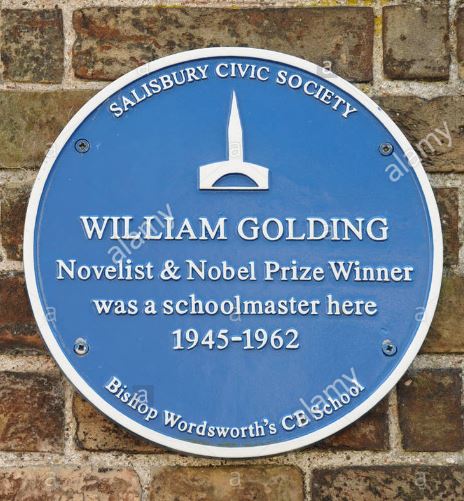
There are other parts to the Golding legacy of course. Pictures in No11 and the Chapel of WG, photos in the archives of him taking part in choral concerts in the 1950s and the School Hall (now the Art Studios) and many alumni who claim direct experience of his teaching and guidance while he was at Bishop’s. ‘Scruff’, as he was affectionately known by his contemporaries, was not a member of staff who was anonymous – whether it was because of his slightly unkempt day-to-day appearance or his habit of wearing his dress naval uniform at parents’ evenings. In lessons he was not a natural; the stories are legion of him writing longhand during lessons and also of him asking boys to complete word counts from manuscript copy. His focus, surely, was elsewhere, and in a framed copy of a hand written letter on my office wall he says that the boys faces ‘blend into one that is not unpleasant’ from his 17 years at the school. Teaching, one might conclude, was not really his niche.
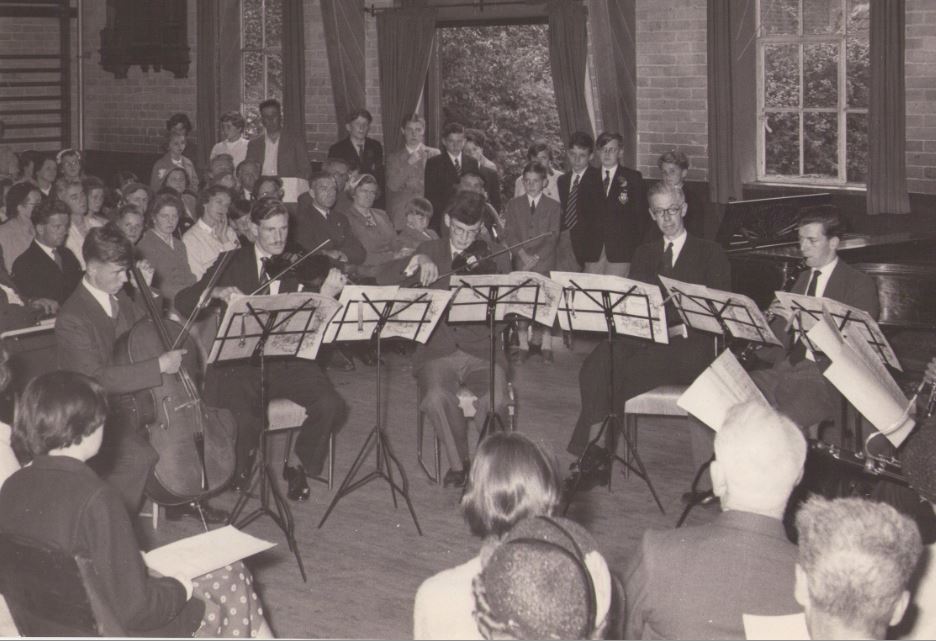
Golding’s breakthrough with ‘Lord of the Flies’ came in 1954. After over a year of editing work split between Scruff and Charles Monteith at Faber & Faber, the novel was published on Friday 17 September to almost universal critical acclaim. At Bishop’s the celebrations appear to have been unbridled – according to John Carey’s biography ‘a zinc bath packed with ice and bottles of champagne appeared in the staffroom and there were convivial scenes. One master, Walter Watson, a fitness fanatic renowned for standing on his head on a mountain peak, stood on his head, when the rejoicing was over, on the small peak of ice that remained in the bath’. It's a compelling image, and one that seems very fitting given both the magnitude of Golding’s achievement and the idiosyncratic nature of the school and staff at the time. I am left wondering whether something similar would happen today…

Times have changed and we live in a World that in some ways is radically different to that of the ‘50s, though human nature remains an enigma and at times the veneer of societal sophistication that we like to think is so robust can erode all too readily. Golding’s writing addresses fundamental questions and forces that have not gone away, and his spare prose and narrative drive still entrance generations of readers in school and beyond. The plaque outside the school gates reminds all of those tourists that genius can flourish anywhere, and the selfies that follow migrate their way onto mantelpieces throughout the World…
SDS
In past years it has not been usual for BWS to enter a team into the Ten Tors Challenge, an annual event on Dartmoor. Teams of six teenagers take on a serious hiking expedition over ten nominated tors, carrying everything that they need with them and camping out overnight on the way. This year there was a team – of Middle School boys – who travelled down to Devon on Friday ready for the walking to start on Saturday morning. The Ten Tors Challenge is almost always the trigger for appalling weather, so much so that in previous years walking parties have had to be airlifted off the moor as hypothermia set in or they were caught in a river in spate. This year was different, as the event was blessed by bright sunshine and azure skies, though the physical challenge remained the same of course, and the BWS boys did really well covering their 35 mile course in double quick time, ahead of the other 16 teams in their section. Please do have a look on the @BWordsworths twitter feed for some great pictures, and I am really grateful that the necessary logistics were taken care of by the boys’ parents this year.


We are at the start of the main outdoor activity season of course – the DofE assessed expeditions, Great Yews and Pencelli beckon. One of my aims for future development will be for every boy in every year group at BWS to have an activity of this type on offer run by the school. Learning is enhanced, confidence and resilience built, teams and friendships are made and memories come as standard. If we can get that sorted then life at school will be improved, for both boys and girls in the future.
SDS
Last week was strange for me. The bulk of three days out of school meant that I felt semi-detached from what was going on in Salisbury, not a feeling that is comfortable for me. It’s not that I don’t feel in control; there are far more competent people than me left in charge of the ship, and remember quite well from my own past life feeling less pressure when the Head was out. Less stalking around school spotting problems, no ‘popping into lessons to have a word’ etc! No, it’s more that I tend to feel out of the loop as my finger slips from the pulse. Email helps a bit, but you need to see and talk to people all the time, face-to-face, if you want to divine what is really going on.
So as you may guess I am out of school as little as possible. Last week was unusual, as it was the planetary alignment of the HMC Spring Conference in London and then the BASS Conference at Stratford (Upon Avon that is!). The former, on Wednesday, focused in on partnership working between private and state schools; interesting, but not of immediate or direct relevance to BWS’ context here in Wiltshire. The latter – the annual get-together of 25 high performing boys’ grammar schools from across the country was by turn both relevant and challenging, as it always is. You go along to the meeting feeling that you are more-or-less on top of your game only to find that other Heads are innovating just as much (or even more), that academic standards elsewhere are just as high (or even higher) and that challenges are just as great (or even, at time, greater still). The similarities between the members of the group of schools are striking. Visit Lancaster Royal, RGS High Wycombe, Sir Thomas Rich’s or Tiffin Boys’ and you can sense the similarity in DNA with Bishop’s; pride in tradition, sky-high aspiration, ambition to do well and a relentless focus on standards. The colours of the blazers and the design of the ties are a minor distraction, the cultural backgrounds of the boys and the settings of the schools vary but the nature of what is being delivered is very, very similar. These school are all examples of the very best in the country, state or private.
The Heads and their concerns are similar in many ways too. Finance (or rather the lack of it) is a constant register on the radar, especially the farcical level of funding for sixth formers; like all households, making ends meet sits at the very top of the pile in the in-tray. Recruitment and retention of teachers is a nagging doubt, especially but not necessarily exclusively in and around London. Examination reform and the reliability of marking is always on the agenda for discussion, usually producing more heat than light. Admissions, similarly, is always there, as perhaps it will always be when the 11+ is part of the equation. Interestingly however admission of girls into the sixth form was also there this year; more than 50% of the schools (including, of course, BWS) are following this route. And then there are ideas generated and shared, this year on income generation, alumni relations, curriculum development, A level reform and CPD. I came away, as always, with things to try and a degree of creativity installed through being away from the daily treadmill for just a short time.
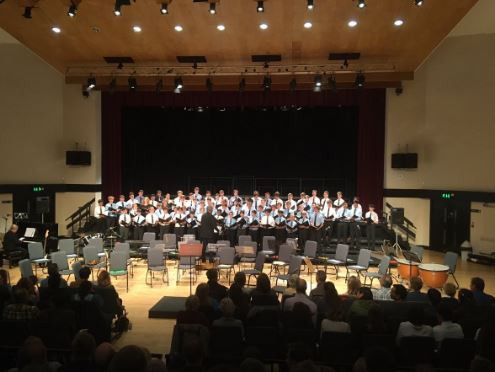
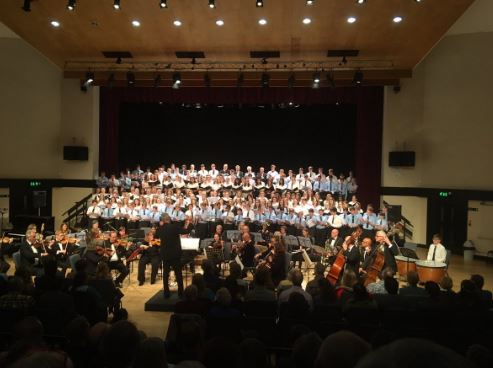
I will finish this ‘letter’, as I should, by talking briefly about Saturday’s Joint Choral Concert at the City Hall. It was superb, as ever, with musical maestros Poppleton, Fay, Hind and Timperley creating a wonderful event, and the SWGS girls and BWS boys performing superbly in their hundreds. This year was particularly special, as it was Libby Poppleton’s last Choral Concert for SWGS; she retires this year after around 18 years as Director of Music at Stratford Road. Thank you for all that you have done Libby – you’re an absolute star!
SDS
As I write a copy of this year’s school magazine lies on my desk at home beside the keyboard, with Dan Parsons’ and Sam James’ splendid artwork gracing the front cover. It’s not just the front of the publication that is good however – there are 96 pages of full colour to engage the reader with articles from across the full spectrum of school life. Stories of success spill easily from the leaves, creativity rubs shoulders with objective views and informed discussion vies for attention with captivating images. This year’s edition is an absolute credit to Curtis Leung and his editorial team, and though I met fairly regularly with him I can claim absolutely none of the credit whatsoever. Wordsworth 2019 is a student-led, student finished creation, and this one establishes the model for the years to come. This year we have a great debt of gratitude to Penny Calvert for her design and ICT expertise which was absolutely vital to the success of the production.

An important part of a project like this is finance. Under the old model, the school magazine had a print run of 500, a cover price (to everyone) of £5 and typical sales of around 275, usually in and around the Founder’s Day Fete of years gone by. The net result – half of the magazines unsold and consigned to the archives, a very limited circulation and a substantial annual deficit. With the move of Founder’s Day to April and (now) onto a school day, sales at a fete are no longer possible and so with the help of Luke Wordley (BWS Foundation Trustee), the editorial team went out to parents and local businesses for advertising revenue. Greater success than in the past was due to the generosity of the advertisers, their willingness to get involved and (of course) an expanded print run of 1500 which means a much higher profile. You should be glimpsing copies of Wordsworth 2019 in local surgeries, coffee shops etc soon, and I am sure that there will be copies strewn across coffee tables throughout South Wiltshire and West Hampshire after every BWS boy transported his free copy homeward on Friday. Advertisers take heed – if you missed the opportunity to get copy space this time around, then make a note to hit the pages in spring next year…
So the business planning of the school magazine is an exercise in logistics, organisation, prioritisation and execution. The artistic and creative standards are very high, and there is lots and lots of evidence of what the boys are organising and doing in school – clubs, societies, competitions, plays, music, sports and so on. There is a vibrancy and life there that is undeniable, and (most pleasing of all) there was a huge amount of pleasure to be had seeing the vast majority of the boys, big and small, reading THEIR magazine first thing in the morning on Founder’s Day. That’s how the school magazine should be, and that is how it will be in the future.
SDS
The end of term assembly at the close of the Spring Term is always slightly intimidating. No matter how much I try to avoid a landslide of awards all arriving at the same time, those awards always seem to happen, and this year the assembly pattern had been interrupted for the first time by Year 10 exams. With the Sports Hall the preserve of invigilators and candidates for a week before the end of term there was no way to break the log jam; I suspected that the gongs would pile up and they did just that, so that on the final morning I was confronted by a wall of ties, an archive of certificates and a truckload of chocolate. The challenge has been laid down – could I get through it all and yet not make the assembly become a rather lethargic procession? The short answer is yes, it is possible, but only by cheating! I will be dealing with Maths Challenge and Chemistry Olympiad Certificates on the first assembly back but the prefect teams have been named, the House competition has been sorted and the House Music commendations went out. Deal with the immediate and delay the rest. It happened, and the rest is history I guess, writing as I am at the end of a very pleasant Easter Break.
We are now on the last lap of the academic year, and it looks like a short one too. This week Founder’s Day will take place on Friday at 11.30am in the Cathedral, the first time that it has been on a week day for many years. My hope is that the avoidance of Saturday will simplify domestic life for many families, avoid clashes with work commitments and will also mean that staff do not have to suffer a condensed weekend where Monday arrives all too soon and work pressure is amplified. Bank Holiday Monday is only in the middle distance, and the proximity of exam leave for Years 11-13 gives a real feeling of an adrenaline-fuelled rush into the summer. My hope is that the boys (and girls) have appreciated just how condensed the coming period of study is too, and that their period of prep has gone well. I wish them all the luck in the World.
As the cliché goes, Keep Calm and Carry On – you’re on the final lap.

SDS
…that was what took place in the BWS Sports Hall through the day on Friday last week, as the House Music Festival was in full swing with a tidal audience of hundreds who flowed in and out as the double periods passed. It was all great fun – from the unpredictability of the Open Category to the slightly nerve-wracking solo performance from the smallest Year 7 boys. You’d expect the audience to be hyper critical, perhaps cynically so given their age and the stereotypical mind-set that the older generations sometimes create for them. None of it. I think that there was the realisation and common acceptance of just how much bravery is needed to play a double bass solo in front of hundreds of your peers. With realisation and acceptance comes empathy and appreciation. I really did not feel, in that hall, that anyone was expecting or anticipating failure, and as a result everyone emerged from the experience in a good frame of mind – including me and a visiting Head from another school.

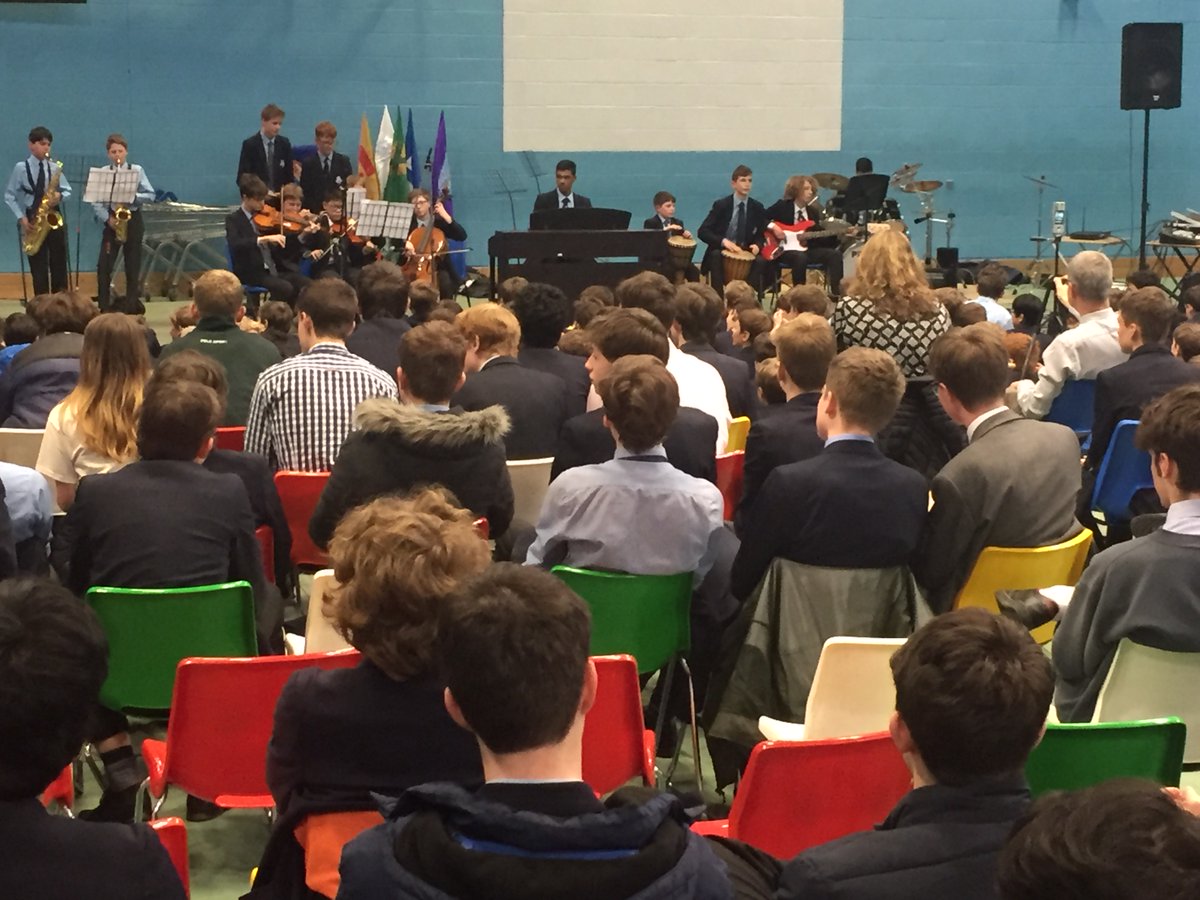
Of course I had seen some of those very musicians the previous evening during the Spring Concert at St Martin’s. This event always has a slight bitter-sweet feeling to it, as Chris Fay reminded us all that the Year 13 boys who were performing were probably doing so for the final time in their 7 years as Bishop’s Boys. Indeed I remembered some of them from Year 7 and had seen their instruments grow to match their physiology across the years. The music was wonderful (as I said in my customary intra-concert tweet), and like the happy parents sat in the pews I felt huge pride in seeing what our Music Department had helped to flourish yet again this year. A job truly well done by everyone.
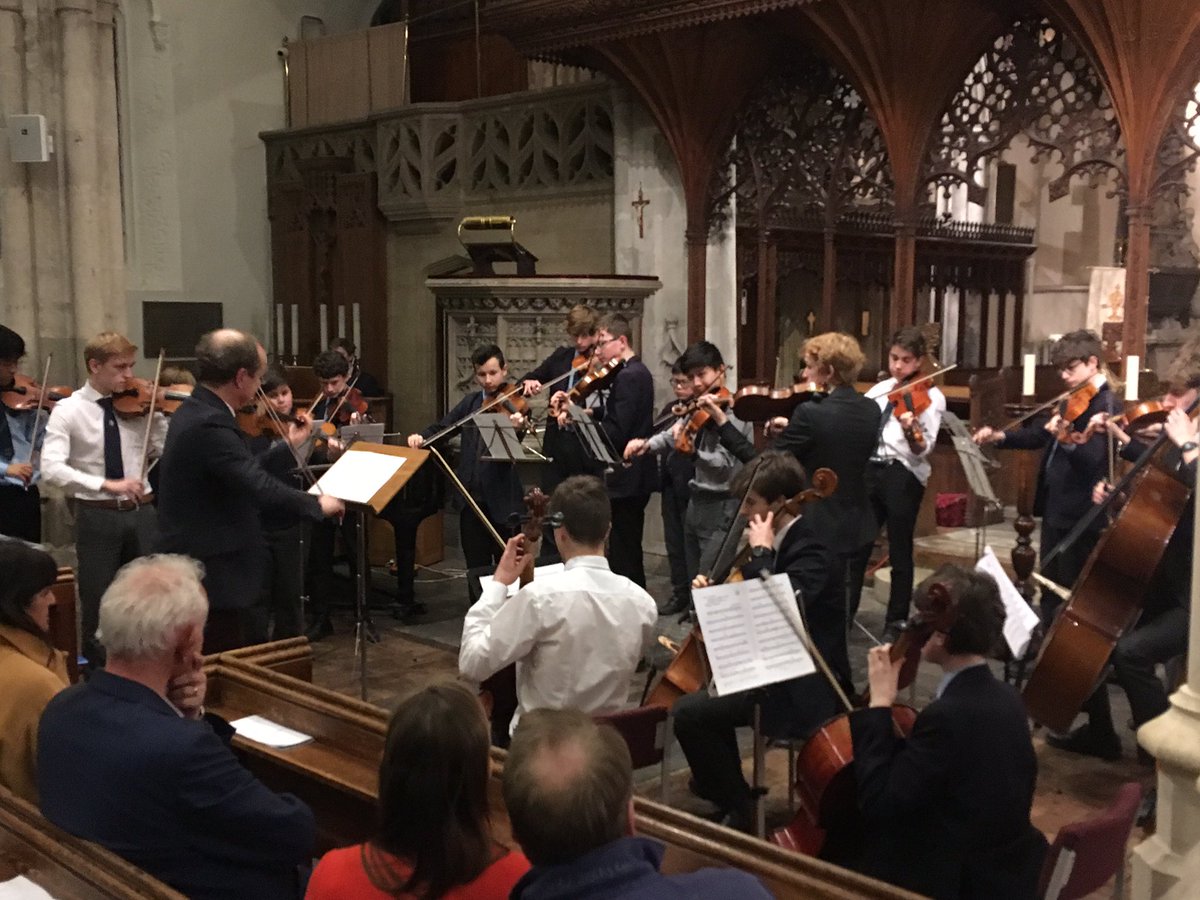
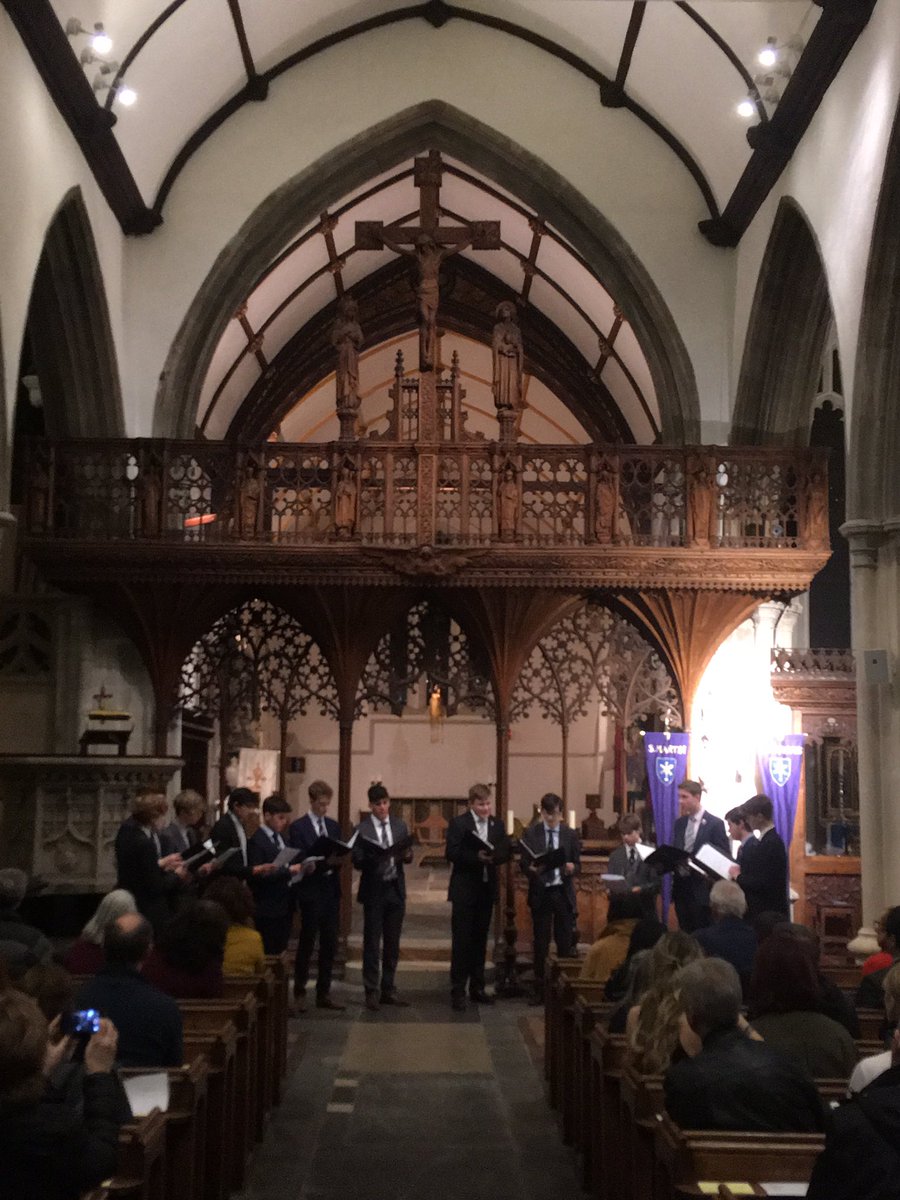
In my whole school assembly earlier in the week I had chosen a Ted Hughes poem to explore, thereby highlighting the purely conceptual and unmeasurable in education. Thursday evening and Friday may not have had Hughes’ powers of imagination and imagery but even so that music making by school boys across the age range brought together some really important aspects of holistic educational experience. Ideas, thoughts, feelings and emotions give power and colour to school existence, and the memories that are thus created will last and last. What seemed at the time like musical diversions actually represented something much more fundamental in the life of Bishop’s.
SDS
Last week’s ‘#FridaysforFuture’ protest put schools in a really difficult position. I don’t know of any Head – or any teacher for that matter who doesn’t care about the changes that human kind is inflicting on the environment and the global climate, and there are very few among us who are not shocked when we hear of the rate of disappearance of species from the planet due to habitat loss. Thus there is a considerable well of support for Greta Thunberg’s campaign, understanding of the hugely important issues at stake and empathy with the movement’s aims. But – and it is a considerable but – schools (and parents for that matter) have a duty to ensure that youngsters are educated. There is very little discretion given to Heads to ‘turn a blind eye’ as one of my well-meaning correspondents put it. I cannot simply ignore the request for young people to be absent for a part of every Friday from school, and my reasons for non-compliance have a firm educational and legal basis rather than enlisting more dubious or tenuous reasons. I have a job to do with clear responsibilities and accountability to boot. I cannot just turn my back and pretend that it’s not happening, nor do I want to. I would much rather give my full support to an initiative that refocuses our political class away from the current Brexit-obsessed infighting and gets them engaged with longer-term, more fundamental issues but doesn’t carry an educational price tag..

There is absolutely no doubt that our boys care, and care passionately too. There were some of the BWS Sixth Form present at Friday’s demonstration outside the Guildhall which I entirely expected. BWS boys have plenty of opportunities to engage with environmental issues during the course of the school day both inside and outside the curriculum. Do we give them enough information and chances for informed debate? Probably not, but it is not for lack of trying. In lessons, in Sciences and Geography in particular but elsewhere too we cover pollution, environmental destruction, climate change, species loss, habitat destruction, waste management and global stewardship. We have very significant numbers of visiting speakers who frequently touch on environmental issues as part of the brief, assemblies also often look at matters relating to human impact on the environment of our planet – whether that is on the very small scale or with a much broader focus. The boys get plenty of chances to engage with politicians and our debating and public speaking teams get stuck into political issues without fear or favour, irrespective of the age group concerned. Recycling is a fact of life at the request of the School Councils. Life in school has a strong environmental dimension, as we have spent very considerable sums on solar panels, on improving the energy efficiency of our lighting and improving insulation. All of our new buildings (of which there are quite a few!) meet very stringent energy regulations as you would expect. In short we have done a lot – but we can always do more.
SDS
I am sure that many of the boys, and staff too perhaps, almost forget that the Cathedral Spire is there. Understandable when morning mist cloaks the Cathedral from view or when busy lives draw the gaze to work desks or friends, less so when skies are clear and the sun or floodlights brings St Mary’s into sharp relief. When the light is right the true splendour of the 14th century engineering is a simply extraordinary sight from BWS. How could anyone ever take that for granted?

I found myself wondering precisely that as I stood in the garden of No11 on the Thursday before half term. The stream of excitable boys flowing onto the pavements of Exeter Street had ebbed and the site was quiet – so quiet in fact that I was easily able to catch the sound of two peregrines who had recently arrived to take up residence on the lid of the Cathedral. This was not the customary banshee-like screaming of Britain’s largest falcon, but more of an insignificant cheeping as the birds gently chided one another from adjacent minarets. The absence of screaming didn’t last long however, as when both birds became airborne they also become vocal, and as the aerobatics became more impressive their voices joined in echoing dissonance above The Close. The falcons’ spiralling flight path took them around the spire, with the radius of travel increasing steadily until they were both scything the sky above the school. A truly wonderful. memorable sight.

I am sure that there will be a significant number of Bishop Boys who are every bit as keen on ornithology as I am, and I reminded them to keep a careful watch on the spire when I spoke in assembly on Tuesday. They will know, as I do, that peregrines are more usually found in Britain’s wilder places – the mountains, the moorland, the rocky coastlines and the coastal marshes – the hunting grounds for the most efficient avian predator in the British Isles. At least, that’s how it was up until about 20 years ago when peregrines started to come back from the very brink of extinction. Since then I have watched them in London (on skyscrapers and the Bank Power Station), in Liverpool (on the Anglican Cathedral), in Birmingham (on the University Bell Tower), in Winchester and Chichester and elsewhere. The urban peregrine has become a stunning symbol of how human activity can cause the fall, and rise, of the pulse of nature.
And so it is in Salisbury. Successive generations of birds have visited, roosted, hunted and raised young at the very heart of our Cathedral City, and the only complaints about that would I suspect come from the local population of pigeons and ducks. At ground level we can stand and stare, taking in a grandstand view of one of the most spectacular birds in the World. The other bird species may not share that perspective entirely!
SDS
OK, please forgive the dreadful pun but it was simply irresistible given the closure on Friday!
BWS joined many other educational establishments county-wide in accepting the inevitability of having to close the gates to all comers shortly after the scheduled start to the school day. Of course it wasn’t supposed to be that way, as the snow that was forecast came in late and somewhat unpredictably. When I arrived at around 0730 there was a heavy dusting on the site but it was manageable, but shortly afterwards the flakes started to appear in earnest and news of travel disruption affecting staff also began to arrive just as quickly and every bit as seriously. It quickly became clear that the operation of the school was not going to be a viable option, and so at just after 0900 I took the pragmatic decision to close – conscious that if it was left any longer then there would be many who would have started long and potentially risky journeys. That will, I am sure, have still happened for some, but I suspect not too many.
If that was you please accept my apologies, and I hope you can appreciate the predicament that all Heads have to face when an Easterly air flow collides with mid Atlantic air over Salisbury. I also hope that the various means of communication worked for you. Though technological advances and changes in society have probably made us all more risk-averse, the improvements in issuing information through digital means has transformed the effectiveness of decision making beyond all recognition in the last decade. This time information was relayed via the website, twitter, Insight and email and also through the Spire FM website too within minutes of the closure being decided.
You never quite know how systems will operate in an emergency; this time they seem to have been fit for purpose, enabling the sledges to be employed on Laverstock Hill, Gomeldon and Hudson’s Field at the earliest possibly opportunity!
SDS
Last week, some statistics emerged into the daylight from the dark corners of the Department for Education. ‘Progress 8’ figures for GCSE revealed BWS as ‘above average’, whatever that may mean, whereas at A level we came out on the wrong side of average (albeit a very small negative figure). What am I, my teachers and the boys to make of that? I’m really not sure but be reassured that I will not be celebrating the GCSE number, and neither will I be lying awake at night wondering what to do to get A level back on track. As Kipling advised I will treat both imposters in the same way and simply carry on working hard to make things as good as they possibly can be for all of our boys.
Having said that the ‘below average’ labelling does get my goat. Which particular part of the school’s performance does this label best apply to I wonder? The number purports to apply to academic performance so were the 74.6% A*-B grades at A level last summer somehow ‘below average’? If not, perhaps the 10 boys who gained Oxbridge places - or the 60% who gained Russell Group University entry – or the year group who all got their first choice HE places deserves the accolade? Perhaps not. Maybe, then, it was the record-breaking Olympiad and Challenge results in Maths, Chemistry, Physics and Biology? No? Then it may have been the Debating and Public Speaking Teams which competed yet again at National Finals level, or perhaps the sports teams which continue to compete with the very best (and win) at regional and national level? Still not sure? Try then the very large numbers of boys gaining their music qualifications, or the orchestras and music groups, or the spectacular and very large choir? Or possibly the boys who gained competitive Arkwright Scholarships, or the large number of boys who study and master Mandarin Chinese, or the actors in ‘The Thirty Nine Steps’, or maybe the sixth formers who organise the Politics and History Societies. It could even be the boys who took part in the Holocaust Memorial Event at St Thomas’ Church this last Sunday. Who knows?
I hope that you will understand why I treat such statistics with the scepticism they deserve. I am all for measuring school performance and holding public servants to account, but my view of such manufactured numbers is (and always has been) wholly critical, whichever way they fall. That is why I have been a defender of other local schools who have fallen foul of the DfE assassin around this time of year. Stick to numbers that make sense and are straightforward and easy to understand. The more data processing that goes on, the further the numbers get from reality – and the more risk of being misled. Not everyone will agree, but I remember using the same argument in Prize Giving speeches in the early 2000’s. Nothing has changed – methodology makes no difference to the principles of the argument. I suppose that I will just have to get on with running my ‘below average’ school; I can assure you that there’s no place I’d rather work…!
SDS
Tuesday each week at BWS sees what I would imagine is the apotheosis of terror for most right-thinking adults; the Sports Hall is completely full of teenage boys, in serried ranks from front to back, almost 1,000 of them. I’m not naïve enough to suppose that they are all keenly anticipating the assembly, but I am fairly sure that the majority of them would appreciate the importance of that Tuesday morning slot. There is no other point in the week where everyone is together to receive the same messages. Corporate identity, understanding, shared values and common purpose flow from those 20 minute slots.

This week the message that I will focus on will be partly rooted in the past as Holocaust Memorial Day falls on Sunday. The BWS Assembly will be my chance to refresh the sense of reality around perhaps the greatest human tragedy of the twentieth century and also try to re-establish the relevance of the events for us when relative peace has been the rule rather than the exception for Western society for so many decades. After all, the days when Holocaust Survivors were visitors to school are now almost past and even the Kinder Transport children are now mostly in their 10th decade of life. The age of the direct eye witness, the compelling first-hand account is gone. We now all have to learn from recorded details.
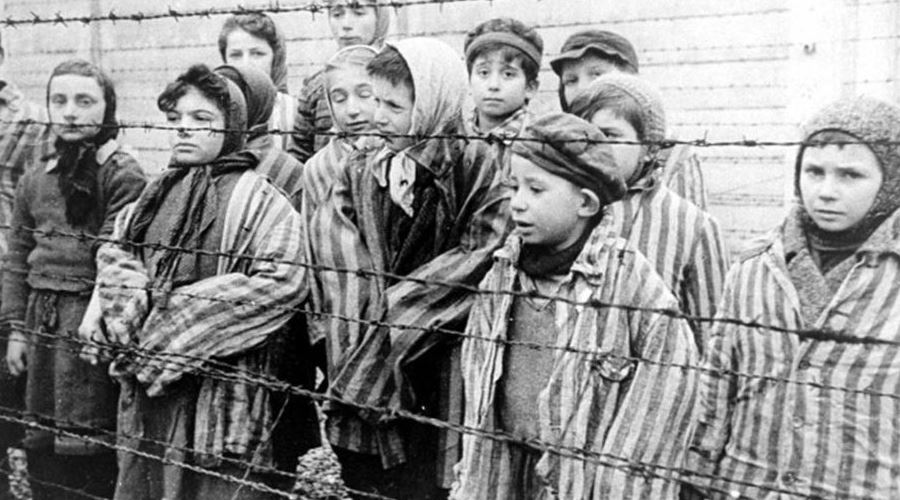
That is more difficult. History books, no matter how brilliantly written, are just books, Digital materials, for all of their remastering and capacity for communication are still remote. It is only by reducing stories to a human scale and drawing parallels with contemporary events that history can be given true colour and relevance. The tales of individuals caught in the rip tides of history, whether that is in Sobibor or Sudan, get that critical meaning across whatever age the audience. Tuesday morning will be about routines in school, for sure, but it will also focus in on fundamental human values and the danger for a fractured society where tolerance comes under threat.
SDS
The following was my reading delivered to the entire school during the first assembly of 2019
"What do you want to get out of this, the 20th year of the 21st Century AD? Now that you’ve overcome the slight feeling of intimidation, the self-imposed lethargy and the perhaps rather unwelcome return of the weekly routine, what was in your mind as you came through the gates to the car park this morning? Meeting up with mates perhaps, comparing notes on holiday travels, Christmas gifts and whether the relatives were embarrassing or not (or perhaps how embarrassing they were)? Comparing notes also on what was in (and what was not in) your end of term report. We’ve all been there – staff included – so we all know that feeling only too well.
The other matter that is often on the radar in the new year, every year, is what each of us is going to do to try to improve life. Making a New Year Resolution is something that most of us try every January, sometimes to very little effect. The graph projected on the wall behind me shows data generated by the downloading of a fitness app for mobile devices. I can give you the figures – on the vertical scale the range is from zero to 400,000 downloads. The horizontal scale is time in years, with every New Year clearly marked by a sharp peak where frequency of downloading at least doubles. Now – I’d like to think that every one of these January installations on a mobile phone resulted in a fresh fitness regime, lowering the incidence of obesity and type 2 diabetes. Sadly that view would be naïve in the extreme. At the very same time as all those apps were downloaded we all got just a little more unhealthy, a little more mobile-obsessed and my guess is that many of those healthy intentions at the dawn of January were quickly frozen by the rigours of work and winter weather. It’s hard to keep it going as we all know – to be single minded in the face of temptation, to show determination and persistence even when barriers get in the way or the pressure is on.

So – two questions for you to mull over this morning. Firstly – inevitably – what can you aim to do to make your life (and other peoples’ existences) happier and more fulfilled? We are all here to do business after all, but it is important that you think about what happens outside lessons too. How can you get more organised, fitter and perhaps fill some of your time with things that are not digitally-focused. I will have more to say on that count later this week. What can you – personally – do to make things in school – or at home – better for everyone? And then, when you have decided, how can you avoid being one of the many who then fall into the annual post new-year trap. How, in other words, do you sustain the change rather than just being one part of the predictable statistical downhill slope. That is for you to decide and then to follow through with.
Whatever your New Year resolutions may be, I wish you the very best of luck with this brand new Spring Term."
SDS
To Godolphin Carol Service on Friday last, straight from covering a Year 8 Science practical lesson. The contrast was quite surreal, with the two experiences separated by a mere five minute walk in blustery drizzle on the diagonal path across the North Lawn of The Close. Inside, the Cathedral felt mercifully warm, the music was wonderful from all of the girls and the words suitably seasonal. The afternoon was made particularly memorable for me by the choice of some Betjeman as a reading – ‘Christmas’, appropriately enough, written in the 1950s by the Poet Laureate to contrast the everyday customs of the twentieth century with the timeless message of Advent and the Nativity. The ideal way to start a Christmas Season, and one of my favourites. I have used it frequently in assemblies towards the end of the calendar year and also in the BWS Carol Service. I know it well – and love it well too.
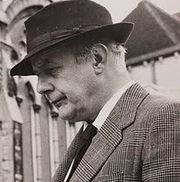
Betjeman was, of course, a creature of his time, railing against the ubiquity and uniformity imposed by the tides of change after the war and I think that you can sense that in the poem. There is a feeling of nostalgia, of harking back to the days when people had strong local roots and Christmas traditions remained unquestioned in a far less secular society. I found myself half listening to those evocative words from the first verse yet looking towards those colours of the stained glass that are picked out by the poem and then streaked by the rain as I watched. That much remains unchanged; the ebb and flow of humanity through Great St Mary’s, looking for hope, wishing goodwill, joining together in prayer and sharing the warmth of the season. And yet the poem is also something of a prisoner to its time and place as it ranges across the social divide in London and further afield. Betjeman understood, only too well, the tidal forces that were already affecting society and have grown so acute today. But all of that then pales into insignificance in his parting phrases as he points out that though we have a lot to concern us all and we tend to be occupied with the trivial, day to day-isms of Christmas it is the underlying message and meaning that matters. He leaves us all with the biggest question of all, the question that lies at the very heart of what it means to be a member of the Christian Faith.
Nowadays John Betjeman stands, on his own, at St Pancras Station with his gaze directed heavenward, craning his neck to look at some of the pigeon-haunted classic towers. His bronze figure is in a place of honour all alone, but one of the things that he did do through his poetry is give a clear picture of people together in a society that was changing after the trauma of war. The changes that he wrote about are still evolving now, and the World is probably more troubled than when he depicted Christmas in his lyrical masterpiece, but even so I think that he would still have hope. Christmas is still alive, still means a lot to families and friends, and encourages us all to think of those who are in difficulty greater than our own. Hope lives on and was restated in the Bishop’s Carol Concert that was held on Monday evening.
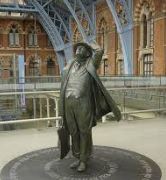
Whatever plans you have for the coming holiday I hope that you have a lovely time, survive the re-gathering of the clan and emerge in fine fettle.
SDS
About 10 years ago Phil Copley (ex BWS Head of Science) and I had a conversation about what the Institute of Mechanical Engineers could offer to schools in the Salisbury Area. Phil had a contact in the IMechE who had evidently suggested that together we should breath life back into the annual schools’ lecture, making it an event in the late autumn each year to coincide with the Arnold Barks Lecture. I was immediately interested; the number of boys studying Maths and Science at Bishop’s made this a natural fit, and then, as now, Engineering is habitually the most popular choice of HE course for our leavers. The rest is well-established history (for BWS, IMechE and IET), and something that is an absolute pleasure to help promote. Phil, and now his successor Emma Baker, have each done a superb job in sorting the logistics and inviting other schools – and just look at some of the talks that we have had; the Landrover Super Yacht, Bloodhound SSC, an F1 Racing Team, Aurorae and so it goes on. Wonderful, inspirational ideas, the very cutting edge of Engineering being brought to Salisbury to present to young and not-so-young engineers.
2018 was no exception. Richard Browning, founder of Gravity Industries came to talk about the realisation of his dream – a personal jet suit that enables the user to fly, with their body forming an airframe and the thrust being provided by scaled-down kerosene jet engines. The talk was great and the boys were rapt throughout, before RB defied the drizzle and gave a demonstration next to the Cathedral. Reminiscent of Marvel’s Iron Man, Richard assaulted both the spectators’ ear drums and their visual senses in turn as he lifted off and then showed the suit’s controllability; if you have yet to look then find the relevant video on the Salisbury Journal website. You’ll see what I mean.


Of course the wow factor is one of the reasons for doing this, and that has been so every year. Just as important for me however is the idea that in that audience may have been the next Rolls Royce Engineer, the future BAE Defence designer, the Qinetiq flight technician or an embryonic entrepreneur. Who knows, one of those youngsters might now follow an engineering discipline who would not otherwise have made that choice. It’s a little like fishing as you never quite know what bites you are going to get, and some of these might take quite a while to grow to maturity. Short term excitement and long term development combined, making the potential payback significant. A man defying gravity is not something that comes along very often and when it does it lives on in the memory for a long time.
SDS
It must drive many parents to distraction. The new PE kit is bought an packed into the sports bag on the day that Games is due and then the bag fails to re-materialise for a couple of weeks. When it does, a PE Shirt is missing, as well as one boot and (almost certainly) at least one sock – and the contents of that same bag probably need fumigating before approach! I sympathise and, believe me, we do all that we can to get the left garments and belongings back to parents as soon as possible. One of my Tuesday morning jobs is to gather as much of the clothing etc of the that has been left around the site into the Sports Hall where it will be laid out at the front, reminiscent (both visually and sometimes pungently!) of a tide line. When the assembly is over the massed troop of boys file past, with occasional individual forays rescuing something from the jetsam. The system works tolerably well as most of the named kit and its owners are reunited; the rest makes its way to a deserving charity or, in the case of bespoke school uniform items, to the School Shop for resale.
This could turn into a nag, but it won’t, I promise. I sympathise with the lot of busy parents who love their son to bits but are ever so slightly frustrated by his devil-may-care attitude towards his belongings. Been there, done that, got the T-shirt (except, naturally enough I lost it somewhere!). I do remember the story about one father who arrived at the school shop to collect a new set of PE kit and, having paid for it put it straight in the lost property bin. “Might as well cut out the middle-man” he shrugged with some amusement but also a degree of defeat. And then, of course, there all that other stuff – keys, calculators, phones, fit bits, inhalers, mouth guards, watches, glasses, money, wallets, and so on. In assembly I occasionally make the links between these often rather valuable, untraceable and often unclaimed items by supposing they all belong to the same person. He lost his watch and so missed the bus but didn’t have the money for the fare and couldn’t phone for a lift, so he walked but got lost because he couldn’t see and when he finally got home he couldn’t open the front door without a key in any case. Whimsical in a way, but every one of those items stored in Reception represents time, energy and complication to someone. Every one of them has an owner. Every one of them could be claimed, but hasn’t been.

No nag then, just a plea to parents and boys who read this blog. A name makes an item of left property like a homing pigeon; it comes home to roost before long. An item lost will seldom be gone permanently unless it is unnamed and unclaimed, so boys need to check and then check again. Tuesdays are the clearing house of Planet Lost Property at BWS, but don’t leave it until Tuesday to go treasure hunting…if you’ve left it behind somewhere, whatever it is, it will be waiting for you…there are no borrowers at Bishop’s!
SDS
I heard just this afternoon that Fran Stratton, past Head of SWGS and a close colleague for 8 years has died at a hospice in Poole after a period of illness. In fact it had been some time since I had last seen her, as she rarely returned to Salisbury after retiring in 2011, but my memories of her are strong and enduring. I thought it appropriate that I should write a little about her to give a view which may not be replicated elsewhere, a view that (as Fran herself would almost certainly have wished) will be down to earth and with a somewhat humorous edge. That, after all, is what she was all about.
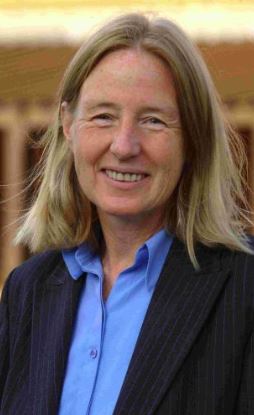
Fran arrived in Salisbury in 2003, shortly after I took up the Headship at Bishop’s. I first met her shortly after she arrived as she had sailed down to The Close determined to meet the Head of ‘the other place’ down in town. My first impressions were not unfavourable but also were tinged with some doubts. Evidently this was (to quote Maggie Thatcher) a person I could do business with, though she made it pretty clear that she placed little value on the more traditional side of the BWS Brand. So be it, I thought, and in any case another Geologist as a Head in Salisbury could not be anything other than good. That latter conclusion proved accurate; effectively she started the joint department across the two schools by teaching a couple of A level students out-of-hours in that first year, and then I joined from September 2004. Just five years later we were jointly leading the largest school sixth form Geology Department in the country, with well over 100 AS and A level students on roll. That growth was down to effective marketing at both ends, a modicum of effective teaching (especially by Fran!) and outstandingly strong results – so strong in fact that we were jointly awarded the National Schools’ Geology Prize by the Geological Society of London. I take only a small amount of credit for that; most of the success was down to Fran’s energy and drive, her exam board expertise, her resources and her sheer hard work. She was, in that respect, quite extraordinary.
I watched the impact of her work at SWGS with interest. Her approach was systematic, determined and indefatigable throughout. Fran was unrelenting, focusing on standards in exam results and elsewhere, improving the quality and breadth of girls’ university aspirations, adopting data-driven improvement strategies and rebuilding ferociously. Whilst I admired her successes and the quality of academic outcomes that pushed her school towards the top of the tree, she and I did not share an educational philosophy. No matter – it was her school, and generations of girls have her to thank for years of simply stellar outcomes, outcomes that she was delighted to share every August with them. And it was here that she was also at her best, caring for the individuals who had not met their aspirations as well as those who had reached for the stars and got there.
The cliché goes that ‘what you see is what you get’. That, surely, was Fran to the tee. Firing from the hip quite often, full of ideas, confident of her own solutions and most of the time being proved right. At times I went out of my way to exploit her self-confessed lack of literary depth but she always saw the funny side of even my most crass and ill-judged sense of humour! Ultimately, she got things done, she made a difference to the lives of masses of young people and, for 8 rather wonderful years while she was in Salisbury she was a colleague and a friend.
She will be sadly missed.
SDS
We are at the stage in the school year where students in Year 11 are starting to consider seriously where their futures may lie. It’s one of those moments in life where one emerges from a tunnel and suddenly there are a bewildering number of options to choose from, each offering something different and every one going in a subtly different direction. For schools and colleges it is a time to show off, to explain strengths, to highlight exam results and to outline opportunities. For both providers and consumers the stakes are fairly high and yet the chemistry needs to be right, as there is nothing worse than seeing a boy or girl who has made a less-than- optimum choice for the following two years. Fortunately (in my experience) this is fairly rare, but it still does happen.
Bishop’s Open Evening for prospective Year 12 joiners was last Thursday; it was pleasingly crowded and there was a real buzz about the school as parents and boys (yes, just boys this year!) migrated around the site to talk to staff from the academic departments and (most importantly) students who are already enrolled and in lessons. It really is a chance to shine and I thought that the school emerged from the event in fine fettle; the same will have been so at every other post-16 provider in the city. What is certainly true is that boys and girls in Year 11 have a stronger and more diverse local choice that ever before, and the days of having to travel great distances to access a range of course sixth form providers are consigned to the past.
At the BWS Open Evening I try to be as open handed as possible with the 400 or so parents and boys, giving them right at the start three key questions to consider when they make their choice.
Firstly, school or college? There are arguments in favour of each of course, and it really depends upon what the student wants their day-to-day existence to be like. Freedom or structure, pastoral support or greater self-reliance and determination?
Secondly, academic or vocational (or perhaps a mixture of both)? This tends to be a bit of an easier decision, as it will be informed by prior progress, though some students can accelerate through Year 11 more quickly and successfully than their teachers expect of course.
Finally, what lies beyond lessons, what opportunities will there be for sports, music, arts, culture, trips and expeditions, leadership, team competitions, enrichment and so on? This is about self-fulfilment and character education at a vital stage in a youngster’s learning journey.
Get the answers to those three questions right and the course will be set for success – wherever that course may be heading…
SDS
Friday’s appalling, monsoon-like downpour and squally gusts were not sufficient to put off a capacity audience from travelling to the Studio Theatre to experience Mel Gordon’s latest production, John Buchan’s ‘The 39 Steps’. It was emphatically worth braving the weather for the event, which was excellent value from start to finish. Rufus Shire’s Hannay was excellent, a study in insouciance and occasional vanity beset by a formidable range of problems. Amber Thomas was a most capable foil, and the flow of character actors across the stage accompanied by their improbable accents kept us all entertained for a very swift 90 minutes or so. The music was great, stage direction masterly and, most important of all, it was absolutely obvious that the cast were enjoying themselves every bit as much as the audience. A job very well done – so congratulations to everyone involved, and huge thanks to Mel Gordon for coping with the nervous tension, unpredictabilities and last minuteness that goes with this particular territory.
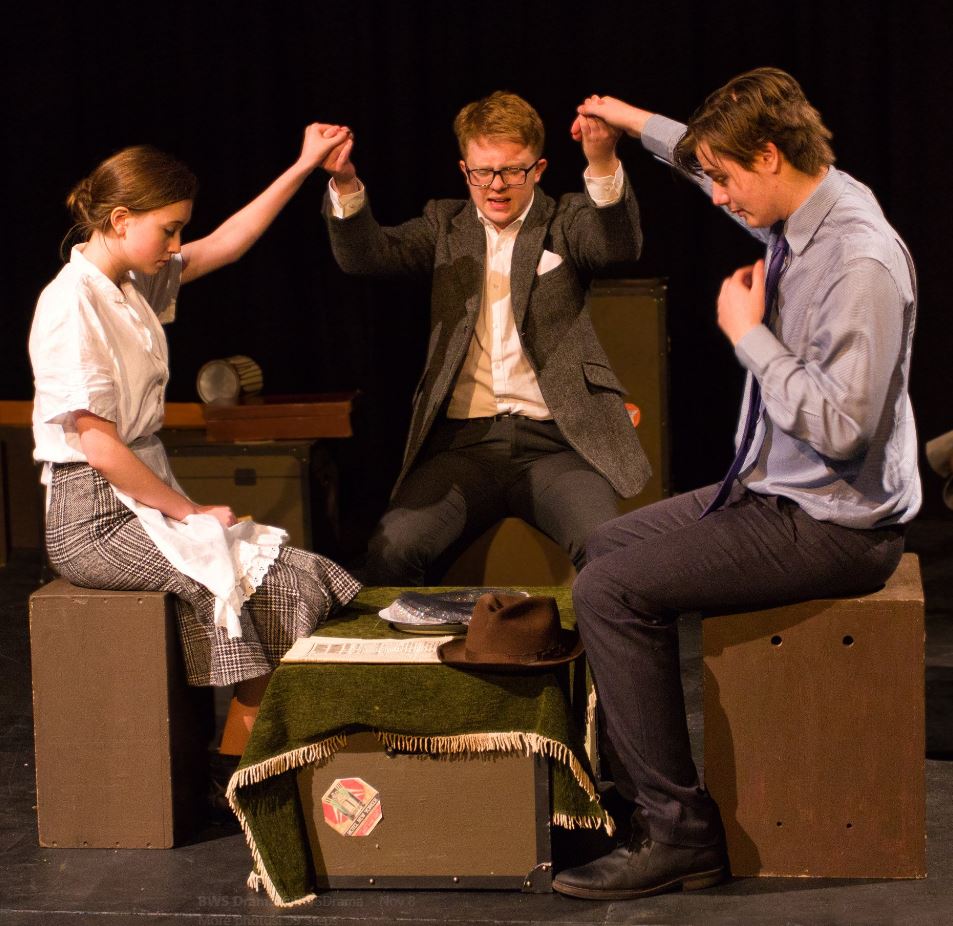
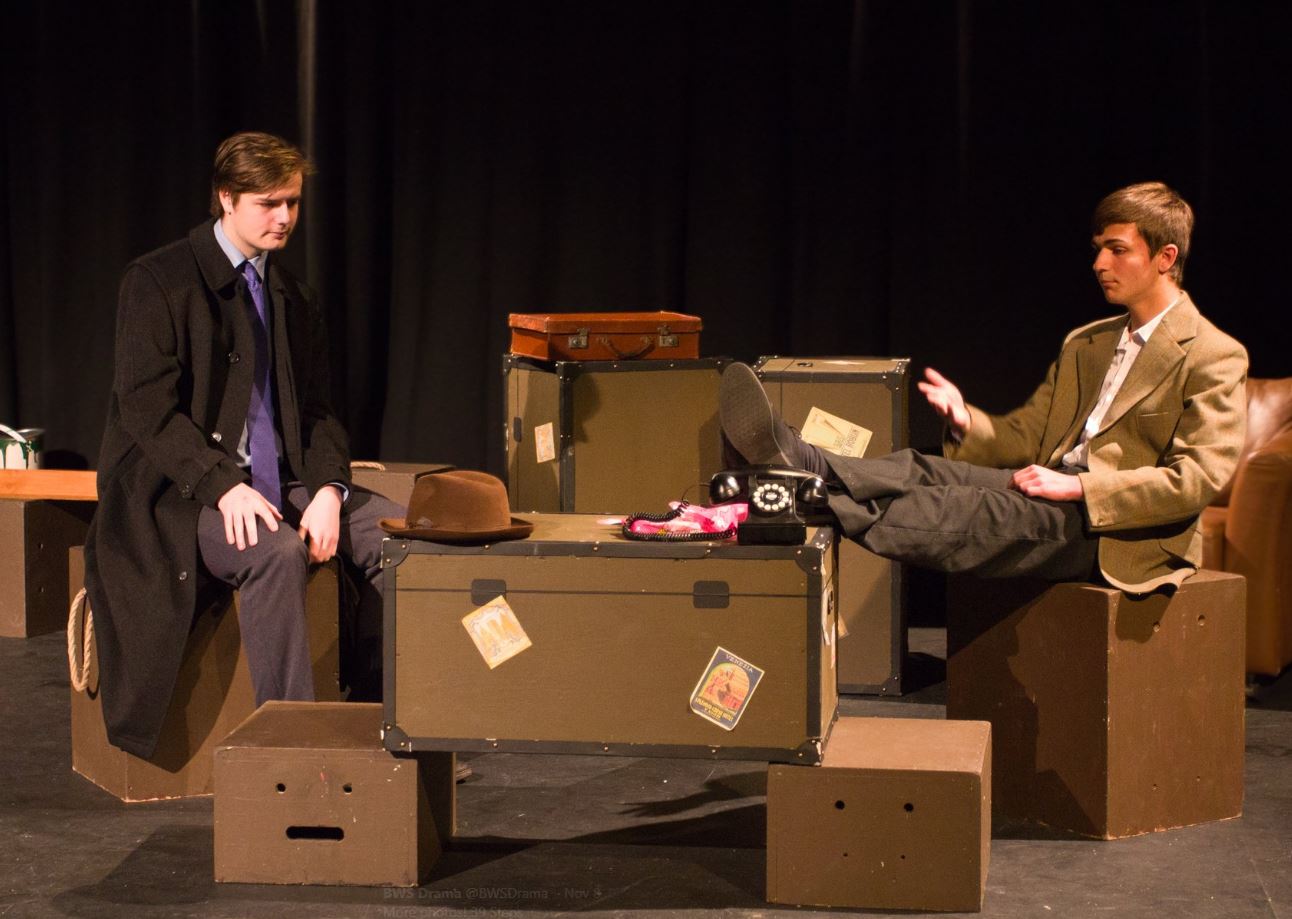
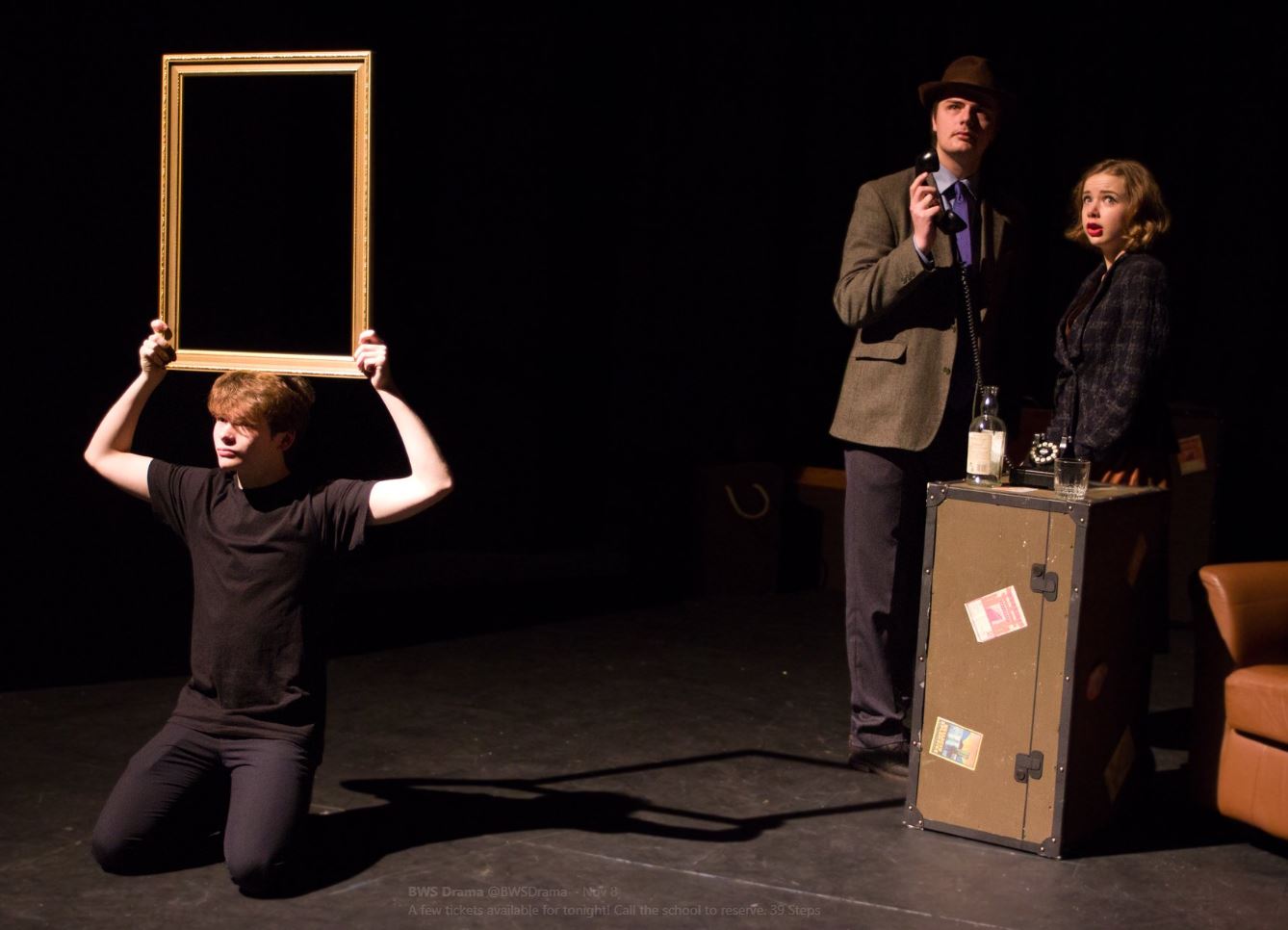
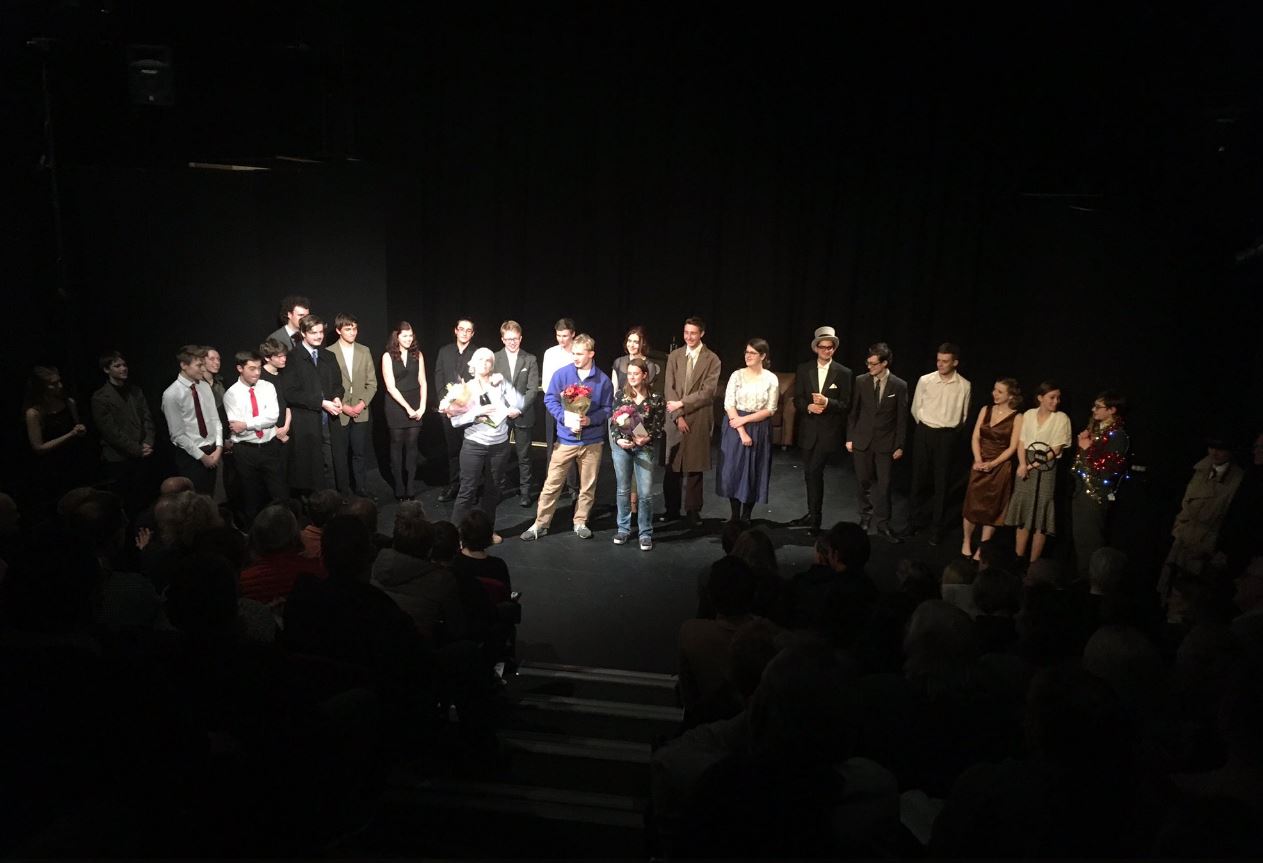
Unpredictability was, to some extent, the order of the day on Saturday when the weather also affected the block Rugby fixtures against Dauntsey’s. This fixture is always keenly awaited though, and when the matches did get under way the wait proved to be worthwhile – fiercely contested games with much pride at stake, but with sportsmanship to the fore. The 1st XV made up for their disappointing loss in the NatWest Cup during the week with a solid win, and all of the other games were hard fought and fair.
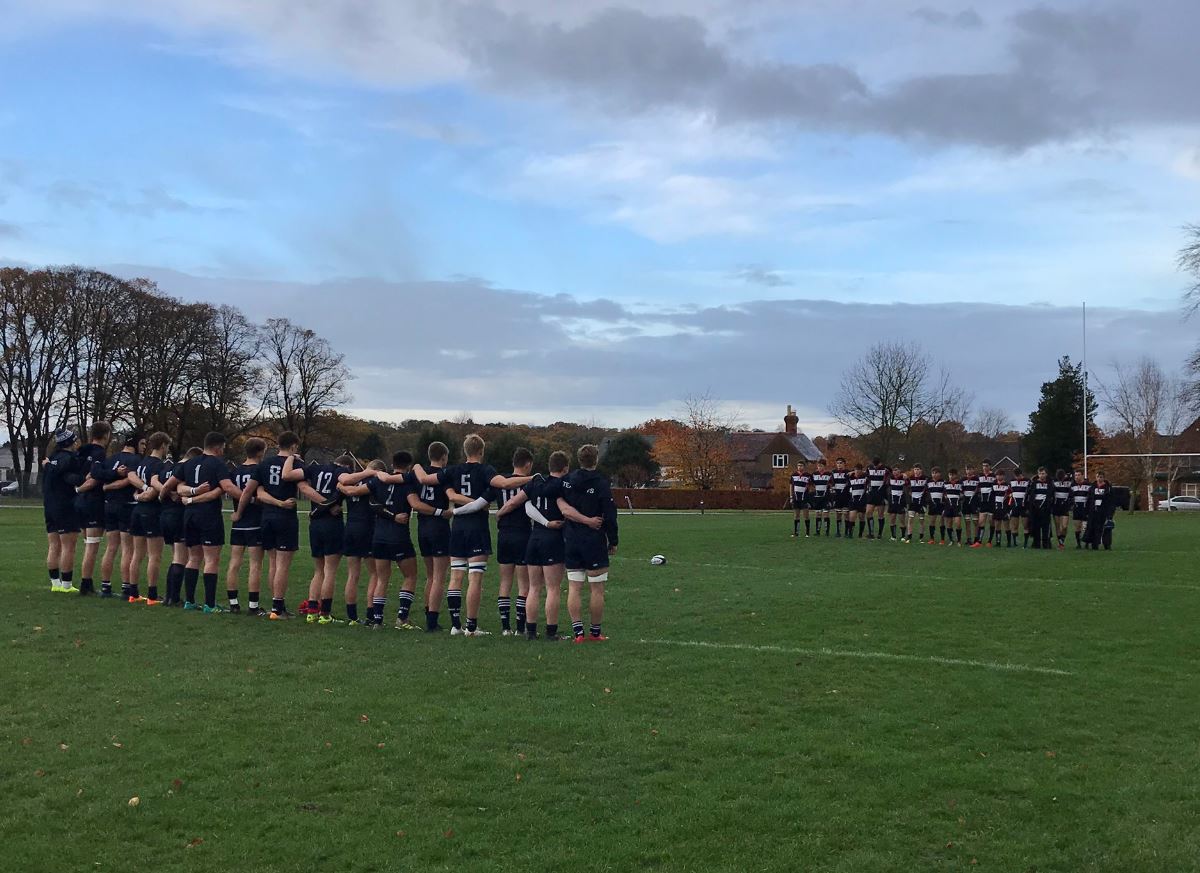
An excellent day, made possible by the Herculean efforts of Richard Demain-Griffiths and staff, together with a big team of helpers. Once again huge thanks are due all round for all who work to make these things happen; it’s so important that their efforts are not taken for granted…
SDS
As we grow ever closer to the centenary of the ending of the Great War, a number of different events have directed my thoughts back to those years early in the last century when the fields of Northern Europe and elsewhere were turned into charnel-houses of mud and humanity. Serendipity dictated that I should read ‘Birdsong’ for the first time this year, starting at the back end of the summer break and reaching the final pages just recently as the dark evenings began in earnest. Forget the film and Eddie Redmayne and go back to Sebastian Faulks’ masterpiece which alternates between the Western Front and a later relative’s search for identity and meaning. The language and construction is masterful as Faulks explores and lays bare the hitherto rarely described closeted existence of the trench miners, tunnelling their way to war and listening for their German counterparts, moles in a much bigger picture. The words of love expressed as Stephen Wraysford realises the grip that his home environment has on him and his senses is palpable, highlighting the poignancy of the losses that are happening around him. Prose doesn’t get much more powerful than this.
Twice, just recently, I have been contacted by families of boys lost in the great wars of the twentieth century. In both cases they were looking for more details to complete the picture of a forbear – a Bishop’s Boy in both cases, and in both cases too the boy’s name is engraved on a memorial scroll in the Chapel. This time the descriptive words are not needed, it’s just the fact that I was able to trace the career of the boy through the school rolls and magazines through to completion of the Upper Sixth, and then (in both cases) within a year they were gone. It’s very difficult for most of us to imagine that sense of loss.
And then, just this weekend, at the Ray Mac, the ground came to a complete standstill at 3pm in memory of those who lost their lives in the Leicester City helicopter crash. The same will surely happen again on 10 November, for National Remembrance; even in the brash, shallow and coarse world of Football people come to their senses when there is a higher calling. The silence was immaculately kept, and the same will I am sure be true again next Saturday.
This morning I caught the reading, by Ben Whishaw, of ‘Anthem for Doomed Youth’ on Radio 4. Wilfred Owen’s evocative and moving poem was written in 1918, probably shortly before he was killed on active duty a couple of days before the Armistice. The poem perfectly captures that profound loss that was felt by so many families a hundred years ago and since. Our job is to work to keep the memories alive, in and out of school.
SDS
Working on school development usually feels a little reminiscent of a caterpillar walking; progress is made quite rapidly in some areas but then there has to be a pause whilst the rest of the segments making up the body catch up. Try to go too fast and there can be consequences that are difficult or even potentially catastrophic, as groups within the corporate body become semi-detached or are even left behind entirely. That’s not good – and of course once the separation has happened you know that it will be a devil of a job to restore confidence, to re-attach and to make the body work once more as a coherent whole. In education/leadership-speak it’s called ‘carrying people with you’, and it is supposed to be the hallmark of successful change management.

So much for the mini MBA seminar, what about reality? Well, life in school (for me anyway!) feels very much like we are going through one of the moments where the front end of the caterpillar has made a couple of decisive forward movements and BWS is starting to change as a result. The decision taken, back in 2016, to grow the school by admitting 25% more boys into Year 7 is now really beginning to have an impact as our second group of 160 has settled down to life in the Cathedral Close. There is absolutely no doubt that the population density has risen in some parts of the site – I wonder what all of those small boys did in the past before they discovered such enthusiasm for table tennis – but also, reassuringly, the additional numbers are entirely manageable. Occasional conflict will always be a part of life in a boys’ school but it is good to see and hear very little evidence of any as I peruse the site every day on duty. Rain or shine, lots of busy (and noisy!) boys reading, chasing, eating, talking, playing, arguing, in short doing what they have always done when lessons are done and they tip out across the school yards.
The other part of the freshly animated caterpillar track is of course the intention to admit girls into the Sixth Form in due course. The news of the initiative now seems to have permeated far and wide (as I wanted it to) and, thus far, seems to have been received very well indeed. Everywhere I have gone in the past couple of weeks, whether on school business or not, one of the first questions in conversation has been ‘I hear that you are taking girls in the sixth’...? It may be of course that any who do not approve are not advertising their views, but all of the feedback that I have received so far has been entirely positive. Phrases such as ‘makes good sense’, ‘good news that there will be more choice’ and even ‘I thought it was co-educational anyway’ have surfaced which is very welcome. There will be more to follow and I welcome all of the comments both received and to come, as we want to try to make sure that we can offer something really special for boys and girls here. We can only do that if the pace of change is sufficient to keep everyone in step…
SDS
If you don’t have twitter and you don’t visit the BWS website then you’ll be missing out (and not just because you won’t be reading this!). A glance at the posts over the past seven days or so really does give you a good picture of just how busy this place is. A swift skate through the posts on the main school feed yields the following. The ‘Big, Fat Interhouse Quiz towards the end of the week saw the Dining Hall crowded with 11 teams of boys after school with general knowledge banks being tested to the limit in the organised mayhem that followed and Mr Endersby and the senior prefects both comparing & compering. Move on past the Macmillan Coffee Morning and we arrive at Politics Society, with both boys and girls engaging in discussion with Canon Guy Wilkinson. Who said young people were not interested in Brexit?
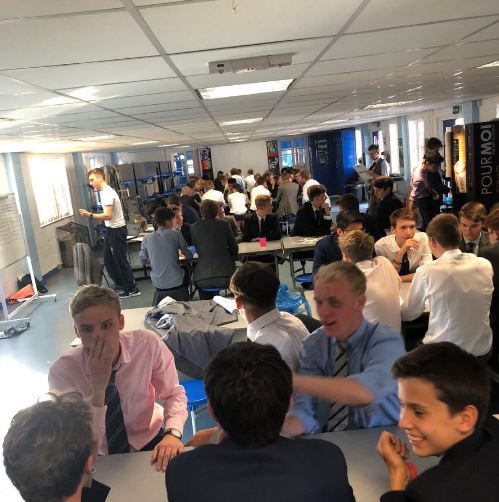
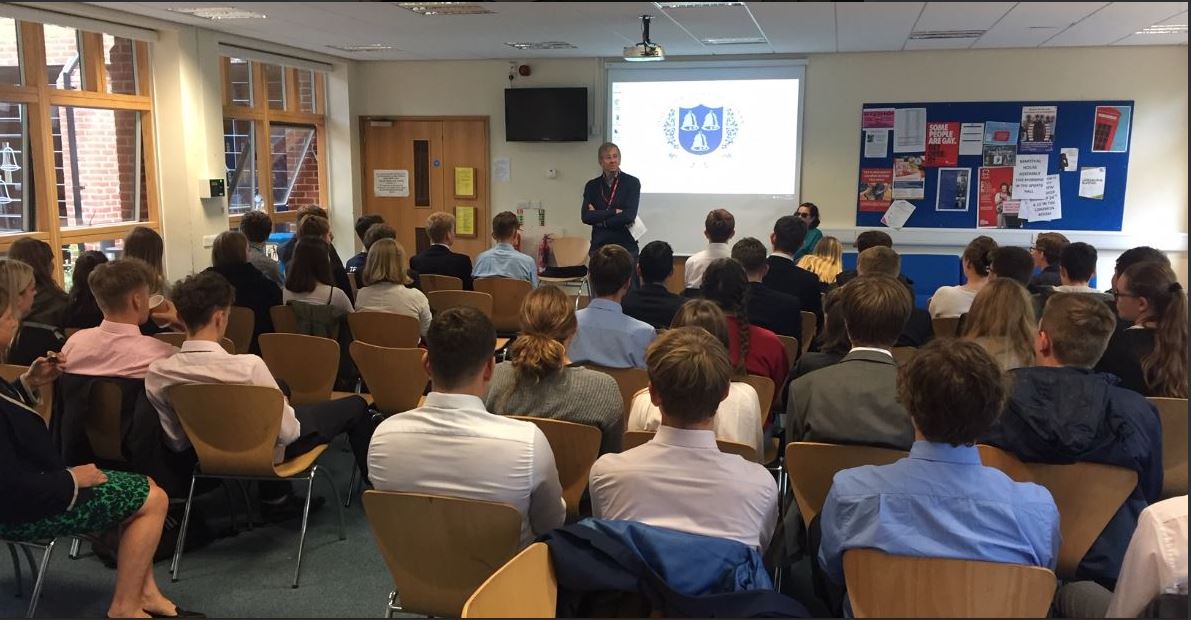
The Year 13 boys were out en masse midweek for the Safe Drive Roadshow and then, the following day a packed BAYS session listened to Sq Ldr Aidy Woolven (Boscombe) describing how to design an aircraft (BWS/SWGS/Godolphin students all in attendance). The same afternoon Mr Thorne and I took two minibuses full of BWS Year 13 Physicists to Southampton Uni to hear about Gravitational Waves courtesy of Rai Weiss, 2017 Nobel Prize Winner. And then, as many state schools shut up shop and go home for the weekend we had a block rugby fixture against Kingswood; 12 rugby teams, home and away, hundreds of boys enjoying their sport rather than their screens even though the weather did its best to dampen proceedings. That, of course, is omitting all of the lunchtimes and after school practices and clubs, at least three Choir rehearsals and last weekend’s DofE Bronze expedition which employed 91 members of Year 10.
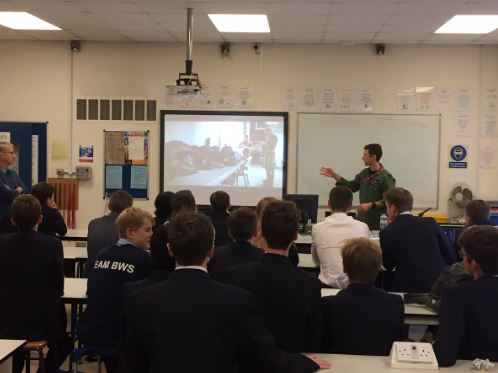
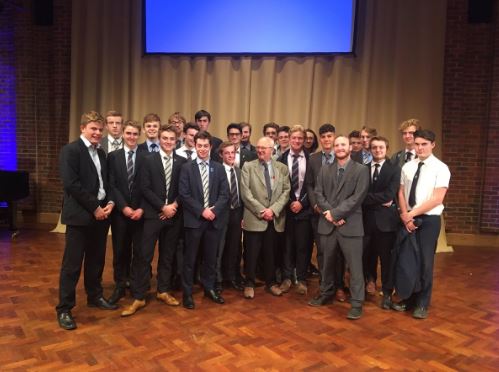
It wasn’t just the boys that made the school buzz when boys are not in classrooms. When I went in on Saturday morning to meet the under 12 boys the BWS Sports Hall was absolutely packed with Little Kickers, the next generation of knee-high sportswomen and men honing their skills with footballs which always look far too big. Further up the site, Sally Armstrong was looking after the latest batch of SAT candidates, Europeans taking the entrance tests for the US university system. The school site felt alive, populated and busy even though the working week was supposed to be over.
This is about creating an ecosystem really I suppose. School buildings are a public resource, built with taxpayer’s money, and learning is emphatically for all ages, whether in the classroom or not. I was very happy with what I saw, as Bishop’s felt right at the very heart of its community and carrying out its principal task brilliantly – that of extending opportunity, creating experience and memories and sending that powerful message that life for schools extends well beyond lessons.
SDS
To Cottonopolis then on my annual trip to the HMC Annual Conference. My wife told me to take an umbrella, but I refused to accept her meteorological stereotype and my confidence was endorsed by Mancunian sunshine on the ride in from the airport to Deansgate. Manchester, very obviously, is a city of contrasts. Of the twenty-odd stops on the tram journey, perhaps eighteen were in northern suburbia, an ocean of nineteenth and twentieth-century bricks. Necessary but nondescript and not entirely memorable! The last two stops are where things change, as a rather wonderful urban vista takes over; a combination of Victorian canal sides overlooked by skyscrapers, the centre of Manchester presents what I feel is an utterly European persona, wide boulevards, public art, urban light transit and a new concert hall. It feels invigorating, accessible and spacious. Whether the Northern Powerhouse is working or not is debatable, but renewal is a fact of life at Manchester Central.

HMC is a curate's egg as ever. Some utter drivel and bombast, to be sure, but also some refreshing freedom of thought and expression. That's why I come every year. There are lots of differences between schools in the maintained and the private sectors, but there are great swathes of common ground too, and what I find refreshing is the contrast in the mindset that HMC provides. It's not necessarily that I go looking for or expecting to find answers, as I am entirely realistic about the difference in the resource base of the two educational continents. What is refreshing is experiencing and hearing about real breadth, talking to Heads about how they approach shared problems and, above all, considering the art of possibility.

The sunshine in the North-West seldom lasts long, and on the second morning I woke to leaden skies, wind and drizzle. That didn't really seem to matter much as I made my way to The Midland past honking trams and commuters. The short walk between breakfast and the conference hall reinforces the character of England's third city for me, a city centre reinvented after the industrial decline and the catastrophe of the 1996 IRA bombing. Manchester has left an impression on me, and HMC will too I'm sure. I'm glad I've come...
SDS
Salisbury Cathedral was full last Thursday to celebrate a year’s endeavour from the boys and, most appropriately, we had a character from ITV’s ‘Endeavour’ to help us through. David Oakes, Head Boy in the early noughties and more recently star of both the small screen and the West End put in a classy performance and kept both boys and parents (especially mums and sisters!) entertained. It is always an event with a strong feel-good factor; the key thing is to have a feeling of pace about the evening, to keep the messages strong and simple and to turn on the style too to show the true calibre of the school and what the boys can do. That, I hope, is what happened, exemplified by David’s diverting and contemplative address and embellished by choral African rhythms and Michael Tao, Year 8 pianist extraordinaire. If you were there I am sure that you will have enjoyed proceedings every bit as much as me – and you didn’t have to speak!

I used a part of my annual summary to highlight a proposed change for the school; the move to a coeducational sixth form from September 2020 is currently under consideration by BWS Governors and, if they give the green light in early October, will be subject to the statutory period of consultation thereafter. Here is what I said on Thursday;
“As you may have heard recently, we are now considering inviting applications from girls to join our Sixth Form from September 2020. In doing so we join an ever-increasing number of boys’ grammar schools countrywide which are adopting an element of co-education – to widen opportunity, enhance ethos and ensure the viability of some smaller subjects on our site. We are also building upon the very good experience of our collaboration with South Wilts Grammar over the past two decades, though the decline in the scale of that collaboration means that it now makes more sense to have girls studying full time with us. Above all, we are offering a fantastic, memorable experience of education in the Cathedral Close - something that is not easily replicated anywhere else in either the maintained or private sector. The distinctiveness of Bishop’s as a Church School is something that deserves to be shared as widely as possible”
Exciting stuff and, for those with an eye to the past, a return to the school’s early history. Though ‘The Bishop’s School’ (as it was then called) was established as a boys school in 1890, between 1902-1927 girls were admitted throughout the age range, rising to make up around 30% of the roll.
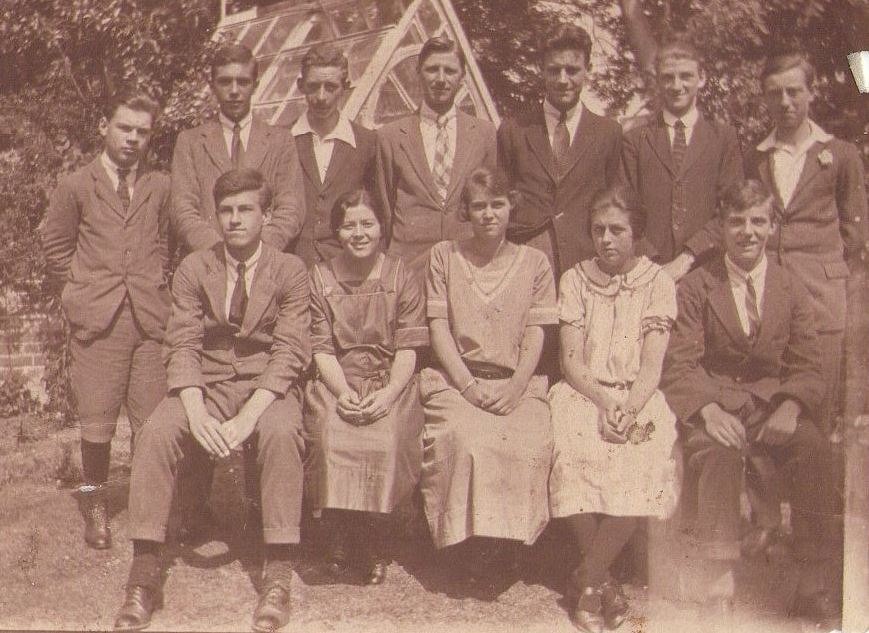
The foundation of South Wilts Grammar meant that girls were no longer seen on the BWS site until 1998 when the current collaboration with SWGS began. Now we are looking to move things on another stage by growing the BWS Sixth Form, ensuring that any student in the local area who gains the necessary grades can experience post-16 education of the highest quality right in the very heart of Salisbury.
SDS
The serried ranks of multi-coloured chairs in the Sports Hall gives it away; today is 11+ day at Bishop’s. A tide of 10-year-old boys 300 strong, and their parents have arrived at the Exeter Street Gate with the car park barrier acting as a filter – small people get through, whereas the (often more anxious) larger people disappear to top up on caffeine and catch some autumn rays around the town centre. Thus does the journey begin for many youngsters here, though this year the arrangements have been changed somewhat from previous incarnations. Gone are the days where boys were distributed around the site in classrooms of varying temperature, soundproofing and appearance, as this year we have chosen to use a smaller number of larger venues. Fewer rooms mean more of a common experience, guaranteed high standards all round and equality of opportunity for boys to concentrate and do their best. The tests that we use are designed to be less coachable by the Centre for Evaluation and Monitoring (based at the University of Durham), and again our intention is to try to create a more level playing field for all of the candidates. We hope that these, together with outreach activities, booster classes, governor visits to primaries and (in due course) 11+ familiarisation materials on our website will break down barriers and make BWS seem a realistic aspiration for all parents.
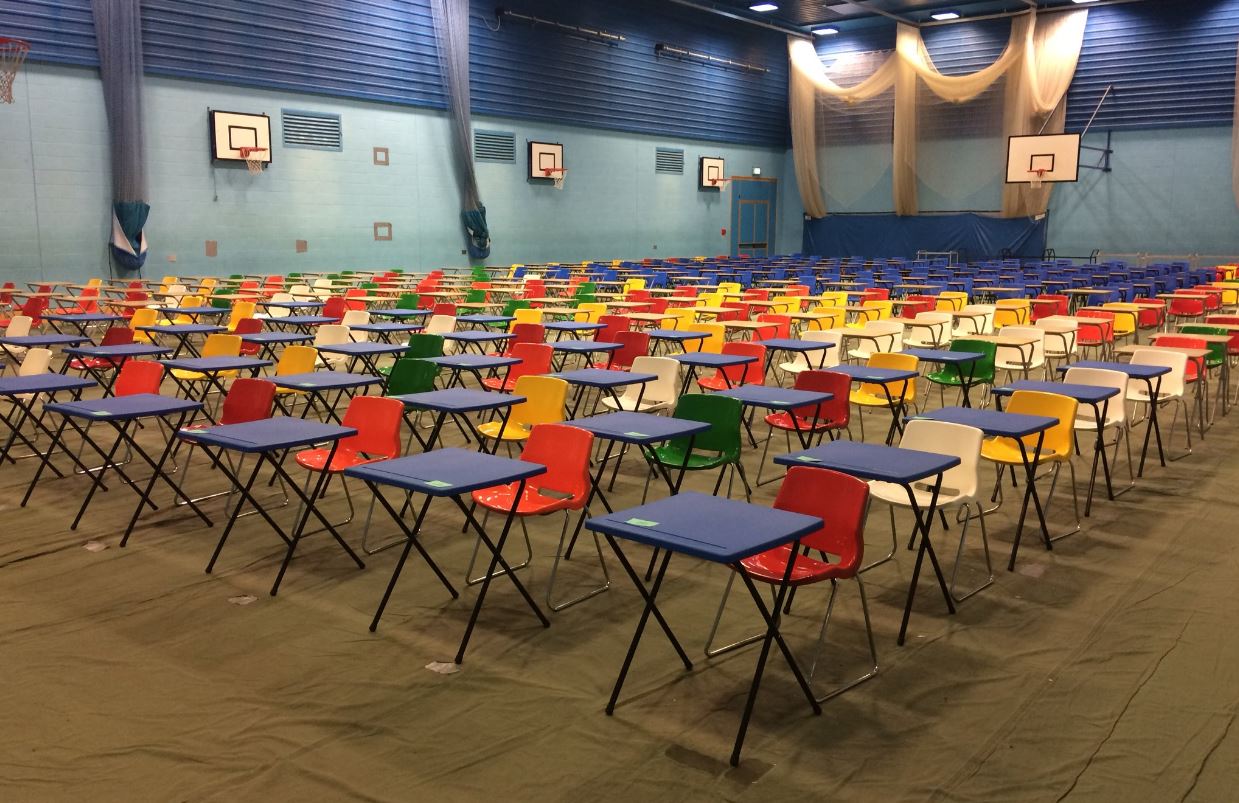
Meanwhile I do, of course, feel for those parents who are currently consuming coffee and talking about anything but entrance tests. Their thoughts will be focusing on their boy, as I remember mine were at the same stage. The most important thing for them is that we create the conditions for all of their boys to show their potential so that in due course they enter an academic niche where they will cope well and thrive as they mature. It is then the job of all of the local schools to ensure that there are a range of excellent routes through secondary education that suits every individual, whatever the outcomes of this morning’s event.
SDS
I suppose that we’re all used to it now – the experience of turning on the radio and hearing yet another diplomat refer to the ‘Salisbury Incident’. Our town has, albeit for the wrong reasons, become a focus for debate at the meetings of international bodies over the past few months. With the latest revelations focusing on the activities of the GRU causing a resurgence of interest Salisbury is unlikely to get less worldwide attention anytime soon. That has all been a bit of a shock to the system, but in many ways it shouldn’t be because we live in a tourism Mecca which attracts travellers from across the Globe. Throughout the year coaches bring pilgrims from across Europe, the States and Asia to enter the Close through St Catherine’s Gate; every day the gates to school are periodically blocked by a throng of visitors learning about Golding, with selfies in front of the blue plaque to follow. I often wonder where those images will end up, perhaps in digital frames in Tokyo, New York, Beijing or New Delhi. That’s something that I did not anticipate when I first proposed putting the memento to our own Nobel Prize-winning novelist outside Number 11.
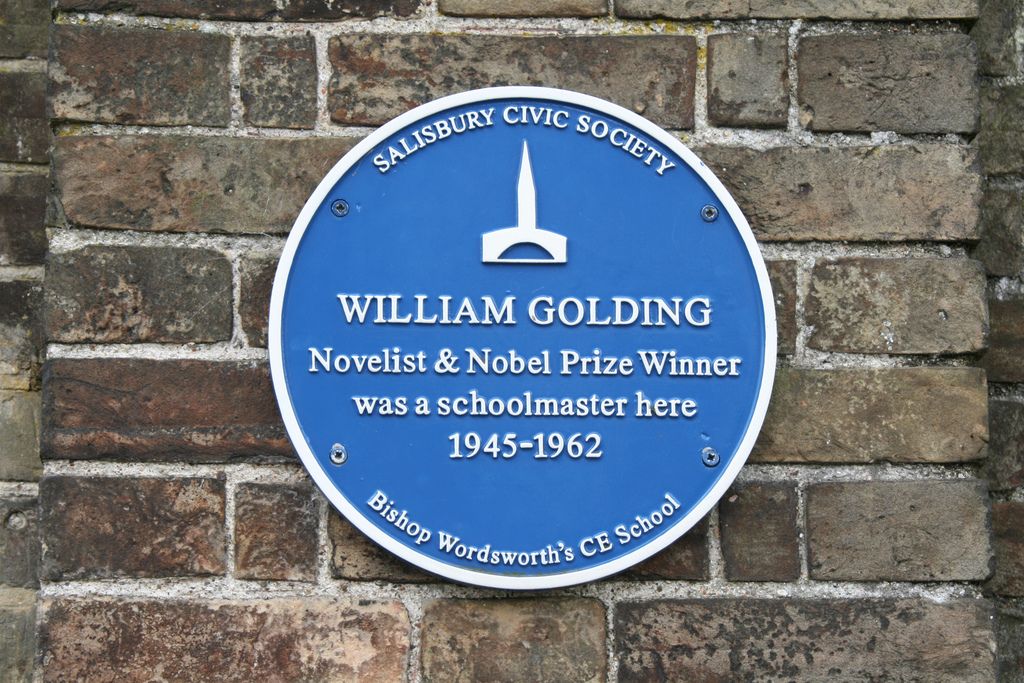
At this time of year there is an outflow too, as youngsters from Bishop’s and other schools start to migrate away from home for the first time after getting their A-level results. I have just seen the list of university destinations for the Year 13 boys from Bishop’s, and once again they are dispersing far and wide across the UK for the next chapter. This year (unusually) there are no overseas entrants, but there is no doubt that the boys are making more eclectic choices than used to be the case. Southampton, Exeter, Cardiff and Bristol are still popular (as they should be), but there are increasing numbers going to London, Birmingham and the North. I am really pleased to see that. We are blessed in the UK with universities of exceptional quality in World terms; there are probably 20 world class institutions within just a couple of hours travel of Salisbury, and it’s really good to see our boys taking the next steps into that wider environment with their eyes wide open. That’s hugely important for them, their parents and the school, but it matters for the city too as it enables Salisbury to punch above its weight in national terms. Salisbury may be small – hubs usually are – but it lies at the very centre of a wheel of global dimensions…
SDS
The St George’s flag still hangs out of my office window, slightly limp and faded but definitely unbowed. Though the young lions may have fallen at the final hurdle(s), isn’t it great to see the resurgence of national pride, the palpable excitement and engagement evidenced by those extraordinary TV viewing estimates, and the re-focusing (at least for a while) away from Brexit (nationally) and Novichok (in the Salisbury context). We did need something to cheer us all up and the bout of good weather combined with some success in Russian Stadia is probably just what the doctor ordered! The return of the English football team has the feeling of the end of a long campaign about it, and of course the homecoming is happening very appropriately as we break for the summer.
It is once again time to look back over an eventful and busy year here in school, one which has been characterised by the first year of significant growth as we have absorbed the first year group of 160 into Year 7. Ward House has had a good first year, with the boys in Year 7 and Year 12 working hard to ensure that the new entity has a strong showing in competition. Their next test comes this week at Sports Day, and their successors have recently been into BWS for a familiarisation day; it rarely strikes me just how many 160 is until I see them all together in the Chapel or (this year) in the drama Studio for the first session. Elsewhere successes are too numerous to mention, and in any case, they will have surfaced porpoise-like through Twitter, this column and my weekly update for aficionados of LinkedIn (all 1700 of them). Suffice to say here that the year has been one of significant industry and no small amount of celebration.
The end of the year brings with it, as ever, some staff departures. Catherine Pennington leaves BWS to take up a full-time post delivering Business and Economics at S6C, and Pip Shingles is taking retirement from the English Department after over two decades at Bishop’s. This means that staff turnover at the end of the academic year is very low this time around, but of course there have been a number of other colleagues who have left during the course of 2017-2018, including Richard Burnside, Olivia Williams, Paola Lyle, Dawn Fields, Lorraine Rinaldi and Catherine Short, all of whom have moved on to other (mostly school focused) posts or retirement. We are fully staffed for September, and of course I will write an introduction to all of the new arrivals at the beginning of the new term in September.
We end the year blessed with weather that seemingly belongs more in Sorrento than Salisbury, and I do hope that just for once the sunshine endures until the boys are on their break. Whatever you have planned for your son(s) and your holiday in 2018 I hope that the holidays are both refreshing and memorable for you, and I look forward to the treadmill accelerating into action once again in the early autumn. In the meantime, I will be leaving the flag there until the boys are finally home…
SDS
Five Houses means five nights in Great Yews. Five sets of excited 12 year-olds, five sets of tents to setup and to take down, mountains of partially cooked pasta to eat and campfires to light and control. It all happened smoothly, Sunday through to Thursday last week with a minimum of fuss and maximum enjoyment. Over 20 staff were either walking, camping or both during the week, and perhaps 40 prefects too. It is the sort of logistical challenge to give a quartermaster a migraine, but it happened in good order, to time and with (I think) a minimum of fuss. If your son was one of the participants I am sure that you will have seen the impact – not just the immediate tiredness (yes, they all ‘have walked this far before’) but also the realisation that it is eminently possible to have a lot of fun that is not digitally focused in the slightest. And they do learn quickly; because they are bright boys they usually only have to be shown something once and they have got it. Fires that take 40 minutes to light in the evening spring, as if by magic, back to life almost instantly the following morning. Pans of baked beans and bacon that slip into the fire pit during supper are steadily held or balanced come breakfast. That’s learning on task – and fast learning at that.
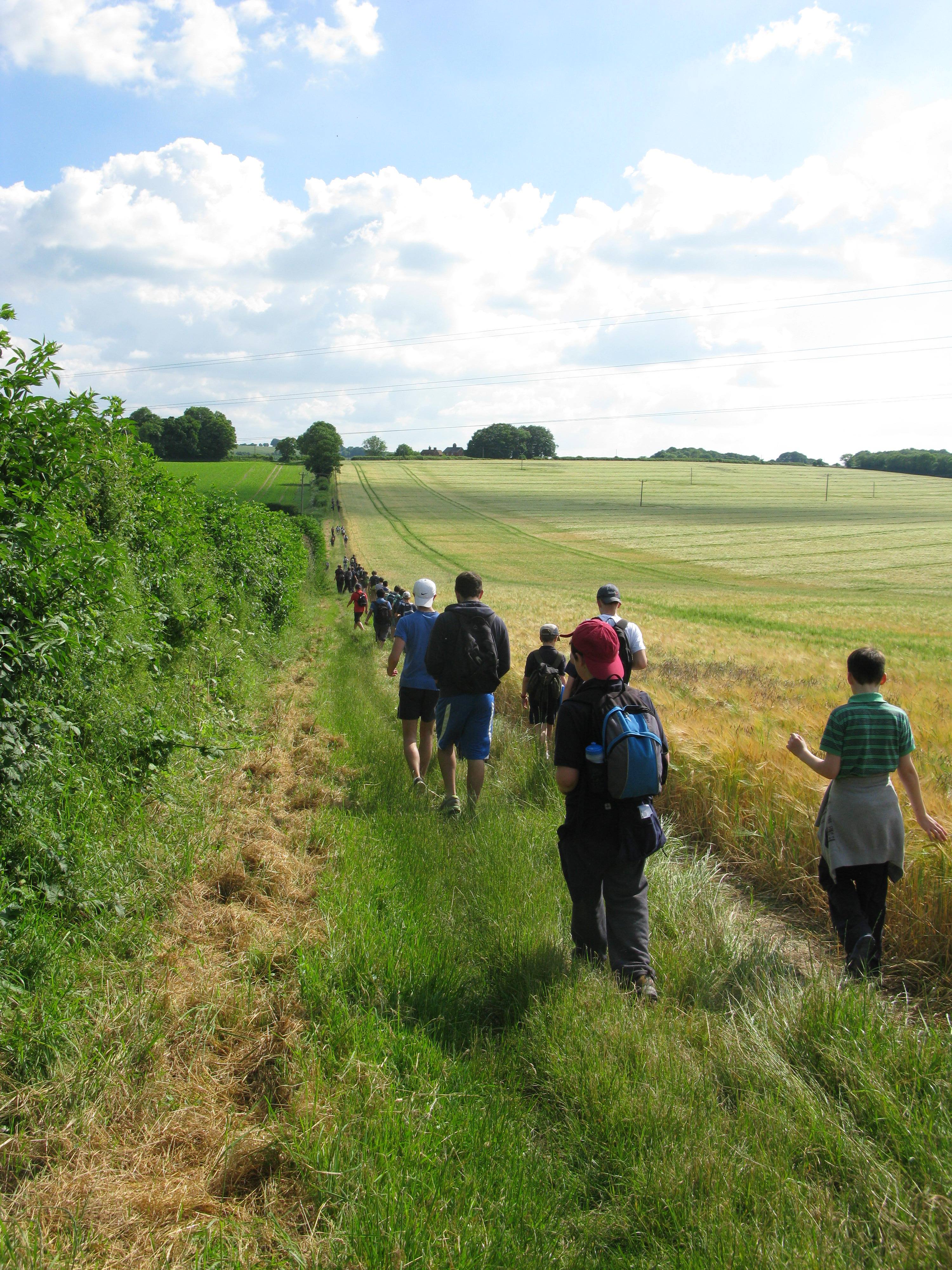
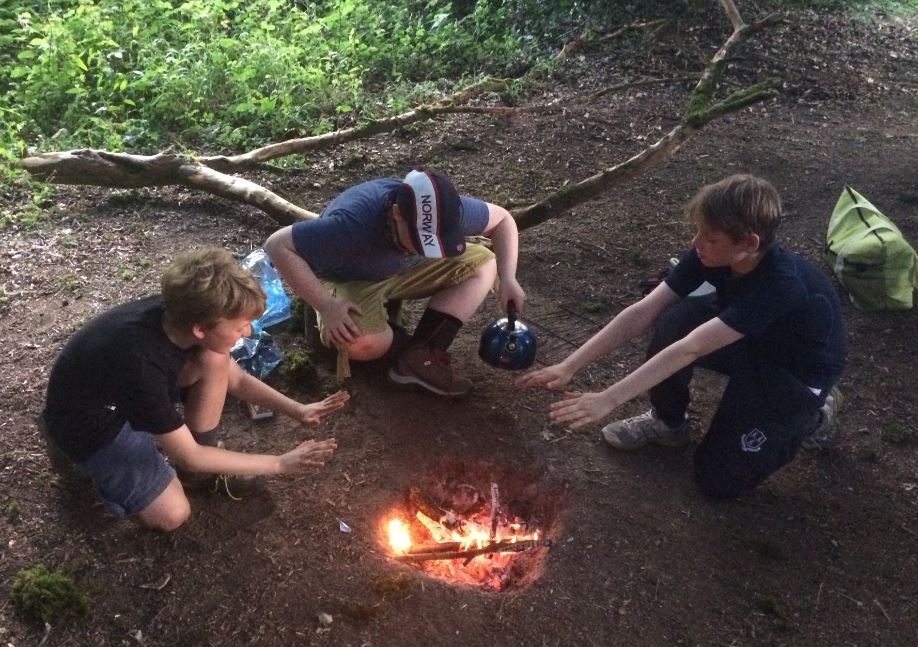
Yes, there are mishaps, and there will always be mistakes where boys are around. The dangers of mega-marshmallows, the late night tent failure and the groups that get irretrievably lost during the wide games come to mind from this year, but we live and learn together. What is without doubt is that the boys (big and small) emerge stronger and more resourceful from the rite of passage that the Great Yews Camp has come to represent. That makes all of the time, energy, lack of sleep and adult privations worth enduring.
I was at Great Yews on Sunday night (Jewell) and again on Thursday (Ward House). On both evenings I took the opportunity to take a longish walk through the woodland while the rest of the camp was focused on its various forms of busy-ness. The Yews quickly deadened the vocal cacophony of small boys, and the gathering dusk made guesswork of distant views until I reached the edge of the plantation where a wheat field basked in a great pool of late sunlight. My only companions, for those few brief minutes, were the young tawny owls waking in the trees behind me and the Woodcock roding on the woodland edge. I reflected then, as I do now, that there can be very few schools that still let boys be boys in such a way as Great Yews permits.
SDS
Nothing stays static in school for long. No sooner are the exams drawing to an end than you are preparing for the next groups of youngsters coming through to join; this very week the ritual of whole school assemblies recommences, coinciding with the removal of the exam furniture from the Sports Hall. The Year 11 boys have already been in to return their books (or most of them at any rate), and Year 13 follow suit this coming Friday. At the same time in the coming week we have our taster day for Year 11 boys who have applied to join the BWS sixth form and, on Tuesday there is the first of five Open Afternoons for prospective 11+ candidates. Tides of humanity of varying sizes and scales wash around and through the school site bringing even more colour and vibrancy to proceedings, and our boys have the chance to demonstrate their best diplomatic form as they escort mums, dads and sons around the buildings.


The current generation of Bishop’s Boys are lucky to be able to conduct a guided tour of a site which has some impressive buildings. That wasn’t always the case – one the first jobs that I had to do in years past was to apologise to visitors for the appalling state of the learning environment. Rotting mobile classrooms, peeling paint, crumbling brickwork and leaking roofs all around the school site made each tour an exercise in euphemism and understatement; I could never understand how prospective parents could return to the Dining Hall with such a positive frame of mind. What was clear then, and remains true now is that our lads are simply superb ambassadors for the school, showing a pride that is palpable and an affection for their school that is unmistakable. That fact was driven home yet again during the fortnight just gone by the House Prefects, who won the admiration of the groups of parents and boys at the House Suppers for the incoming Year 7. Really impressive and inspirational stuff.
And then, on Friday evening, to the East India Club in St James’ Square for a drinks reception for around 40 alumni (also known as Bishop’s Old Boys, or BOBs). Most have yet to return to their school to see how it has changed, and all were blown away by the development of the site in the last 20 years or so. All had fond memories of their time at Bishop’s, and my hope is that many of those previous generations will use their digital firepower to reconnect and thereby bring benefits through networking for the current 11-18-year-olds. Then, as the train pulled away from Waterloo and headed out through the suburbs my thought travelled across the individuals that I had known and talked to over the past week, and then on to the next events to come – the rights of passage that are the Great Yews Camps for Year 7. I remember some of the BOBs being at Great Yews and then, in their turn following the footsteps through the years to exams and beyond. Continuity and yet change as the end of the academic year approaches…
SDS
…at least I was asked one at one of the House Suppers last week. “How’s the money side of life for the school these days”? This was from a dad who already had a son at BWS and so knew only too well how grim the funding position has been in the recent past and how my communication with parents had all too often been dominated by money matters. It was a good question to ask if you are a new parent of course, and a welcome one from my perspective because the enquiry shows concern and engagement and that is what the House Suppers are all about.
The answer is somewhat complex and the news is both good and less promising at the same time. The introduction of the National Funding Formula from September 2018 will increase our school funding for boys in Years 7-11; the national figure is £4,600 per pupil, but we are going to receive around £50 per head less than that because Wiltshire Local Authority are not being compelled to pass all of the money on to schools. That sounds like a small deduction, but the amount that doesn’t come to BWS as a result is somewhere north of £30,000 (ie one teacher in my calculations), so there is a significant shortfall compared to what we should be receiving. Then, also on the plus side, we already have an extra 32 boys in the school compared to 2016-2017. Lagged funding means that we start to receive the money for those additional school places from this coming September, which means an extra £130k in the budget. That’s encouraging, but then there are significant cost increases too. The size of the BWS taught curriculum will grow by over 60 periods into 2018-2019, with each period costing around £1200. National Insurance and pension costs for employers have risen and the Apprenticeship Levy has to be paid, and there are now likely to be unfunded pay rises agreed for teachers in England. Together these increases in the school’s running costs have largely eroded any benefit that flows through from the NFF increase. What the DfE gives with one hand the Treasury takes with another…
Where are we at the end of all of that? The glass is probably just less than half full, and though there will be a further NFF increase in 2019-2020 I am not confident that the financial prospects have dramatically improved. It is fairer to say that we are in a significantly better position than could have been the case had the initial proposals for the funding formula been implemented. All of that lobbying and letter writing, all of those cuts and all of the work on Wiltshire schools’ behalf by John Glen have been rewarded.
A simply stated question turned into a lengthy and rather involved answer I’m afraid, but more importantly, the question brought into sharp relief much of the work on strategic planning that is going on at present. We have to plan for uncertain times post-Brexit where public funds will be tightly constrained. More boys will help, but we will continue to need the support of parents and to maximise the use of the school’s resources to ensure security for the future.
SDS
Every Friday lunchtime my teaching room is taken over explicitly for the purpose of a pitched battle. Admittedly it is a war of words, so the room is not trashed and returns to a more-or-less immaculate appearance at the end of the 45-minute confrontation, but the group of mainly senior boys who arrive, ready for a duel of assertion and riposte, certainly mean business. Marshalled by Mr Endersby they draw up lines on the W3 battlefield and launch into it. At that point I depart for yard duty and, much as admire Year 9 football there is just not the same intellectual cut and thrust on the back Yard as there must be in the Geology Classroom!
Practice makes perfect they always say, and the benefits of all those Friday sessions can be clearly seen in the success of the BWS Debating and Public Speaking Teams. We are regular finalists at a national level (in the Mace, Cambridge and Oxford Debating Competitions) and habitually local and/or regional winners in the English Speaking Union and Rotary ‘Youth Speaks’ Public Speaking Tournaments. Though 2017-2018 was dubbed a year for ‘consolidation’ by the indefatigable Endersby Machine the boys still had absolutely outstanding levels of success, for example reaching the National Final of the ESU Mace Competition for the first time in a decade or so. Given the large number of schools that enter that is an impressive achievement and Ben Barrett and Andrew White deserve huge congratulations for doing so well. It was great to see Ben get his ESU tie awarded at a reception on Friday night. No doubt Andrew was entertaining elsewhere if he wasn’t head down, revising for his A-levels…
It’s not just sixth formers who take part. There is a real momentum to the organisation at Bishop’s, so that boys start competing internally in Lower School, move to external competitions in Year 10 and finally when their turn to shine at the top comes, they start coaching younger boys as well. A sure sign of vibrancy, quality and success is also when other schools rely on us to help them with their teams and competitions, and that is one of the reasons why SWGS has had some phenomenal success too, especially in the ESU Public Speaking where they became National Champions a year or so ago. That’s a good example of the two grammar schools working together well to achieve synergy, and the efforts of the staff and students were celebrated at Friday’s event as they should be…
Both debating and public speaking have been important in the past and they will become more so in the future. The expansion of digital means of communication brings with it the danger of an impoverishment of the spoken (and written) word, and yet the critical roles for logical argument, advocacy and persuasion through the use of language have never been more axiomatic. We are told repeatedly that one of the main characteristics that employers value in youngsters is intelligence, the skill of being able to think on your feet to solve problems, and the ability to use language well. I am very happy to think that those Friday lunchtime sessions where boys (and girls) speak out address those needs head-on.
SDS
Try as I might, every time I contribute to the blogosphere the words seem to hit home these days. It’s hard attempting to keep a lofty, objective view on what is going on around me in school and in Salisbury when I am irretrievably immersed in the hurly-burly of life. I see and talk to parents constantly in and around Bishop’s, in Waitrose, in the Cathedral or taking the same diversion around the Maltings. We share experiences and stories, and the themes are uncannily similar – revision (or the relative lack of it), exam papers and the feeling of being at a crossroads. With my third child about to take his A levels over the next three weeks I am constantly wondering what comes next, projecting my thoughts forward to August and then on into the future in a distant city and university. It is exciting, despite the fact that I have been there twice before, but at the same time there are some pressure points where the pressure becomes more focused. There is no doubt that the summer exam season provides a test for families as well as those who end up taking the exam themselves.
In some ways this is an exercise in educational nostalgia. My dim recollection of my own A levels tells me that they were just terminal papers. No modules, no coursework, no controlled assessment, just long stints in a large hall with my hand aching acutely at the end of each sitting. Today is little different as, in the post-Govian World, our sons and daughters in Year 13 follow a largely linear track through to their papers, making them (in my view) a genuine test of ability and potential. This exercise in back to the future does raise the odds of course, as a bad day at the office could have dire consequences for some, and it is certainly true that the stress levels at this time of year will be heightened by the fact that much more depends upon performance right at the end of the course. That said, most cope well and there are few surprises in August – my hope is that all you long-suffering parents also come through with flying colours!
SDS
It just struck me as I was sitting in the garden in the sunshine on Sunday morning – my youngest child is just about to start his last week at school. Wow! Where did all that time go? These changes creep up on you, all of a sudden the world is going to be very different and I am left wondering what I did with all of those days, weeks and years. Did I make the best use of them that I could and what, if anything, I can recall of events both great and small? A huge chunk of my life is just about to evaporate; no more lifts to and from school, no more complex picking up arrangements co-ordinated between neighbours and friends, no more periodic invasions by parties of teenagers. An expanse of summer awaits, punctuated at the start by exams and then…what? Who knows where to university, and peace will duly descend.
All parents go through the transformation in circumstances, and in my case it is a change that has been happening progressively for the past 8 years ever since my daughter left for the Midlands to study for an English degree. But, it’s not until I have come to the final hurdle that I realise where I am in the race. I find myself thinking back to times when I had two children simultaneously attending SAYM, when I had at least two at the Salisbury grammars and, further back still when all three went through St Mark’s up on the hill (still a good school, whatever direction OfSTED’s wind is blowing this year). I feel, I am sure, what every other parent feels – immense pride (and wonder) at all that they have achieved despite their father’s best efforts but also a tinge of regret that time must move on. Come the autumn the house will seem bigger and much quieter, but hopefully the compensation will come via FaceTime…
This is the time of year, then, when the pendulum of time reaches the end of its arc and starts to swing back on a different path, with different possibilities. We mark the change with a parting BBQ for Year 13 on the Head Master’s Lawn at Bishop’s at the end of June and there is a combined air of celebration and poignancy. I invariably speak to the boys en masse about what the future might hold, and where their paths might lead, and I often read a short piece written by the theologian and broadcaster Malcolm Muggeridge when I do. It ends by asserting that the search of happiness is, at its heart, the unending search for perfection by imperfect men – probably never to be found, but always worth trying for.
Whatever year your son is in I wish him well for the exams, but my heartfelt good wishes go out especially to my compatriots in the body of Year 13 parents. I hope that your experience of Bishop’s as a parent has been as good as mine, and I wish your son fulfillment and good fortune as he stands on the brink of a world beyond Salisbury.
SDS
It is quite extraordinary to think that just two months ago the school was closed due to snow – and yet here we are in the very midst of the warmest May Bank Holiday weekend on record. The sunshine streams earthward from an azure sky unblemished by cloud of any description, a sure sign that the summer exams will be upon us very shortly. And so they are. The surest sign is the procession of Year 11 boys travelling the garden path to No11 to go through their oral exams, the precursor to the GCSE written papers which will begin in earnest the week after next. The rest follow swiftly; the junior boys have their session of in-lesson tests during the penultimate week of this half term and then it is the turn of Year 12 to sit their internal end of year papers in the week leading up to the break. After the holiday Year 13 step into the breach, with the A level papers scheduled to run until the end of June. Lots of slightly overheated and toiling boys getting their heads down to show us what they can do, despite the temperature outside rising into the 30’s. It’s all rather unfair, but that, I suppose, is the way of the World and has been so for time without mind.
You can be sure that sufficient prep has gone in, even though your son may well profess otherwise. They do that sometimes, provided (that is) that you get anything cogent over the dinner table in the evening. My experience of my own boys (and girl) casts doubt on the prospects of this happening as regularly as we might all like! But of course ultimately matters come down to the boys themselves, and the recipe is simple. Find a revision method that works for you and then get organised, keep to your schedule and make it manageable. The advice tends to replicate through the year groups, and the truth is that some boys are self-motivated for their first set of exams in Year 7 whereas I have known some Year 13 students who still seem to believe that revision is like a foreign language…
Whatever year your boy is in I wish him the very best of luck. Do all that you can to help – give him somewhere quiet to study, dispose of the temptation of electronic gizmos as much as is practical and keep him fed and watered as frequently as possible. Boys do tend to run out of calories faster than they exhaust the grey cells, so plugging in the battery charger little and often will be good. And remember, after the ordeal is over there is a whole lot to look forward to. Year 11 and 13 have a long summer and a new phase of life, and for the other boys the back end of the summer term (freed from the tyranny of tests) promises good weather and all sorts of activities to lend excitement and colour to school life. Yes, the summer term can be a trial but there are compensations too which do not demand a transparent plastic pencil case and strict management of time.
SDS
I thought that the Founder’s day Service in the Cathedral Service was great. Because of the earlier date all of the boys (including those from Years 11 and 13) had the opportunity to be present, and it was very pleasing to see that Year 13 were very well represented. It must be tempting to avoid getting up early if, towards the end of your last year in school, you are asked to attend on Saturday morning. To their credit the vast majority were there, and no doubt the no-shows will be given a suitably hard time when they report for duty on Monday. I have little sympathy! The talk by Alan Jeans (Archdeacon of New Sarum) was interesting and well delivered; it focused on the relevance of lessons from the past for all of us. Lessons about the fracture of societies, particularly in times of economic stress, and the dangers of nationalism and tribalism and what they can bring. He also spoke movingly about the old boys from the school who traveled to Northern France a century ago and did not return – the 42 names recorded on the memorials on the wall of the School Chapel. Occasional photos of Bishop Boys from that era demonstrate just how close the connections are with our current generation of young lads. Ignore the starched collars, tweeds and strange surroundings, these were boys who grew up and often raised their families in and around a Salisbury that is still familiar to all of us today.
In his wonderful stage and TV Play ‘The History Boys’ Alan Bennett makes a very telling and (I think Poignant) metaphor for the parallelism of history and ideas. Hector, the schoolmaster is talking about reading and the expression of thoughts by authors through time. ‘Read a book’, he expounds, ‘and every now and again you’ll find one of your own thoughts written in there in exactly the same way as if you had written it yourself. It’s as if a hand is reaching out from the past to take yours, even though the author of that thought may be long dead.’ It’s an utterly compelling image, and one that will not be lost on anyone who has been a bibliophile at some stage in their lives. I feel it today reading or watching that Bennett play. I remember feeling an uncanny hand of time reaching out to touch me when I did my research many years ago, re-investigating Welsh Geology which had first been investigated by O.T. Jones in the early 20th century. And I felt it on Saturday as Alan read some of the names of the BWS boys who died a hundred years ago.
We will commemorate those young men again later on in 2018 closer to the anniversary of the Armistice. They were an important part of Saturday, but just as important was the celebration of the current life and success of the school, and the foresight of John Wordsworth 128 years ago when he got his project started. His hand from the past still reaches us now.
SDS
…or at least that’s what they say, only I never really look at it quite like that. I think that all teachers lose some of the momentum gained during a term when the holiday comes. When the school is in session you may be tired and the adrenaline may be in short supply, but there is a sense that everyone/everything is moving in phase at the same speed. I suppose it is vaguely reminiscent of slipstreaming in a race, where energy can be conserved a little because acceleration is not required. At the start of term that feeling of a common motion has evaporated and suddenly teachers have to try to sprint off the blocks once more, which is a draining experience. No matter how often you do it, the experience tends to knock the stuffing out of even the most well-travelled pedagogue. The first day back is trying.
Having said that last week was good. The staffing complement remains full with the return of Vicki Brennan (Head of History) from maternity leave, and on Thursday last week our two additional minibuses arrived on site thus easing our bottlenecks with extra-curricular transport and widening opportunities to do exciting things for the boys still further. The BWS Parents’ Association did a simply outstanding fund raising job, accumulating a total of £24k towards the purchase of the vehicles through draws, quiz nights, the Christmas Market Stall and Car parking and so on. Every single one of those tickets bought, cakes sold or direct debit completed made that huge sum become a realistic target, so thanks to everyone who helped. You really did make a big difference for our lads.
The boys have done their bit last week too. The Choral Concert rehearsal in the BWS Sports Hall sounded great, the Year 10 National Biology Results were simply outstanding, the Year 12 Rotary Public Speaking Team won through to the National Final and the Bronze DofE Boys migrated en masse to Savernake for their practice expedition. Just for once (and in despite of the usual meteorological pessimism in some circles!) they will have had almost tree-to-tree sunshine. That same sun was also making Year 10 feel somewhat ruthful, I am sure, as they sat in the Sports Hall for the week taking their exams – but even those went without a hitch, much to the boys’ credit.
So, despite the trepidation with which most of my colleagues will have approached our first days back, the working week was a good one and for me personally it ended well. Some twenty years ago I started as Deputy Head at BWS. Wow! And then, on Saturday came the welcome news that Salisbury FC have achieved promotion for the second time in 3 years. If that is life on the treadmill, then play on…!
SDS
The final assembly of the Spring Term is always a rather intense affair. I tread a very fine line between good-humoured competitiveness and rather noisy mayhem, and the line is not a straight one as the mood of around 1,000 boys sways from one extreme to another like a field of barley under a summer breeze. I imagine that it would be the stuff of nightmares for some – serried ranks of faces extending perhaps 25m to the cricket nets at the back of the hall all waiting for you to orchestrate matters. Even though I have led such events for over a decade and a half now I still get the adrenaline rush at the start, and then the tidal fall at the end as the audience dissolves remarkably quickly.
It’s not done for nothing of course. A major part of the assembly is the award of House prizes to reflect academic achievement and endeavour; more than a little Hogwarts, but the little (and bigger) boys love it and some of the form tutors get a distinct competitive edge too! The other main job (equally anticipated I would think) is the award of the senior prefect awards for the following academic year. There is no doubt that the results are eagerly anticipated, but as with all elections and appointments there are always some who feel left out. Democracy, in whatever form it would seem, can never please everyone all of the time, and this year was no exception as I received the annual disgruntled email shortly after the assembly sent by some who had not collected a gong. There is nothing that I can do of course; like referenda, though the outcome may be not to one’s liking it cannot be ignored or changed, but I thought it might help a little if I outlined the democratic process so that there is a shared understanding of how the decisions are made.

Contextual evidence is very powerful of course, so a boy’s record through the Lower and Middle Schools will be taken into account at an early stage. All boys in Year 12 are encouraged to take a full part in school life, whether they have been with us for 5 years or have just joined in September. All the Year 12 boys are invited to help – in the Dining Hall, at Open Events and conferences, at Parents’ Evenings and so on. They don’t have to as it is entirely a matter of choice for them to make. In the Spring Term of Year 12 staff are asked for their recommendations (and there are hundreds of votes) and Year 12 is also invited, en masse, to nominate their peers for SP status. The Year 13 duty prefects keep logs of those in Year 12 who have made an impact, and all of this is taken into account by the Sixth Form Office staff when they shortlist for Head Boy applications. This year 8 boys were invited to apply, and all 8 were interviewed by a panel of staff and Year 13 boys. Though I was Chair of the panel I held no other special status, and in fact this time I left the remainder of the panel to decide on the top three posts. Once these are chosen then the new appointees are asked to form up their team, and I get the list of names immediately before that final assembly.
Is it democracy? No, not in the sense of having universal suffrage I suppose, but it does come close. What the process does result in is a team which will operate for a year, and needs to get operating effectively fast. There is no point in having a dysfunctional group of boys who cannot manage the jobs that they have been given. Balance is needed, and a match between job type and personality and skills and – an important consideration – we do need to try to give a decent chance to boys who have just joined BWS. We have had a Deputy Head Boy who joined in Year 12 in the past, which (I think) is really encouraging. There is no place for favouritism, cronyism or cliques, and the good news is that every year the boys rise to the challenge of the roles that they have been given. Long may it be so.
SDS
I must admit to giving in to a degree of self-interest when I established the @BWSGeology Iceland Trip some years ago. The department had been to Tenerife several times, and then there was an extraordinary trip to Sorrento which lives on in the memory too, but for a Geologist, enthusiastic volcanologist and also confirmed naturalist there was a certain inevitability to the fact that BWS and SWGS students would end up touching down on the tarmac at Keflavik. Despite being, I think, my sixth visit, the place continues to fascinate and deliver the elusive ‘wow’ factor again and again. Towering central volcanoes each with an ice cap, Layer upon layer of lava still looking so fresh that it could have been erupted yesterday, erupting geysers, thundering waterfalls and place where the ground is so hot that you cannot walk on it. There is an active, dynamic and awe-inspiring quality to all that we see as we travel around the south west corner of this marvellous island nation. The only thing that is missing (this year anyway) is a volcanic eruption – Eyjafjallajokull remains asleep, Hekla continues to swell with hidden magma but has yet to awaken and Bardabunga is too far away for us to see. One day, surely, we’ll get lucky.

There are volcanoes in the UK, including massive ring complexes, flood basalts and enormous vents, but the difference is one of age. The Britain the last volcanic activity was around 60 million years ago in North West Scotland, where large scale eruption and intrusions marked the opening of the North Atlantic. In Iceland, the oldest rocks are around 8 million years, and the are many large eruptions which have taken place in the last 1,000 years; this means that they are part of human history. Historians as well as Geologists can read first-hand accounts of the massive eruptions of Askja and Katla and there are photos and films of the activity of Surtsey, Hiemay, Hekla and Grimsvotn as well as that 2010 ash cloud from Eyjafjallajokull. When we were driving across the lava fields earlier today it was chastening to think that they would have been part of events that had pushed human habitation here to the very brink of extinction. The ground steams as if the gods are angry, the Norse sagas sometimes say, and in fact the AD940 Eldgja eruption was so dramatic that contemporary texts describe it as the end game for the gods themselves. Christianity followed – though the ground still steams of course! (see @BWSGeology tweet 23/3/2018)’ .
We are mid-way through the trip; tomorrow a crampon-clad hike up the tongue of the Solheimajokull Glacier beckons, and I am happy that everyone is still learning out here even though term finished a couple of days ago back in the UK. Iceland will always push visitors to the limit and occasionally beyond. Nature here is vibrant, red in tooth and claw and constantly unpredictable. Our students are gaining experience by learning about rocks, true, but I think that they are also learning some more about themselves too because that is what happens on trips of this sort. My aim is that the geological content that they learn now and with their follow-up work will help build confidence for their exams, but I hope too that the experiences that they have here will be with them for life. In the end, that is what expeditions like this one are for.
Gledilega paska!
SDS
…was much in evidence during the week past. Despite the fact that an early Easter means that we break before the close of March, there was a huge amount going on in and around BWS over the last seven days – and even more to come before Thursday sees the school dissolve on the eve of Good Friday.
The final throes of this year’s Rugby took place in South West London at the Rosslyn Park VIIs, where the U16 boys were unbeaten; but for a quirk of the points counting back they would have progressed further in their competition. As it was they emerged with their heads held high, three wins and one draw to the good and loads of promise for the future. The seniors did just as well on Wednesday and Thursday, group winners and quarter finalists in the Bowl Competition they were up against the toughest private school opposition from across the country. It was noteworthy that there were no other state schools represented at their elevated levels of the tournament, so our boys did themselves and us very proud. The future looks bright in terms of talent and the camaraderie is simply outstanding – and that’s just as true in Football and Basketball too.

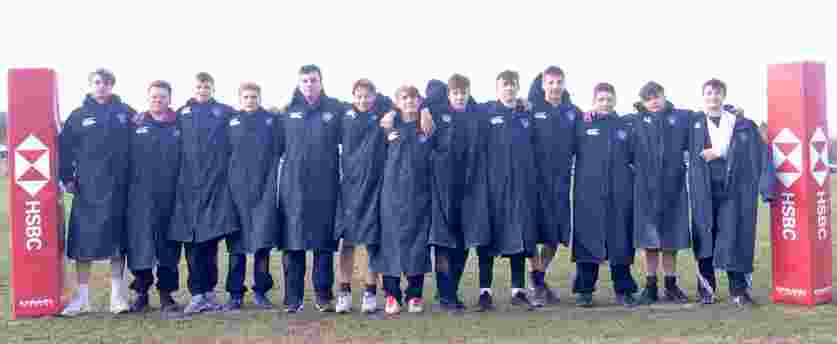
But it’s not just on the sports field that Bishop’s Boys have been achieving great things and gaining experience both valuable and eclectic in nature. Last Friday saw the House Music Festival in the Sports Hall, with masses of boys taking the opportunity to parade their musical talents. Mid-week was the focus of fairly frantic activity as our Debating Team took part in the National Final of the England Mace Competition, boys attended a French play by the Onatti Theatre Company, the Young Shakespeare Company performed ‘Romeo & Juliet’ for the whole of Year 9 in the afternoon, a STEM Conference and workshops were organised for Year 12 and there was the small matter of the Whole School Eucharist in the Cathedral – and that was just Wednesday! On Thursday Year 11 travelled to RSC Stratford to see Christopher Ecclestone in the Scottish Play, and on Friday we received the results of our Chemistry Olympiad entrants from the sixth form this year (3 gold, 20 silver and 25 bronze). That’s not quite it, as on Saturday our team of Year 10 boys competed in the first Salisbury City Challenge at the Stones Hotel. The team of three won their section of the competition which was judged by our MP, senior members of the public services and business people. Wow!
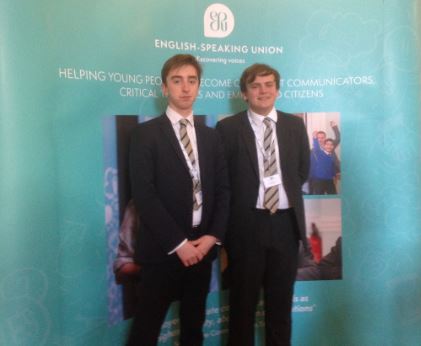

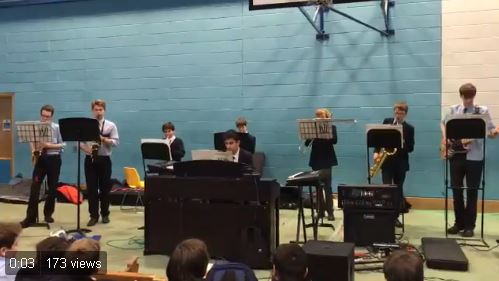
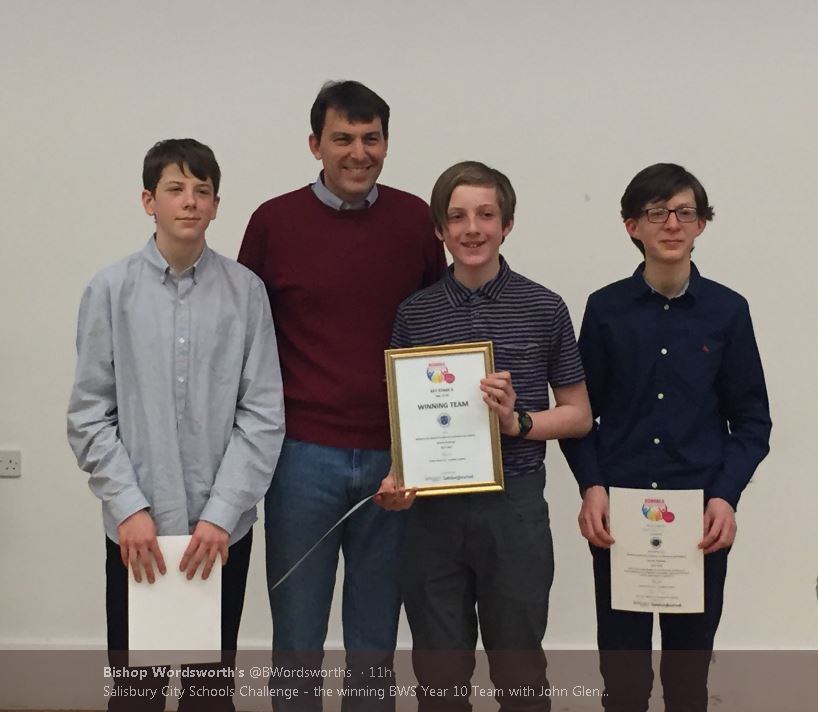
It can’t be like that all the time as the pace would not be sustainable, but it is worth bearing in mind that there is such a huge amount going on across the full breadth and age range of the school. Keep an eye on the various twitter feeds as they will give you a good feeling for what is going on, and a good idea too of just how much my colleagues are putting in to make it all happen for the boys here.
As our spring voyage nears its conclusion take a look back too across the wake of the term, there really has been a lot for us all to be proud of this spring.
SDS
On Saturday evening I went to SWGS to take part in the event celebrating 20 years of the Salisbury Grammar Schools’ French Exchange. I took the rather brave/foolhardy decision to address the assembled company of linguists in French, employing my O level linguistic skills from the late 70s to (I hope) reasonably good effect*. As I told them at the party I felt I had passed the writing test and now had the oral – though very few exam candidates for languages would be faced by over 20 oral examiners at the same time! Here is what I tried to say…
“Bonsoir Mesdames, Messieurs et les étudiants du vingtième échange de South Wilts, Bishop Wordsworth's et le Lycée Saint-Joseph du Loquidy. Vingt ans c'est très long pour un échange. Le monde est très différent depuis le début de l'échange. J'ai recherche quelques évènements qui sont arrivés en mille neuf cent quatre-vingt dix- huit. Voici quelques exemples. Le Concours de Chanson Eurovision a eu lieu à Birmingham. Les premiers Euros ont été faits. Et finalement, la France a gagné la coupe du monde ; la finale était au nouveau Stade de France. Plus de mille étudiants ont participé à l'échange pendant ces vingt ans ; deux décennies d'apprentissage, d'amitié et de succès Donc – merci à tous ceux qui ont travaillé si dur pour que l'échange réussisse- cette année et depuis le début.”
It takes a real act of will, a lot of determination and quite a bit of crisis management from time to time to make an enterprise like this work. Transport sometimes doesn’t work, venues can be closed at short notice, the weather can get in the way (there is around 6 inches of snow outside as I write), illness can intervene and of course the whole thing relies on the willingness of parents and staff to recognise the immense (but sometimes intangible benefits that flow through. The simple truth is that over 1,000 students from Salisbury and Nantes have had a week’s home stay overseas because of the dedication and commitment of two groups of teachers on either side of the national border. The team of teachers has (mostly) changed over the two decades, but the intention and rive has remained the same. In a world where language exchanges are becoming a rarity and Britain seems to be becoming more introspective, our teachers have gripped those essential ideas of international understanding, cultural empathy and linguistic skill. Here’s to the next 20 years!
SDS
*thanks to Helen Jouahri for her expert advice with the application and conjugation of the subjunctive…!
No, it’s not a sequel to ‘Pride & Prejudice and the Zombies’ – rather this was the apocalyptic meeting of the air masses that brought Salisbury to a shuddering halt for the last two days of this working week. That vicious Siberian air flow that had reduced many to shivering wrecks marched headlong into Emma, a northward transitioning mid-latitude depression which had its origins in the relative warmth of the bay of Biscay. The result? Around a foot or so of the white stuff dumped on Wiltshire and Hampshire over the course of about 12 hours or so.

People moan on, don’t they, about Britain’s inability to cope with weather, whether that’s heat, drought, flood, gale or (in this case) snowdrift. Having said that this was fairly extreme and certainly the largest amount of snow that I have seen since I moved to Wiltshire 20 years ago. I hadn’t quite gathered the implications when I agreed early in the afternoon drive across Salisbury to pick up my son; by the time I got behind the wheel the conditions were already poor and they continued to get worse through the city centre and into Harnham. We managed to avoid a series of jams by taking untreated back roads, and never have I been so glad that I had chosen to invest in a 4X4 all those years ago. This was enjoyable – but serious and potentially dangerous stuff nonetheless – and the journey home must have taken around 45 minutes.
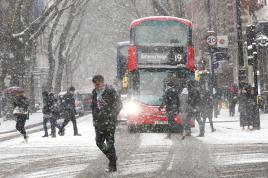
It was no better the next morning when I ventured out to have a look at what conditions were like on the downs. Having helped one car driver stuck in a drift to extricate herself I decided to follow a snow plough towards Amesbury and see what happened and yes, you’ve guessed it, the snow plough also got stuck! That was a situation beyond my remedy, so I gave up, drove home and went for some fantastic sledging instead. The conditions were perfect, dry powder snow with an icy crust and a smooth profile to the slope. My hope is that all those boys who were so anxiously asking about the likelihood of ‘snow days’ had just as much fun as well as doing their homework. After all those extra cold days of holiday spent prone on plastic or wood are what memories are made of…
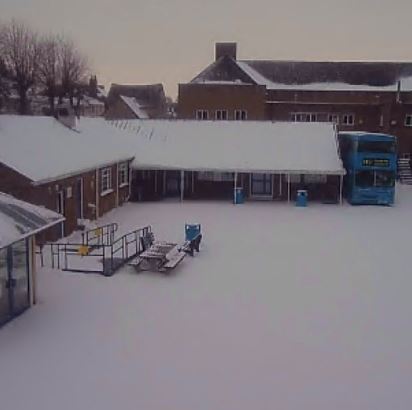
As I write a fine drizzle is falling and the lawn is re-emerging from its white covering. Though it was fun while it lasted from some, for many others the chaos, disruption, frustration and cold have taken their toll. In truth Emma and the Beast was a bit of a curate’s egg and I’m glad now that things look like they are headed firmly for normality.
SDS
Just as the rumoured ‘Beast from the East’ is lurking ready to hit us with Siberian temperatures, so spring seems to be edging its way through a barely open doorway into the sunlight. The crocuses and snowdrops have once again made a splendid display in the garden of No11, temporarily converting the space under the plane tree into a woodland glade.
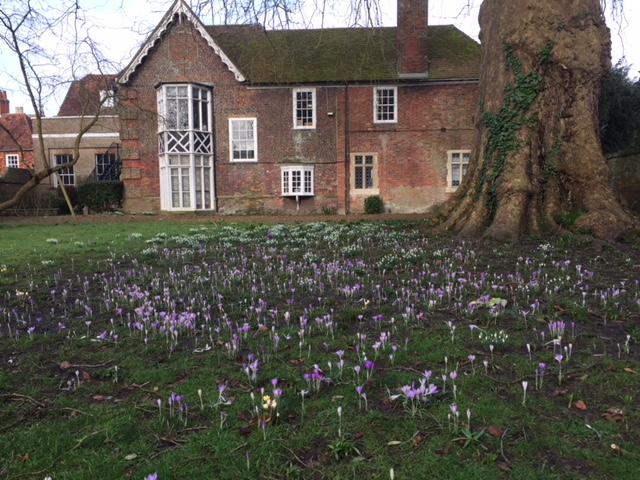
This year they have been encouraged by the removal of a tall laurel hedge which dominated the light and the rest of the microclimate to the detriment of most other things. Spring has sprung anew as a consequence. The changes are felt throughout the less verdant part of the school site too, as boys rediscover the advantages of the open spaces, the lack of cars and the new sports facilities that are gradually coming into play (literally). The outdoor table tennis is a great hit (again literally!) with the junior boys, the basketball hoops a scene of (mostly harmonious) competition, and there is more to come – we plan to pave over the E Block Quad and provide more table tennis before the end of the academic year and also the back yard will be marked out for futsal. We have limited space, but it is becoming increasingly well used.
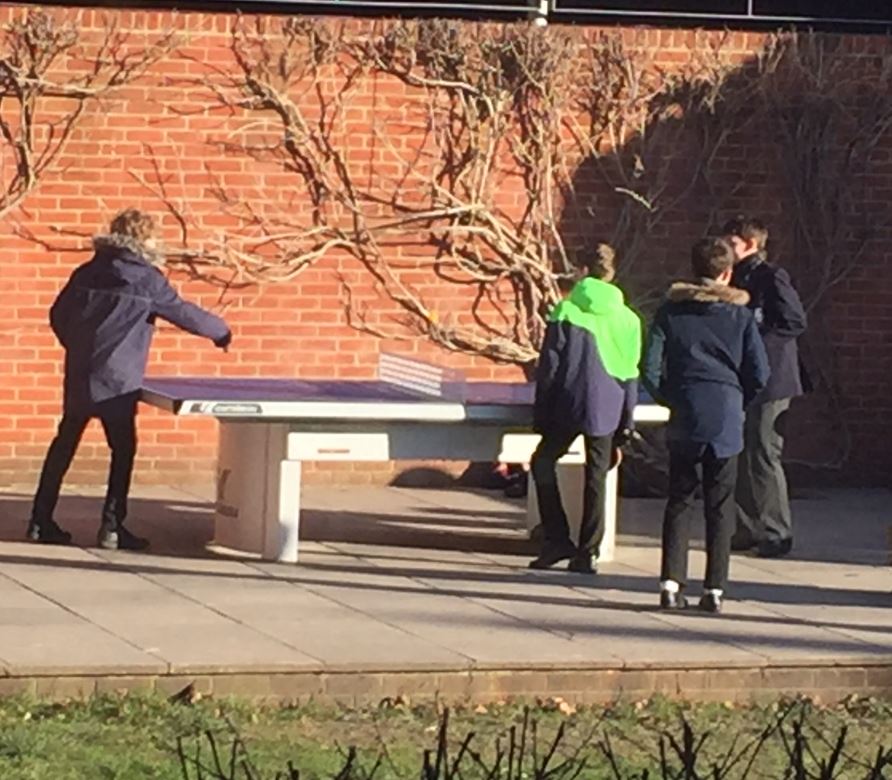
The other notable school event taking place at this time of year is admissions-related. On or about 1st March each year offers of places in Year 7 are issued to parents across the region. I vividly remember being in that position myself, waiting for the envelope to drop onto the front door mat and then seeing whether it was fat or thin.

If you are having an anxious wait to see what the beginning of the month brings you have my sympathy and understanding! We should have another 160 boys joining us in September as the second year of our planned expansion begins. The demographic bulge will extend up through the year groups as time passes, until September 2021 when we should have a total of 800 boys in the Lower and Middle Schools. No doubt that growth will continue into the sixth form as we tend to retain most of our boys for their A level studies. That theme of growth and expansion applies to both the turn of the year and the school itself as we move into the second half of the spring term.
SDS
It remains a fact at BWS that almost all of the boys leaving Year 13 go on to university courses – bar a small handful who enter employment, apprenticeships or another type of training, usually in one public service or another. That, I think is about right for this type of school and it is what we are good at. Yes there are still a significant number of boys who, for one reason or another, decide to have a year out of education; perhaps 20% of our boys disappear to the farthest flown parts of the planet in search of Gap Year entertainment of one sort or another and good luck to them. It’s what I would almost certainly have done had I been their age in a world that seems to shrink every time I look. But even these travellers, with their independence, sense of adventure and enhanced life skills mostly choose to enter university when their wandering is over. The rite of passage is still too attractive and, in the longer term, too potentially lucrative to disregard.
All of which makes the year-long HE/fees consultation, launched yesterday by Theresa May, of greater importance. There are several fundamental areas of unfairness in the current system. When the opportunity to charge increased fees was opened up, I think that I recall that one of the underpinning ideas was one of a market evolving where the universities that have the most prestigious/competitive and/or more expensive courses would charge the most and then there would be a sliding scale of charges which would reflect the desirability of the provision, the entry requirements and the physical and human resources needed to deliver. Few would have predicted what has actually happened – everyone charging the same, regardless of teaching group sizes, contact time or course status. What we have is not a market at all, it is more like a massive cartel with students studying the Arts and Social Sciences subsidising the more technical disciplines. That’s just not fair.
Of course UK PLC needs Mathematicians, Scientists, Engineers and Medics if we are to grow economically, retain research prowess and continue to punch above our weight across the world. No-one doubts that, but that also means that charging extra for students to study STEM subjects becomes counter-intuitive and could be counter-productive too. The solution must lie in recognition of the worth of HE qualifications both to the individual and to society as a whole, and then designing a system to fund study that recognises both accordingly. That’s a difficult, but by no means impossible job.
A last thought which I usually bring up at the back end of a dinner party conversation just to upset the baby boomers amongst us who enjoyed the university experience for free (and had a grant too in many cases). Charges for HE for the youngsters now, it can be argued, are filling a financial hole left behind by those in previous generations who did not do their bit. Far fewer people went to university in the past, of course, but I think that one can argue with good justification in favour of a retrospective graduate tax for all those who completed their undergraduate year’s pre-fees. We are, after all, also the group who have benefited in many cases from the climb in property prices over the past 30 years. It’s not a suggestion that makes me especially popular – so what’s new about that?!
SDS
I am a voracious consumer of news, and as such I doubt that you could find a more ardent advocate of press freedom. Just think about what that has won for all of us over recent decades, bringing sunlight into dark places, holding the elite (not just politicians) to account, pumping information into the public domain so that we all can get a good idea of what is being done in our name - and with our hard earned taxes too. Consider the recent campaigns for the advancement of female equality and against the shameful exploitation of women that would otherwise not have surfaced. ‘Me too’ could not have got the necessary traction across western society without the assistance of a campaigning media. That matters.
But with great power, the cliché goes, comes great responsibility. Facts have to be checked, stories have to stand up to scrutiny no matter what the source and due diligence has to be done. If you don’t check the veracity, accuracy and background to what you are publishing then that can be damaging – to both the media outlet and those on the receiving end of the publicity. That’s the case with the national media, but why should any less be expected of local news outlets? After all the Salisbury Journal, as an example, claims a readership of over 122,000.
And yet this week we had a classic example of what shouldn’t happen. Statistics churned out by the national DfE machine were simply regurgitated in the local area with a suitably salacious headline, labelling local school as basket cases. Was any checking done before hitting the ‘publish’ button? No. Did the stats accurately portray school performance? No. Instead, when protests started there was an inadequate rearguard action with hastily cobbled together ‘quotes’ online, when the Heads concerned apparently had still not been contacted for their view. The damage has been done, the words have been written and the images have been planted in readers’ minds and there they may well grow for some time to come.
We need news to be communicated promptly, and without fear or favour. But we also, in the local context, need to have some care taken with how that news is put across. There are thousands of children at Salisbury’s schools, and hundreds of staff working hard to improve their life chances. They deserve better than a labelling exercise born of pure expediency. A free press, whether local or national has the role of keeping us all informed, but to do so it has to rise to meet all of the challenges of that role – including giving a voice to those in the spotlight before hitting the ‘print’ button.
SDS
This is very easy for me to say, but I remember just how hard it was to have whole sets of exercise books to mark, usually at the weekend, when you have a family and (allegedly) a life outside school too. I particularly remember (some time ago now) when I taught at least one class in every year group from 7-11 and also several groups in the sixth form. Get the essays out of the way for the older boys during the week and I was left with what seemed a promethean task for either/both of Saturday and Sunday as the orange exercise books remained in stubborn piles on the dining room table. I still recall that feeling on Sunday evening when I ran short on time. It’s hard – grammar schools invariably have large teaching groups and the kids do the work in spadefuls, so what has to be done is to focus on the quality of marking and feedback.

That is exactly what we are doing at the moment in Bishop’s. Shirley Madzarevic (Head of Biology) is working during this academic year on looking at how and when homework tasks are best set for the different year groups and then, when the work is submitted, what is the best way for teachers to assess the outcomes, tell boys what they have achieved and what they need to do to improve. It’s a timely audit, both because of the increase in the size of teaching groups in the Lower and Middle Schools and also because of the launch of Insight, the BWS Parent Portal. This now gives details of homeworks set so that parents can keep tabs on what is expected of their sons in real time. There has never been a better time to ensure that the fine balance between quantity and quality is maintained.

So – an interesting debate is under way in school, to which the final outcomes will be known probably by the end of this spring term. The summer should give us the chance to introduce any new working methods on a trial basis. Whatever we come up with, I really do hope that it helps teachers to avoid that ‘Sunday Evening’ feeling in future, makes our professional lives more sustainable and helps to give parents and boys really good quality information about progress in learning.
SDS
Damian Hinds is likely to have quite a busy time in his new job. The Education Secretary’s promotion from relative obscurity seems to have been somewhat meteoric and has left many wondering what (if anything) might change in policy and practice in England’s schools as a direct consequence. It’s very early days as yet, although as I write it appears that he might have come across the first squall of his tenure as the issue of Faith Schools has appeared once more in the media. His views on academic selection seem to be favourable according to my brief and cursory look at the SoS’s previously expressed views, though of course no-one expects radical action in the near future given the introspection and collective paranoia induced by our impending departure from the EU…!
Apart from a likely skirmish over Faith Schools then there will be some other weighty issues that will be vying for supremacy in the in-box of the new Secretary of State. School funding has not gone away as Heads and governors across the country wait with mixed emotions for the first real indication of the outcome of the National Funding Formula. It is all very well the DfE saying as a matter of policy and principle that there should be at least £4,600 per pupil funding for 2018-19 and a minimum of another £200 per pupil the following year but the cash will be allocated still according to the Local Authority formula for those two years. (Wiltshire Council has stated that it intends to get as close to these figures as it can, which is good news for BWS). School Sixth Form funding remains completely unsustainable. Colleagues in the private sector shrug their shoulders in disbelief when I tell them that £4,000/pupil is the going rate for post-16 students. There are plenty of worried school leaders across the country still. Then there is the ‘crisis’ in teacher recruitment and retention; crisis is a strong word, but it is probably justified. I have been very fortunate to be able to appoint well qualified subject specialists when and where needed but this is certainly not true in many schools, and the enrolment figures for teacher training are concerning. Thank goodness that we have our local (and very successful) ITT scheme run together with the University of Southampton.
We are now starting to really feel the benefit of a return to linear exam qualifications which is good, but the concerns remain about quality of marking and recruitment of markers who are up to the job – when we all have pressurised professional lives which must be kept in check if sanity is to be preserved. And then there are concerns about the loss of minority subjects such as languages and music; it’s all very well banging on about the importance of coding in the curriculum, but if we are simultaneously losing some of the fundamental supports to learning and breadth then there is a need to take stock. There is no doubt that those smaller subjects are endangered. Finally (and unsurprisingly) there is the significance of social mobility (or perhaps the lack thereof), and how to close the aspiration and attainment gaps that have opened across significant sections of British Society in recent years. Here, we will try to do our bit.
Some pretty hefty considerations then Mr Hinds! I wish our brand new, shiny Secretary of State for Education well as he joins the schools whirlwind in 2018…
SDS
In October my daughter sat at her laptop, finger poised on the ‘refresh’ button as the first tickets for Hamilton were due to be released. Her patience and then persistence paid off – she secured confirmation of two precious tickets for the Victoria Palace Theatre for 6 January. Yes, I had read some of the reviews and had listened to ‘Front Row’ on Radio 4, and yes I too had wondered whether the musical production had been over-hyped. It hadn’t. The production was good – the best I can recall seeing in the West End, and I have seen a fair amount over the years. You know the feeling when you have seen something on stage that is truly memorable; it’s not just that the tunes persist in your ears and inside your head, it is the memory of the electricity within the audience, the adrenaline ebb and flow and the buzz that stays with you as you travel back across London on the Tube.

I knew that I would enjoy it. Jo Hind (BWS Musician) was still buzzing in the staff room when I talked to her as she had seen it a few days earlier, and after all anything which the current incumbent of the White House says is ‘highly overrated’ is bound to be something special given his woeful lack of judgement, common sense, perception and cultural depth. What I did not anticipate was the way in which a piece of performance art could work so successfully at a range of different levels and for such a range of audiences. I had a lesson in History, true; I now know quite a bit more about the interactions between Washington, Jefferson, Hamilton, Madison and the rest of the cadre as the fledgling federal entity stirred into life away from Empire and my framework of dates is far more tightly constrained. But what I found more surprising was it made me think about themes that are more enduring – the struggle for success and succession, the fight for nationhood and national identity and the twin themes of equality and democratic freedoms driven by plebiscite. After all, aren’t those the very things that we are all wrestling with in Brexit Britain? Alexander Hamilton started with a blank sheet of paper before writing the outline of the US Constitution and the 51 of the 84 supporting essays that underpin it. We have the EU Repeal Bill. Spot the difference.
There are some matters that Hamilton passes by. The small matter of slavery is only fleetingly dealt with when the founding fathers of America operated within the contemporary landscape, including the buying and selling of human labour. The misdemeanours of some of the major characters (Thomas Jefferson in particular) are either airbrushed or written out, which has the double effect of sanitising them but also driving the narrative of the main story, but these are but minor carping comments at the fringes of a truly extraordinary creation. Those main messages that are conveyed by Lin-Manuel Miranda of aspiration and overcoming all odds come through loud and clear, and provide inspiration for everyone who is fortunate enough to ‘be in the room where it happens’…
SDS
The appearance of a range of sixth form Christmas jumpers around the school over the last 2 weeks is the clearest sign that the end of term is near. Just 4 and-a-half days of raw cold, rain and wind to go as the evenings encroach still further on our consciousness and the morning dusk drags on too, sometimes scarcely seeming to lift. Festive events crowd the calendar, beginning with the magnificent Carol Service on Monday evening in the cathedral; once again Great St Mary’s will be plunged into darkness while the first lesson is read, probably rather prosaically, by the light of a mobile ‘phone. Both boys and staff will be counting down to Friday mid-day and even Mrs Barrett’s Maths Classroom has developed grotto-like decorations!

The autumn term is a long one, punctuated by just that brief October respite, and in addition to the mass of curricular work there have been a plethora of other activities going on for boys of all ages and interests. A cursory glance through twitter gives a good idea of just how busy things have been, and I really do hope that your boy(s) has enjoyed the last 4 months or so and has found something at which he can shine. That’s what we’re here for, after all. The spring term will bring challenges of a different sort – with the majority of the parents’ evenings, sixth form exams and applications, the move into different sports and the UK leg of the 20th French Exchange too. We will, no doubt, be told about the new funding settlement under NFF, though there has already been some welcome news in that area as Wiltshire Council has said that it intends to stick as close to the newly proposed NFF as it possibly can.
There are a couple of changes in school staff too this Christmas – leaving us will be Richard Burnside (Head of Sixth) who will be returning to a career path beyond education and also our Chaplain, Rev Judith Bersweden, who is relocating with her family to SW London. We wish them both well, and there is a huge debt of gratitude for all that they have done over the last decade and more for the boys and parents here at Bishop’s. I would like to thanks them, together with all of my colleagues, for the effort and energy that has been invested throughout this term. I have enjoyed it immensely, and I hope that you feel it has gone really well too. I wish you a restful and happy Christmas Break when it arrives.
SDS
PS you may just have noticed the Archbishop of Canterbury’s slightly less that festive comments about selective schools in the House of Lords (see http://www.bbc.co.uk/news/uk-42290824 for details). If you would like to express a view then please feel free – but to him, not me. You can probably guess my views!
Picture this. You are on your way to an important meeting where you are due to give a presentation to an audience which cannot be delayed, replaced or given by anyone else. Walking along the pavement in a less-than-fully lit part of the town centre you find that your way is blocked by a prone body on the pavement. A man, clearly the worse for wear (either drink or drugs, not sure which) and to make matters worse he is bleeding profusely from a head wound. Incoherent and physically unstable, he is clearly not at death’s door but it is obvious that he could do with some help, and quickly too; the temperature is close to freezing and there is a constant flow of traffic on the adjacent carriageway which, while not fast, is inexorable and too close for comfort. Your choice? Firstly there is the easy one - simply walk past. What have you got to lose? Someone will surely do something and they’ll probably be better at it than you too. You get to your meeting with adequate time to ensure that it goes well and you don’t come across as a partially prepared plonker. The difficult option – stop and do something, anything, to try to make things better. Conscience assuaged, but there are major downsides too. What if he turns violent? He’s probably covered in gore too. What if either he (or you) stumble into the traffic? What if the paramedics don’t respond? What if…a hundred and one things crowd into your head and won’t go away. There is no instruction manual. You can’t get advice on google. You’re on your own – with your +1.
That was me one evening last week. Yes, I made what (I think) was the right choice and stayed, phoned 999 for help and kept my new acquaintance safe at the side of the road. The paramedics were quick, taking only about 7 or 8 minutes but it felt like hours. People rushed past looking ahead, across the road, at their feet, anywhere except where they could help; it was quite busy but I despaired of getting assistance. Eventually a young lad in his early 20’s stopped and helped – a ‘hoody’ I guess he would have been labelled by the media, with attendant fag, a heart of gold and masses of common sense. It took the two of us to keep our patient distracted and off the road, but we managed it. A police car stopped to help and then the medics arrived and I heaved a big sigh of relief as the weight of responsibility fell from my shoulders. I have never been so glad to see the arrival of high-viz jackets in my life. Finally, I was able to make my way, arriving with a few minutes to spare at school and mercifully very few mistakes in the course of my talk to parents.
I’m really glad that I made that choice, but I wasn’t sure that I was being sensible at the time. I sort of instinctively knew that I had to do it if I wanted to talk about being a part of a caring society where everyone has a stake in what is going on. Hypothermia, blood loss and possible road traffic trauma awaited had my young friend and I not stayed with the man on the walkway. It was about doing the difficult things because they are right, and not giving way to those urges towards expediency and convenience that we all feel most of the time. I have no idea of the identities of either of the other two co-star members of this mini-drama, and nor do I want to know, but I really do hope that one of the end results of schooling is that our boys feel that same impulse to do the right thing when faced with the ‘what would you do if’ conundrum.
SDS
Yesterday marked the first time that BWS and Marlborough College 1st XV boys went head to head for the ‘Gilmour Trophy’ – a flag actually, split diagonally with the colours and name of each school on opposed sides. The idea is that the winning side takes the flag with them from the field of battle and retains it until the anniversary match, hanging it as appropriate so that the temporary custodians’ school name is uppermost. Great fun and a great match that ended 28-28 as the November evening drew in over the Hamersley Pitch.
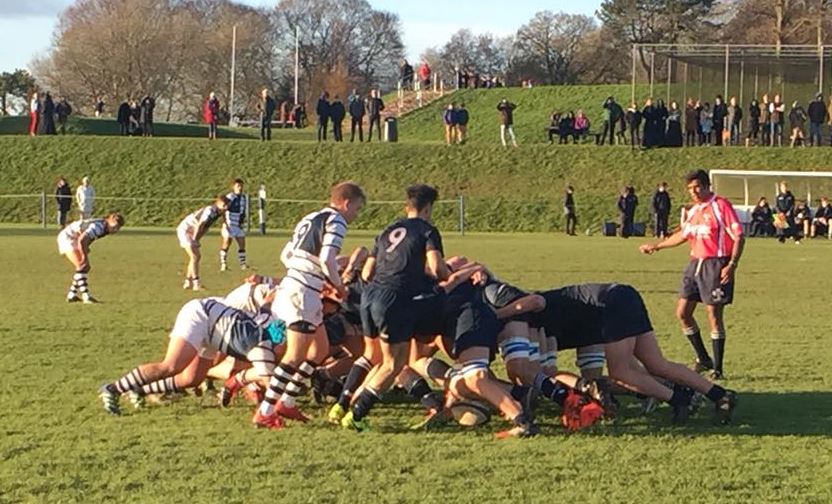
As usual it was absolutely freezing on the turf overlooking the town centre, despite the sun shining brightly on the south facing slopes; whether its cross country or rugby, I have rarely known that venue to offer anything but testing conditions. But on this occasion I could not quarrel or carp as the sport (from all of the assorted age groups) was splendid, the company good and the hot chocolate at the pavilion most welcome. Thank you MC for splendid hospitality and well-judged, friendly rivalry all round. After all, that’s what school days should be memorable for.
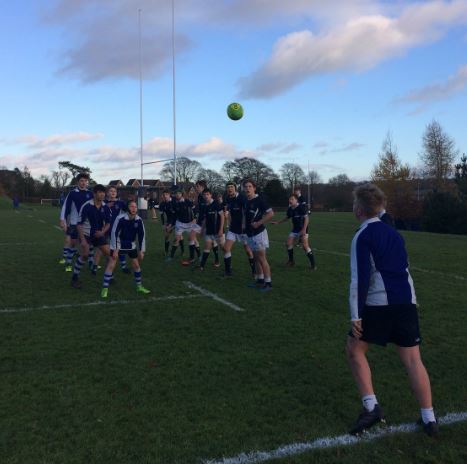
It wasn’t just the Rugby Teams that were out representing Salisbury in top level sport though. For the third year running Pat Griffey took BWS Cross Country teams at both Junior (Year 7&8) and Intermediate (Year 9&10) to compete in the ESAA national Cup Finals on Saturday, with this year’s races taking place at Sevenoaks School. The six boys in each of those teams have won through against local opposition and then finished in the top three in their regional finals. This weekend they ended up in 7th and 23rd place nationally – quite something (yet again) for one school to achieve, and a huge vote of confidence in what the PE staff generally and Mr Griffey in particular have achieved. We should all be very proud.
A fine day out then – meteorologically, in terms of team spirit and with regard to sporting spirit and traditions. Well done, all of you!
SDS
Last week saw the launch of the BWS Foundation website, a significant milestone in establishing this important body for the school in future years. This really is a piece of future proofing for BWS; in setting it up now as a legal entity we are planning for decade ahead rather than just for the next couple of years, which is unusual for developments in education. All too often in schools developments in policy and practice are dictated and moderated by the short term electoral cycle and an economic sine curve of slightly longer duration. When I draw out financial projections for school budgets I feel constrained by the Rumsfeldian unknowns – so much so that 5 years projections are a fiction, and even plotting our path 3 years ahead is bedevilled by funding pitfalls. The Foundation, on the other hand, is about setting out what we are aiming to do over the next decade and more. Divorced from state funding, this will be a support for the school whose impact should grow as the years pass. Engaging with BWS alumni, encouraging access for bright boys from across the full socio-economic range and (in due course) offering support to the school with major capital projects, there are a whole range of critical jobs to be done. We are on our way at last.

We are hugely fortunate to have on board a committed and highly capable set of trustees who have an exceptional set of skills to help us do the job. Led by Colin Sharman (BWS 1954-61) the board of trustees have expertise in finance, law, media, education and development projects which will be brought to bear for the benefit of the BWS community. Justin Moore (BWS Bursar) and will be present at trustee meetings so that the board has its finger on the pulse of the school and, though the Foundation is an independent charity its work will focus in on the needs of the school and its boys in a way that should make a real difference in the future. The Foundation’s aims are threefold. Firstly to build the strongest sense of community among both the current boys and parents and the BWS worldwide diaspora, by organising frequent events in and outside school. This started with last year’s Founder’s Day and has continued with a London Reunion, an event on a Cruise Ship and an evening lecture just last week.
There are more planned – wine tasting, a Christmas meal and drinks reception, a visit to a London brewery(!), further lectures and a big event in the summer to coincide with both Wimbledon and the World Cup. Secondly, we want to build resources through the foundation to encourage applications from boys irrespective of background and dispel any impression that BWS is ‘only for those who can afford it’. Finally, in due course, we hope that the Foundation will be able to help to bolster our bids for further development on site. We have more to do, and we are in the process of building a master plan for the whole site for the coming years. The Foundation will make that plan more than just a wish list – and in doing so it will hopefully further strengthen the school’s status against any future threats.
That’s all very exciting, but of course there is a lot of hard work to come. We have to plan carefully and realistically, build the digital footprint and connectivity of the Foundation and ensure communication is up to the job. The relationship with the current Old Wordsworthian’s Association needs to be worked out so that we do not lose touch with its existing membership as the Foundation takes precedence. The BWS Foundation will be for both the present and the future, and it feels really good to be able to plan something which is (a) under our control and (b) not so subject to the vagaries of what is happening beyond the school gates. Just for once, we really are the masters of our own destiny.
SDS
…or a rather large one in the case of one premier league ground this Saturday, where, given the impending incursion of an international break remembrance was marked before kick-off. At stadiums across the country the massed ranks fell quiet at the referee’s whistle as the minute’s silence starts. It always seems unexpected, outlandish even to me at first; what was a few instants ago a seething mass of humanity intent on self-serving busyness becomes a homogeneous whole. In this case two soldiers (or perhaps actors) stood to attention in the centre circle propping up an enormous ceramic poppy, fully six feet in diameter. You can imagine what it’s like if you’re there. You suddenly become acutely conscious of the smallest things in life. The drip on the end of your nose and the tickle at the back of your throat that threatens to erupt into a cough. A muttered conversation persists behind you followed by the inevitable ‘sshhh’ which seems to make it worse. Then, the momentum of quietness becomes firm and your mind starts to drift – what was that train time again, Tuesday – what was happening on Tuesday…? The whistle blows, the ether is shattered, the stage is cleared rapidly and completely in front of the stands and life resumes.

And that, in microcosm, is what happens every November across the UK and further afield. Something artificial is created and enacted so as to make the bridge to the past become real again. But does it do the job? I read some research in the national media this week that suggested, on the basis of a large survey, that somewhere around a third of young people (ie under 21 year olds) feel too self-conscious to wear a poppy, principally because in their opinion the symbol is a glorification of war. That’s very sad, but perhaps understandable. It is an awfully long time since war has imposed itself forcibly on the consciousness of the nation, and still longer since the bulk of the British people have actually faced any suffering because of conflict. British Forces’ engagement overseas has never been more visible but, in some ways, has never been more remote. Digital images of fighting always seem to be happening to someone else somewhere else, unless (of course) you happen to be a part of a regimental family in a port, airfield or barracks town. Add to that the devaluing of the word ‘war’, as in the ‘War on Terror’, the ‘War on Drugs’ and even ‘War on Want’. What are Generation X and their successors to make of all of that, when language lets them down? There’s even the politicisation of the poppy in these sadly divisive times, so national figures are rounded on for not displaying their poppy and footballers are not permitted to wear the symbol of remembrance because it is deemed to be a political gesture. How sad is that?

The British Legion gets it just about right with a combination of common sense and compassion. “The poppy honours all those who have sacrificed their lives to protect the freedoms that we enjoy today, and so the decision to wear it must be a matter of personal choice. If the poppy became compulsory, it would lose its meaning and significance. We are thankful for every poppy worn, but we would never insist upon it. To do so would be contrary to the spirit of remembrance and all that the poppy stands for”.
None of us, young or old, have to wear poppies whatever the trolls and critics on social media might say. The choice that we make is our own, individually, and even though I am really pleased when I see young people making that choice I make no judgement of anyone in any case. I don’t wear a poppy because of self-indulgence, because of personal loss or a particularly strong connection with the armed forces or because of misplaced nostalgia. I choose to do so to because I want to show my gratitude for those who have put their lives on the line for the protection of the ideas of freedom of thought and democracy. The faintly ridiculous image of two make-believe soldiers holding a giant flower up in the centre of one of those commercial cathedrals for the modern age is not necessarily something that will appeal to all – but the symbolism is powerful, and the principle that it represents make the spectacle worthwhile for all of us, whether we are football fans or not.
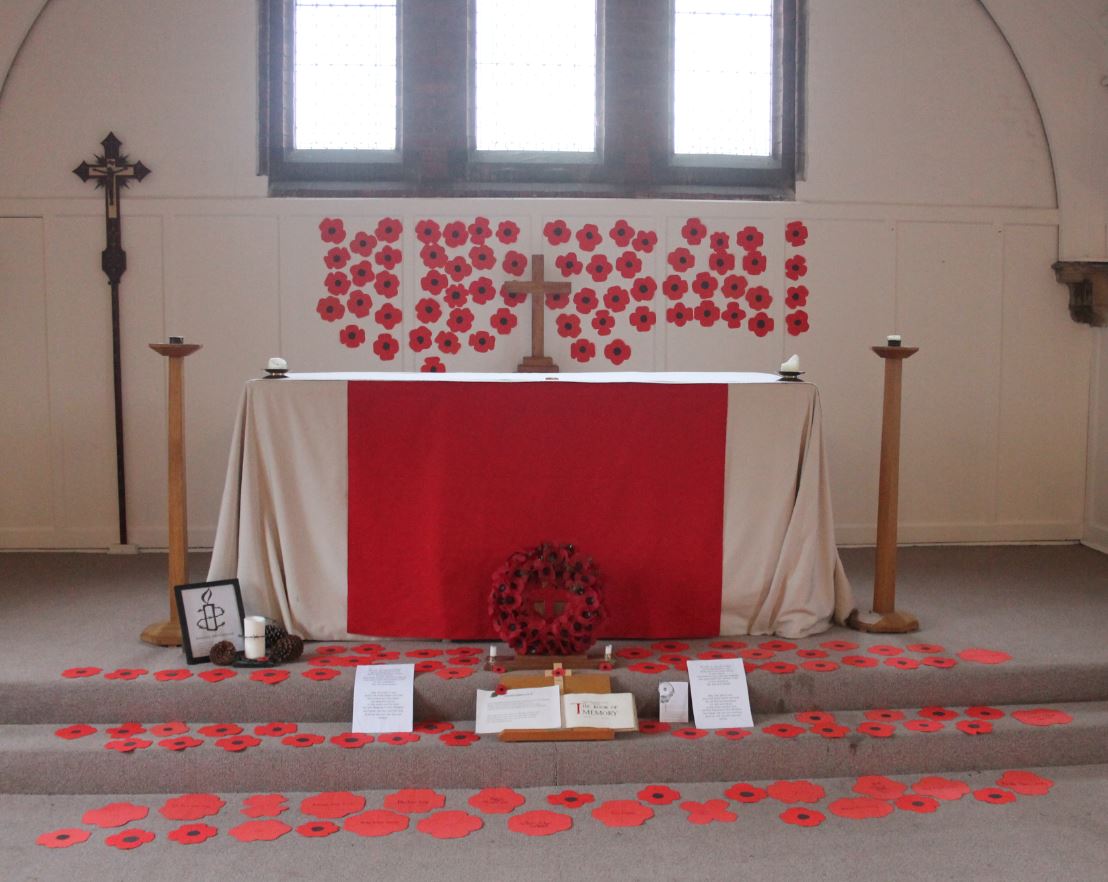
SDS
Neither of these letters have been sent to the national press. Perhaps they should be? Let me know what you think...?!
Sir,
David Lammy's investigative work is essential and his subsequent aim (together with 100 of his MP colleagues) is unerring. The figures revealed about recruitment to Oxford and Cambridge are stark, and should rack the consciences of all of us with an interest in securing excellence for youngsters. How can it be right for Britain to be so lop-sided when it comes to young people's provenance for our top two universities? How is it that so few secure places who have ethnic minority backgrounds? The answers to those questions are difficult for us all - whether we are parents, teachers or admissions tutors.
I vividly recall asking students to re-draw the map of Britain using different socio-economic indicators as a scale. The resulting distortions frequently made our familiar coastal outline almost unrecognisable. The same would currently be true of access to Oxbridge which, quite frankly, is a national embarrassment.
SDS
--------
Sir,
Both Oxford and Cambridge rightly say that they spend seven-figure sums annually on outreach and bursaries. That's commendable but it is also their duty, given their power, asset bases and influence - and given the fact that they are in receipt of public funds. What remains an enigma is the entry proportion from the top 5 or so public schools which seem still to manage to get 30% of every Year 13 cohort into these two elite institutions. The top grammars (which get comparable A level outcomes) do nothing like as well. Why is this I wonder? Isn't it time to have anonymised applications so that the conspiracy theorists can be stifled...?
SDS
It’s a devil of a job to keep youngsters reading books – and yes, I do mean books and not e-readers, kindles or similar species of non-paper based literature. There is just something about a book, the physicality, the tactile experience of finding the edge and then the new page opening in front of you. I have occasionally used a kindle and yes, they are great for train journeys but I still much prefer to have the inconvenience and mass of a book in my bag. It’s something I just can’t put my finger on, or perhaps it’s because I literally can put my fingers on (and into) a printed volume that I like it so much. The cost can be considerable, both in terms of the initial outlay and then the weight as I lug the thing around. This is particularly acute at the moment as I am working my way through Max Hastings’ ‘Nemesis’, the story of the Battle for Japan in WW2. Around 600 pages of close-typed history with all of the associated literary paraphernalia of a serious historian; try taking that through the airport and you really do know that you’ve opted for the paper version! You can imagine the puzzled looks of fellow Salisbury fans when I get such a weighty tome out to read at half time…

Of course there are the other pressures and temptation to fight off. The ubiquity of screen entertainment of various sorts competes wholly unfairly for our boys’ attention; the whole world lies in their hand in the form of a smartphone. Social media multiplies like bacteria to crowd out conversation and more meaningful interchange, and we (and they) only ever seem to get busier. Books and reading seem, in that set of circumstances, to be bound to become the poor relation. Yet it ain’t necessarily so; sensible management of those precious resources of time and energy at both school and home can mean that boys can enjoy the best of all worlds. That’s one of the main reasons that we have tightened up the rules for using electronic devices at school, to try to ensure that boys spend time on other things and learn to manage recreational screen time for themselves. Thus far there have been relatively few infringements of the new arrangements, and the frequency of problems is diminishing already as the rules bed in.

I was asked by a parent recently what advice I could give to deal with ‘Kevin’ (the metaphorical rather than a literal version!) who had suddenly evolved into being at home. I felt rather unnerved about advising – as would any parent – they are, after all, all different. Pragmatism and fairness are probably the most important words that I used, decide what battles you must win and ensure that you carry the day, but be prepared to give elsewhere. There is no definitive answer, but taking on a tutor group for the first time in many years has filled me with quite a bit of optimism. Not only are they reading, but they are doing more than I had anticipated. The ‘nominate a book a month’ campaign is being superseded by some boys who are consuming literature at a prodigious rate. Perhaps there is hope after all for the book, and perhaps what I am seeing is what lies behind the recent national resurgence in sales in the written (and printed) word. Long may it continue…
SDS
There can be few places in the British Isles where it has been more important to think about leadership than this, and few better places to learn about the difference that leadership can make. My membership of the Headmasters' and Headmistresses' Conference has brought me to the capital of Northern Ireland for two days at the beginning of this week to listen to speeches, attend seminars and network with colleagues from the independent sector. Two days out of school to think more broadly and pick others' brains about what makes a great school better still.
Belfast is thriving. Pride in the place shines out in a snatched conversation with a taxi driver en route to the hotel. He's hugely proud of his city, he says, proud of the progress that has been made since the signing of the Good Friday Agreement, proud of the renewal of the Queen's Island and the Titanic Quarter, proud of the city's heritage and proud of the people. A great advert for a city humming with life, and what a contrast to the scenes of tragedy that I remember seeing so clearly on the TV screen in my youth.

Aptly the first lecture is given by Jonathan Powell, Chief of Staff for Tony Blair and one of the key negotiators during the Irish rapprochement. The view that he gives on the importance of both leadership and mediation is both sobering and invigorating. The need to take risks, the need for mutual trust, the essential role of personal integrity and the fact that leaders need to deal with everyone who is party to a negotiation - even those that they don't get on with. All of this played a part in bringing peace to the Province, and the effects are what I see every time I step beyond my hotel; prosperity, trade, investment and life. Powell's account immerses us in the intensity of the past as much as it underpins the present. Despite the complexities of politics and sectarian division here, I feel that I am starting to grasp where Belfast is - and where it is going next.
It occurs to me that those lessons of dealing with apparently irreconcilable differences are some of the things that we are trying so hard to instil in youngsters in school. Yes, the exam grades are crucial and the university courses can determine the start of a career, but those 'softer' skills may be the ones that make all the difference in the end. We need to work hard at developing those, through creating leadership opportunities at all levels in school and by building the richness of our extra-curricular provision. Ours is the job of nurturing the leaders and negotiators of tomorrow's world...
SDS
Very few schools in this country have the enormous privilege of being able to meet together in a Cathedral for major events. Bishop’s is one of those lucky few. Most of the others train choristers and have done so for centuries, so that the Cathedral Close has become their ecological niche. The symbiosis of cathedral and choir is lived out on a day-by-day basis in the various medieval Closes across England, Norwich, Gloucester, Worcester, Wells, Westminster. In addition to their intimate association with a cathedral church, almost all of those schools share something else in common – parents have to pay from taxed income for their children to attend. That’s something that none of us – staff, governors, parents or boys – should take for granted. It’s very unusual, special, almost unique.

But that right is accompanied by responsibility. We all need to play our part in creating and maintaining ethos and sense of place if it is to be maintained. That’s very clear, and it’s something that we all have to work at year in, year out. Whatever your religious affiliation everyone has a part to play in ensuring that we do things right. Our guest speaker this year (Colonel Dan Cheesman of the Royal Marines and ex BWS) talked very clearly about values and the responsibility of the individual to both themselves, their group of comrades and the Regiment. We are unlikely to be tested as he has been in Afghanistan, but the principles are clearly transferable. A special group of people creates synergy, togetherness and spirit, but without everyone on board it can be lost all too easily.
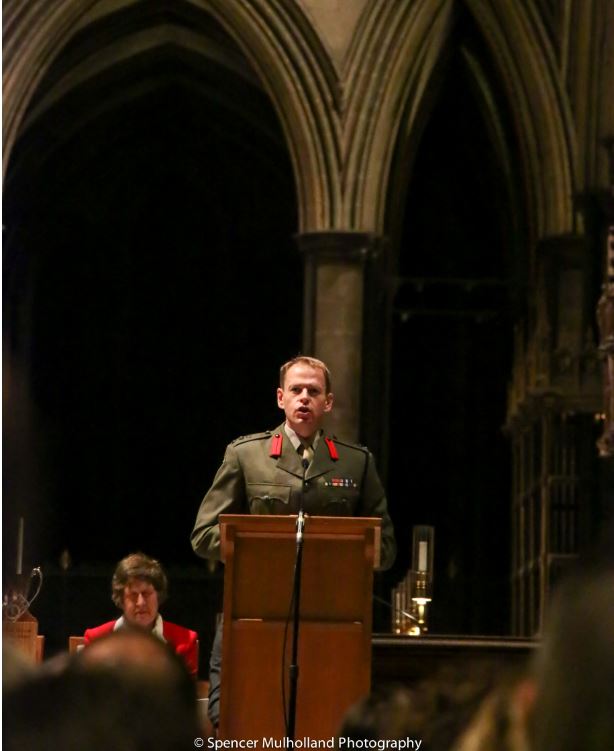
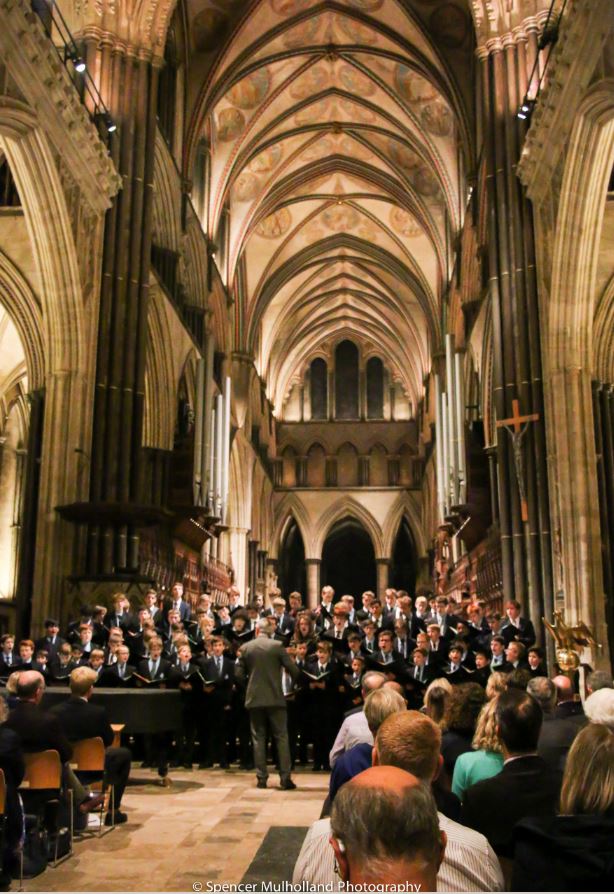
Prize Giving was a fantastic evening. Lovely music, an engaging speaker, lots to celebrate and even the Head didn’t bang on for too long! If only all of our boys had managed self-control and discipline right to the very end then we would all have had an event to look back on with unqualified pleasure. Rights are all too often taken for granted – at the very same time as responsibilities are neglected. We will be doing everything that we can to remind those boys of their duty in school, and it is great to know that the same message will be echoed across the dinner table across South Wiltshire and West Hampshire in the future…
SDS
Once upon a time there was a halcyon world where everyone understood how their kids were doing at school. You probably remember it; A*-G at GCSE, A*-E beyond 16, we all got it and there was a shared understanding of what it meant for examinees. Just like measuring height and weight, hot or cold the scale and the numbers translated into a common currency that was straightforward to interpret for all.
Except at wasn't quite like that then, and it certainly isn't like that now. In the past that allegedly well tried and tested system was shot - devalued by the ravages of two decades of grade inflation and propped up by a peculiar species of denial by educational groupthink. We all spent the year bleating about how poorly assessment was handled and then, come August, politicians and Heads would feel compelled to re-validate another year's enterprise. Things are changing now, and almost certainly for the better despite the fact that making sense of this summer's exam results is more of a science than an art.
Parents of youngsters in Year 11 have to grapple with grades 1-9 in Maths and English, EBacc, Progress 8 and passes that are either 'standard' or 'strong'. Older students don't escape, as A levels pass through the one-way portal leading to linearity. The upside is that the relentless upward drift of grades seems to have ended, the hegemony of coursework and modules has been broken and because of that exam grades (in whatever form) should become more reliable as a measure of ability. That's good for everyone - parents, students, teachers, employers and universities. Boys and girls in Salisbury collectively did very well this summer without needing the artificial effect of grade inflation, even though some aspects of their performance might need some translation as we all become used to a new language in the world of examinations...
SDS
It seems an absolute age since I first started to write this column each Sunday evening. Just think what has happened since 4 October last year – both in the UK and worldwide, let alone in and around the Bishop’s end of things. It feels as though the world has changed significantly, and not necessarily for the better. I have given up predicting political outcomes as I have been consistently wrong on every occasion and this year the UK has been on the receiving end of a series of traumatic events, all set against the backdrop of EU negotiations which lurch from one extreme to another. Life within school has been comparatively tranquil as a contrast to all of that, but even here we have had to battle to come to terms with a punitive funding settlement and contemplate the threat of a funding settlement – a threat that is still unresolved. It is a wonder then that the school has emerged from all of that in good heart and stronger than ever. The outstanding sporting and musical successes of the year have done much to build the spirits and the emergence of the site, butterfly-like from the construction site chrysalis shows us all what is possible. The future looks promising – more boys than ever, more applicants, a Foundation rising to the challenge of linking with generations of BOBs and a Church Schools’ Inspection that endorses the school’s ethos and operation in every respect. That means that we can all bid farewell to the 2016-17 academic year in good heart with the next step the external exam results in August.
We will also be saying goodbye to a number of the teaching staff as they move on to promoted posts or to retirement. The longest serving leavers are Richard Ward (Physics Technician) and Jane Egginton (Biology), both of who have served the school for several decades in the Science Department with great distinction and will now retire. Also leaving the Physics Department are Katie Turnbull and Alan Murphy, who have been at Bishop’s since January 2015 and September 2016 respectively. Alan, who is Head of Department, is retiring and Katie is moving to a promoted post at SWGS. Ann Cullen is leaving BWS for retirement/world travel, after a couple of decades of strenuous effort keeping various parts of the BWS machine on the road (Careers, Sixth Form Office etc!). Kate Maclaren is moving to a post abroad (in the Middle East) after a sterling 15 years at BWS, leading the Art Department with consummate skill and energy. Terry Gilmour will take his Rugby expertise to Marlborough where he will undoubtedly achieve great things, though of course his real test will come in November when the newly commissioned ‘Gilmour Trophy’ will be contested in the 1st XV match between our two schools for the first time! Jose Torres is returning closer to his roots on the mainland of Europe as he takes up a teaching post in France; ten years at BWS, including the last 2 years leading the Spanish Department have demonstrated his linguistic strengths and a generation of boys have been inspired by his enthusiasm and drive in languages. Tom Churchill will migrate to the south west to join Millfield after a great 4 years at BWS – he leaves behind him one of the biggest and most successful Duke of Edinburgh Units in the South West of England; no doubt he, too, will be found on a touch line (or even refereeing?) at a rugby match in the autumn of 2017. Finally, Alex Cooper will be relocating to West London after 2 years of highly successful leadership of the Geography Department at BWS and Emma Richter will be moving to a permanent post at St Edmund’s School after a brief period with us in the History Department as maternity cover for Vicki Brennan. I will be very sorry to part company with all of these colleagues, both personally and professionally. They have all made a huge difference to the boys here at Bishop’s, and all can be proud of their achievements.
This is my last entry of the academic year. Yet again it is a Sunday evening and I am starting to wonder what the next week will hold in store, albeit a short one. I am sure that the holiday cannot come soon enough for the boys! Their feeling of elation and impending freedom will be palpable at 11.59am on Wednesday, and as a result the assembly is always a good thing to be a part of. For staff, the adrenaline literally drains away and, after a lunch on the lawn to bid farewell the community dissolves and flows away across Salisbury and the wider world. The summer beckons to all of us – so wherever you are bound in the next 6 weeks or so I wish you a fair wind and safe passage until we all return in September…
SDS
…or at least that’s what I thought as I ascended to the pulpit at 0959 on Saturday morning to welcome a large section of the school community to the Founder’s Day Service. The Cathedral seemed very full, the sunshine streamed through the windows of the nave and there was a feeling of lightness and life about the whole event which was great. That feeling of engagement, of levity and yet thoughtfulness was built still further by Stella Wood, Chaplain of Godolphin as she spoke about the view of Bishop’s from Milford Hill. She gave a very positive impression but also one which was firmly rooted in reality as she gave voice to the views of the girls of both Godolphin and SWGS as well as those of adults. The perspective from the back seat of the bus or the carriage of the Andover Train is rarely completely in accord with the ‘little geniuses’ picture from a section of the adult world. The truth, as ever, lies somewhere in the middle ground…wonderful stuff! An uplifting and thoughtful service was swiftly followed by most making their way back to school to join the Rugby stalwarts who had been unable to tear themselves away from the tension of Eden Park – although of course I could see very well from the pulpit that there was some surreptitious use of digital media going on in the seats below to keep abreast of the score, and that was among the VIPs at the front of the nave!
The sun shone back at school, the music was wonderful, the games were hotly contested and fun, the exhibitions memorable and the pared-down Macbeth most entertaining. We wanted this year to be different, with a wider variety of events carrying on through a longer programme and that is exactly what transpired. What was most encouraging I though was that for the first time the whole school community was mixed together and interacting with no barriers. The Carpenter Room Archives were just as busy as the Parents’ Association Fete, and there were lots and lots of busy boys entertaining our many guests in lots of very engaging ways. If there is one thing that all boys are good at it is exactly that! Apparently John Wordsworth used to visit the playground of his school almost every day in the early period of the school’s history, presumably because he was entertained by the life and vibrancy of the generation of boys who had joined the new school. If we can, through the new model for Founder’s Day, recapture that spirit of engagement and vibrancy then we will have achieved something really quite special. As it is, Founder’s Day 2017 was an excellent start on a new path – and yes, I think that Bishop JW would have been pleased, proud and really quite excited to see his school in such fine form!
SDS
Last Thursday’s get together of Bishop’s Old Boys (BOBs) in London was a really good event. The setting for the drinks reception was quite extraordinary as it was in the Library of the Reform Club on Pall Mall, courtesy of Colin Sharman (BOB). If you haven’t done so already then do have a look at the picture posted on twitter of the ornate interior. Sir Charles Barry’s Italianate architectural masterpiece provided a splendid backdrop for a great event, with around 100 BOBs gathering in the library to meet, chat and enjoy refreshments as the heat of the early evening faded. I met ex BWS pupils from every one of the past 5 decades, including a great many who had been at the school during my tenure. It’s always fascinating to see them again after some years and hear what they have done, whether their journey through life has followed a predictable route or whether they have taken turns that no-one could have foretold.
I took the opportunity to remind everyone at the event what we all had to celebrate by being a part of the school. Just 5% of children, 1 in 20, are fortunate enough to attend a grammar school in 21st century Britain, and given recent political events that is now unlikely to change in the future. But there’s more, much more. Bishop’s is the only state school that I know of to be located within a cathedral close. BWS has forged and is continuing to build a regional and national reputation for academic results, for sport, for music, for science and maths, for debating and public speaking and so on. We punch well above our weight already, and with more boys coming to the school in the future that impact is only going to grow. Bishop’s is a powerhouse for the professions, via a first rate record in university entrance – doctors, scientists, authors, playwrights, actors, musicians, lawyers, economists, businessmen, linguists, academics, diplomats. Our alumni continue to do us proud and to achieve great things as the leaders of tomorrow. In short, we try to provide a foundation for future success for our boys and the London events gave a big group of alumni the chance to rediscover their school and revisit the reasons why being a BOB is so special.
Thank you to everyone who came along. Huge thanks to Lord Sharman and to Stephanie Swann (our Development Office Lead) for making it happen, and roll on Founder’s Day which is the next chance for BOBs to get together. All we need to create the perfect morning will be a thumping win for the Lions at Eden Park – but that, sadly, is beyond the remit of the BWS Development Office!
SDS
Just over a week ago I had the phone call notifying me of an impending inspection. The rush of emotions that follows is probably quite unique to the educational world in general and Planet Head in particular; adrenalin, some excitement balanced by trepidation and also the realisation that there would be quite a bit to do. This was the SIAMS (Statutory Inspection of Anglican and Methodist Schools) version rather than Ofsted, but even so the prospect of having an inspector in school for two days is still one that will test any school, and Bishop’s is not an exception to that rule. Though there is a detailed and intensive programme drawn up for the two days in reality the entire school is on show, and in this case the irony was that though I drew out the schedule for what would happen when I then had to disappear for the best part of three days. Bishop’s was inspected as a largely Head-free zone! No matter – the important people remained in place. Graham Lloyd, Judith Bersweden and Natalie Steer and the RS Department played their parts splendidly, assisted by a whole team of staff, governors and parents. The boys, as ever, were brilliant and the inspection seems to have gone well. The draft report should be with us for fact-checking within two weeks or so, and I would like to say a huge thank-you to everyone who did their bit.
Self-evidently events like that tend to dominate the agenda within school, and that I am sure was the case on last Tuesday and Wednesday. But by Thursday morning those rather parochial concerns had been overwhelmed by the events in West London. It seems that one after another, dreadful tragedies are assailing our nation and testing our resolve to stay strong and pull together. I cannot remember a time in the past when we have had successive school weeks punctuated by minutes of remembrance where Salisbury and the world beyond fall silent. Britain is resilient, something that I felt this last weekend as I walked through the West End on a balmy late Saturday evening through roads flooded with vibrancy and youth. Our society is strong, but it is being tested and we need to do the very best that we can to prepare the boys in our care to cope with that in the future. They, just like their predecessors will need to have the empathy, the tolerance and faith to defend values that need to be preserved – but they will also need the determination to fight for justice too, for everyone in society.
SDS
Members of the teaching profession generally and quite rightly skirt around political issues unless they are actually teaching Government and Politics, in which case a completely dispassionate view is absolutely critical. That doesn’t stop me commenting on what would otherwise be the proverbial elephant in the room so shortly after the latest general election has thrown the country into chaos. As I sit at the dining room table on Sunday morning I wonder, yet again, what is going to happen now – and this is so soon after an extraordinary presidential vote in the States and a divisive referendum in the UK not so long ago. I have simply given up trying to predict outcomes as I have been wrong repeatedly. Perhaps I am completely out of step, or perhaps the political landscape is one where uncertainty and nuance confounds common sense at every step. I simply don’t know. Goodness knows what youngsters make of the political climate; those that I have spoken to are just as much at a loss as me.
What I am sure of is that our society is deeply divided by both party politics and also by the start of our divorce from the EU. Matters are made worse by a failure in leadership. I know only too well what’s it’s like to be the captain of the ship when the weather gets stormy and the wind is against you. It’s hard, and you need good judgement and confidence about the course ahead to pull through. You need to listen, you need to engage with as many people as you can and you need to try to involve those others through consultation before decisions are made. The future course needs to be aimed at the greater good; policy that has its foundation in narrow self-interest will be fatally flawed and will not last. That’s true in school, and I am sure that schools are microcosms of our society and country. We need to aim to do better.
What is certain is that we enter the next parliament in a weak position nationally. Despite the euphoria over the Labour Party’s campaign performance, the fact remains that they have just lost a third election in a row. Despite the fact that the Conservatives will probably govern for some time, they will only do so as a minority administration with the support of a socially conservative group many of whose policies are unpalatable to the majority of the population in mainland UK. Two party politics appears to be back with a vengeance. Oh dear.
The one bright spot emerging from the election is the greater engagement of young people in the electoral process. Let’s face it, the generations leaving school and higher education at present will have a hard time of it whichever way the cake is cut. Tuition fees, stagflation, property prices and robotics are all threats for their future world which we need to plan for. They do need a message of hope and a feeling that my generation is working hard to make things better. Until we have a clearer sense of direction and more consensus from our elected representatives that looks increasingly unlikely.
SDS
We are taking care of a long overdue job at Bishop’s. We are establishing a foundation for the school, a charitable body that will work with us in the future, both supporting individual boys and also helping the school with specific projects. Many schools have such an arrangement; we have not, so this will close the gap. To help us do the job we have enlisted the support of a group of potential trustees, and we have the great good fortune to have Lord Colin Sharman (BOB) as our standard bearer. These are exciting times.
The latest building project is not the last. We will need to complete a number of projects in the future – the expansion of the Science Block, the redevelopment of the Dining Hall, the removal of the remaining temporary buildings on the main site are at the top of the list. Those will take resources, and the BWS Foundation will have a key role in helping the school to drive our work forward in this respect. But it’s not all about bricks and mortar, there are also boys to consider. One of the barriers which probably stops boys from more challenging circumstances applying to BWS is the perception of expense; breadth of opportunity does bring costs. Uniform, transport to and from school, music lessons, sports equipment, trips, Duke of Edinburgh, the list is a long and impressive one but also one which might mean that our school is perceived as unaffordable for some. It’s very difficult to contemplate the additional costs of excellence in education when money is tight, so another intention for the Foundation is to offer bursaries to boys and parents who would otherwise not envisage applying to the grammar school. Maybe, just maybe, this might be another way to help us to ensure that Bishop’s does what grammars have always been intended to do – provide a ladder for boys to climb towards fine quality university education and careers, whatever their starting point may be.
We need as many alumni and supporters of the school to be at our launch event, a drinks reception at a prestigious venue in St James’ in the West End on 22 June 2017, 7-9pm. To receive a personal (free!) invitation, please email our new Alumni Development Department: alumni@bws.wilts.sch.uk or call 07732 105 009. Please do come along and help us to get this initiative on the road!
SDS
…at least that is what it is supposed to do on the morning of the Salisbury Mayor Making. This year it did, though the weather is not always so kind. Nevertheless there is something splendid about the ceremony, involving as it does the full panoply of local dignitaries in a procession through streets closed to the tourist traffic. The Charter Trustees resplendent in red robes, the local judiciary, representatives of the armed and emergency services, politicians and visiting mayors from twin towns across Europe and across the pond. Though Thomas Hardy was writing about Melchester a century ago, both street scene and the church bring his world back to life. Agreed, the annual outing for the city councillors to St Thomas’ Church is not perhaps the most lively event to attend, but I always feel the hand of history is at the church door on that morning. On Saturday the bells rang and the sun streamed in through the stained glass as the new mayor took his oath of office. Wonderful stuff!

Later this summer there is another event that the weather should be good for – Founder’s Day this year falls on Saturday 8 July. As usual, the service will take place at 10am, and this year the guest speaker will be Stella Wood, the Chaplain of Godolphin School. There will be difference though. Before the event we will be screening the match between the Lions and All Blacks from Eden Park, Auckland; this will be the last match of the 2017 Lions Tour, and we are hoping that a large number of BWS alumni will come and then stay for the rest of the day too. After the service there will be a busy day of activities of all sorts, centring on the marquee in No 11 garden and including tours of the new teaching block. It should be a great day – one that draws the broadest possible cross section of the school community together, including our pupils and parents who are due to arrive in September this year. If the sun shines it will add zest to what should be a fantastic day.
SDS
Last week was remarkable for two musical events. On Tuesday, our return from the May bank holiday Monday was marked by the visit of a team of staff from the BBC Singers, the professional chamber choir of the BBC. Led by Edward Price, our guests spent the entire day with the BWS Choir doing intensive preparation for the Joint Choral Concert which was due on Saturday evening. One after another, the professionals’ exacting musicianship, energy and infectious enthusiasm was turned to Mozart, Vivaldi and Rutter to wonderful effect. The day culminated with an informal concert in the Chapel with an enthralled audience of staff and parents treated to an extraordinary experience of the Choir at close quarters. So often our boys sing in wide open spaces, in churches, cathedrals and grand halls. This was something special – twenty minutes of sublime musicality from boys who had been inspired both by Chris Fay’s hard work and then the sharpening of the intensive drilling and concentration. I will remember that for a long time, as will all the others who were lucky enough to be present.
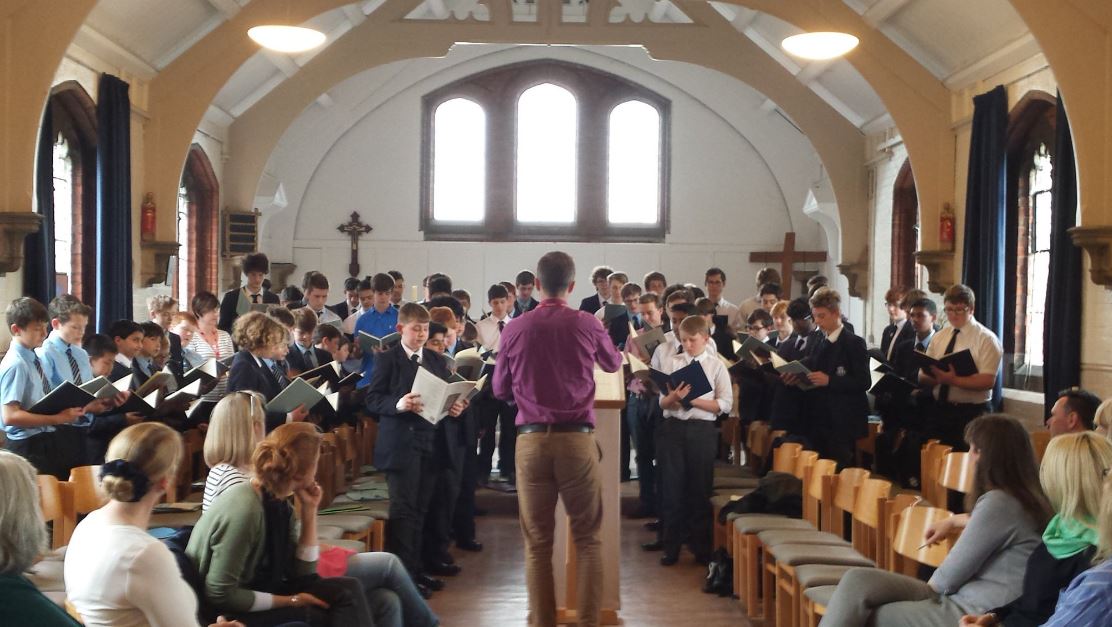
And so to the concert. The unavailability of the Cathedral meant that Salisbury City Hall was the venue; what we lost in atmosphere and architecture we gained from the changed acoustic and the fact that all of the audience could both hear and see the performers throughout – there are limitations to the medieval design concept after all! From the very start it was obvious that this was going to be an absolute pleasure, and so it proved, whether that was the joint choral blockbusters of Zadok or Gloria, or the smaller scale pieces performed by the choral section of both schools. Somewhere north of 200 singers, a full orchestra and some superb (and very brave!) student soloists. The hall was full, and so it should be, as we all have so much to be proud of in the strength, vitality and pure excellence of the music departments in both of Salisbury’s grammar schools. At the end, when Cum Sanctu Spirito finished a voice high in the auditorium shouted an emphatic and loud ‘Bravo!’. Well said, I thought, well said – and wow!
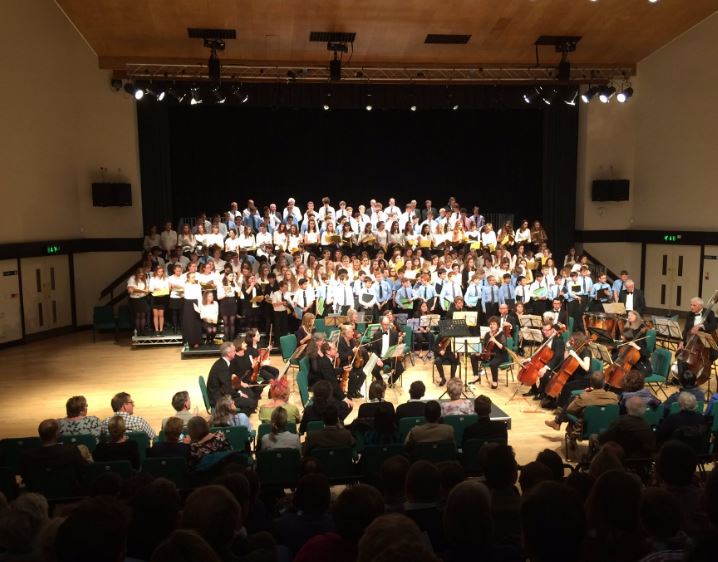
SDS
We have reached the time of year when, as a teacher, you feel that though you can do a little more to tweak the rudder the course for the boys is now set. With boys of course though the direction of travel is firmly established the speed of movement is adjustable; with many there is a perceptible acceleration as the first exams approach. That is where we are now with Years 11 and 12, as the official ‘last day’ for the Year 11 boys is this Friday. The last time, for a while, that they will all be in school together (save the core GCSE days) will be marked by some celebratory activities and a lunchtime bar-b-q which invariably goes down well. I wish them all the luck in the world, and I am sure that they will do us all proud.
Year 12 face a different type of challenge with the remainder of the AS modules, a species which will no longer exist after this summer season. Their passing will be mourned by some as the bite-sized exams offered the chance for students to learn a bit at a time, with compartmentalised knowledge enabling performance to rise and resits offering a further insurance policy for the academically challenged, the slow starters and those who had a bad day at the office. The loss of AS will be compensated for by the advent of the internal summer exam, with the major plus being a significant gain in both teaching time and time for other activities towards the back end of the summer term. Back to the future for those of us who did our A levels in the halcyon days of pre-2000. Year 13 face A level papers after the half term break.
Whichever stage your son is at I wish him luck, a cool head and a following wind on the day.
SDS
It will probably not have escaped your notice that there was an away day for a significant section of the populace of Salisbury last Wednesday, as the Bishop’s 1st XV Rugby Team took on Warwick School in the national final of the NatWest Schools’ Cup at Twickenham. Yes, Twickenham. Just imagine that as a schoolboy player, trotting out down the same tunnel as the England Team when they go out to face the might of international adversaries and running out onto the same turf as role models, past and present. As it says on the school twitter feed, what a day for everyone associated with the school. A day to savour and remember, a day to be carried along on and be intoxicated by a wave of emotion and a day for the school to be seen at its very best.


And that is what happened; the 600+ boys in the stands were an absolute credit to us all and the boys on the pitch played with such bravery, such resilience and such passion that it took your breath away – if it is possible for your breath to be removed while shouting ‘Up The Bells’ that is! Even the Bishop’s Old Boys were super-enthusiastic and (reasonably) well behaved. The day had everything as it really did pull the whole school community together as one and showed just what a privilege it is to work here. A real sense of pride surged through everyone who witnessed Terry Gilmour’s boys give their all on the pitch.
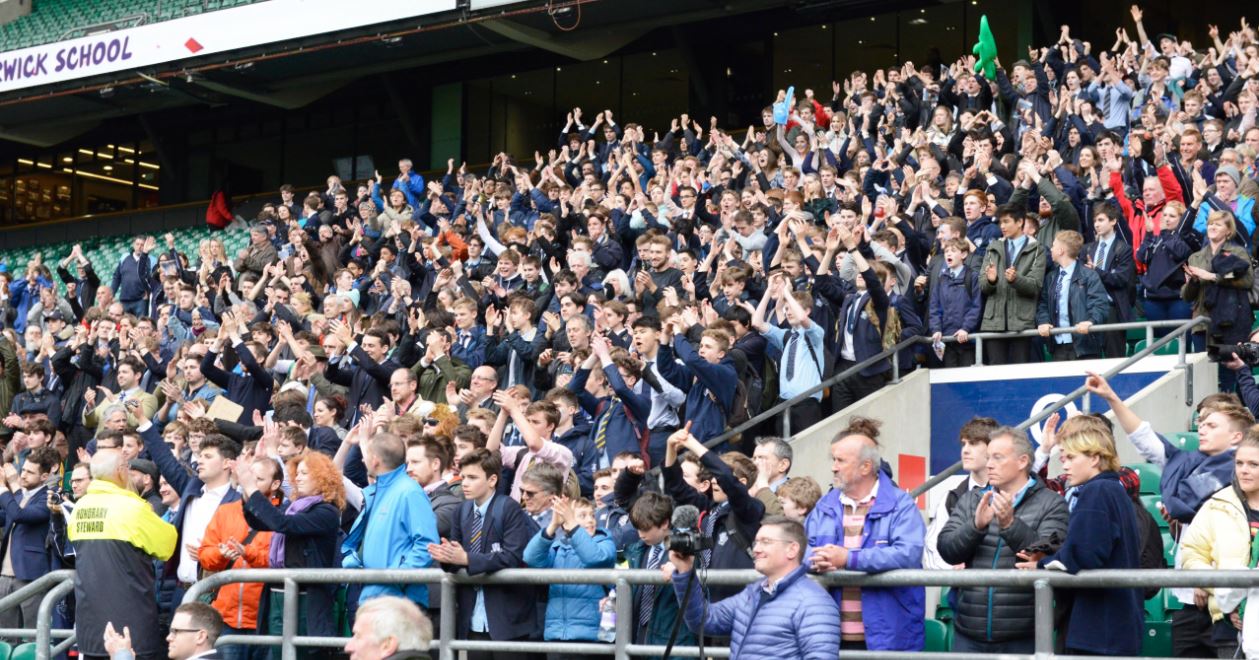
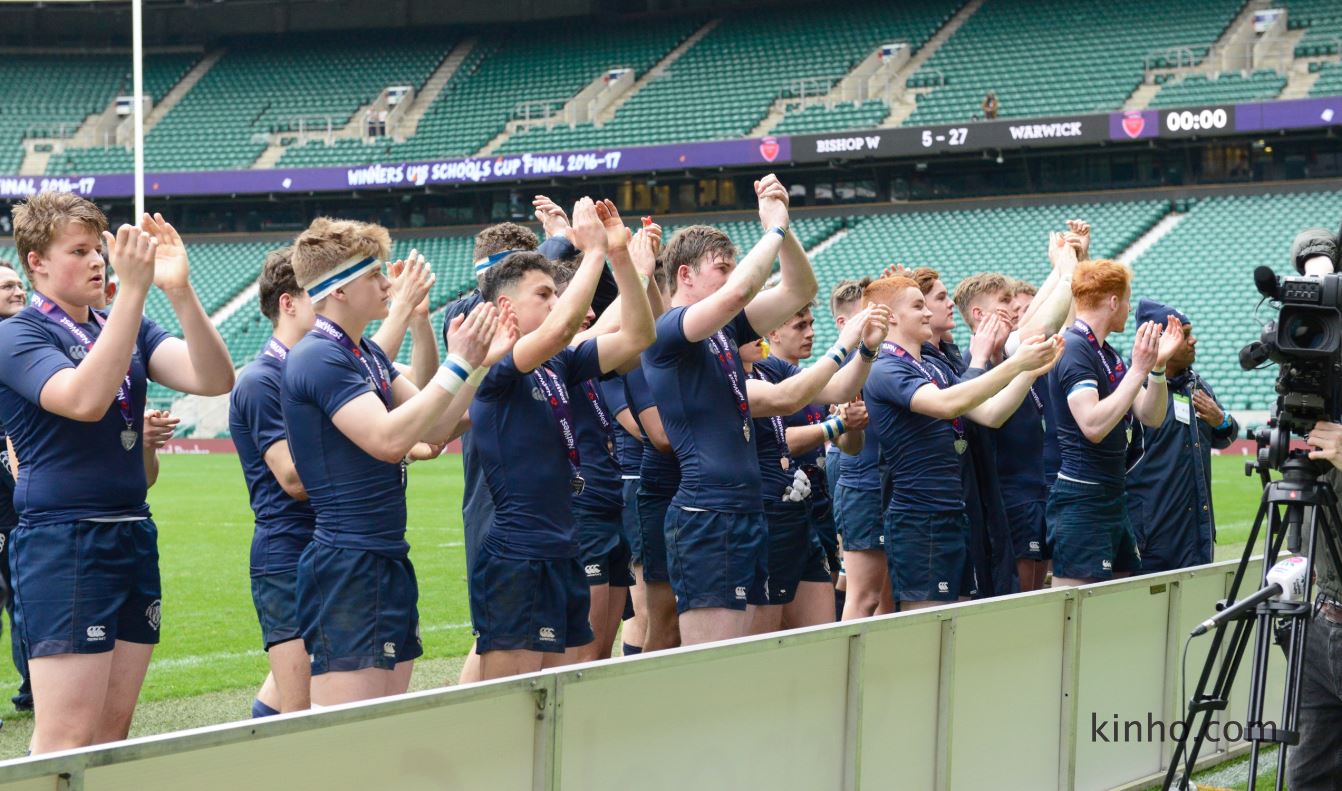
But while I was enthralled by the match I had another, broader, view that troubled me. There was the supreme irony of the fact that on the very day that our elite players were in a national final at Rugby HQ their parents had received a letter telling them that amongst many other cutbacks, A level PE was to be a victim. Such is the toxic nature of education funding at present. And then there is poignancy. Looking down the programme details, the last state school to make the national cup final did so more than a decade ago. For more than the last 10 years not only has the winner been a private school, but the finals have been the fiefdom of the fee-paying sector and its almost unlimited resources. I can understand why that is, and the last thing I want to do is to denigrate the super sides that have graced the finals over the years.
But I found myself wondering whether I was watching one of the last state school sides to ever contest at this level, as the playing fields are now so unevenly biased against sides from the maintained sector. What I witnessed on Wednesday last was magnificent, and I am sure that my staff and boys will do their best to go one better next year, but we have to fight (and win) even harder battles off the pitch if this is to happen.
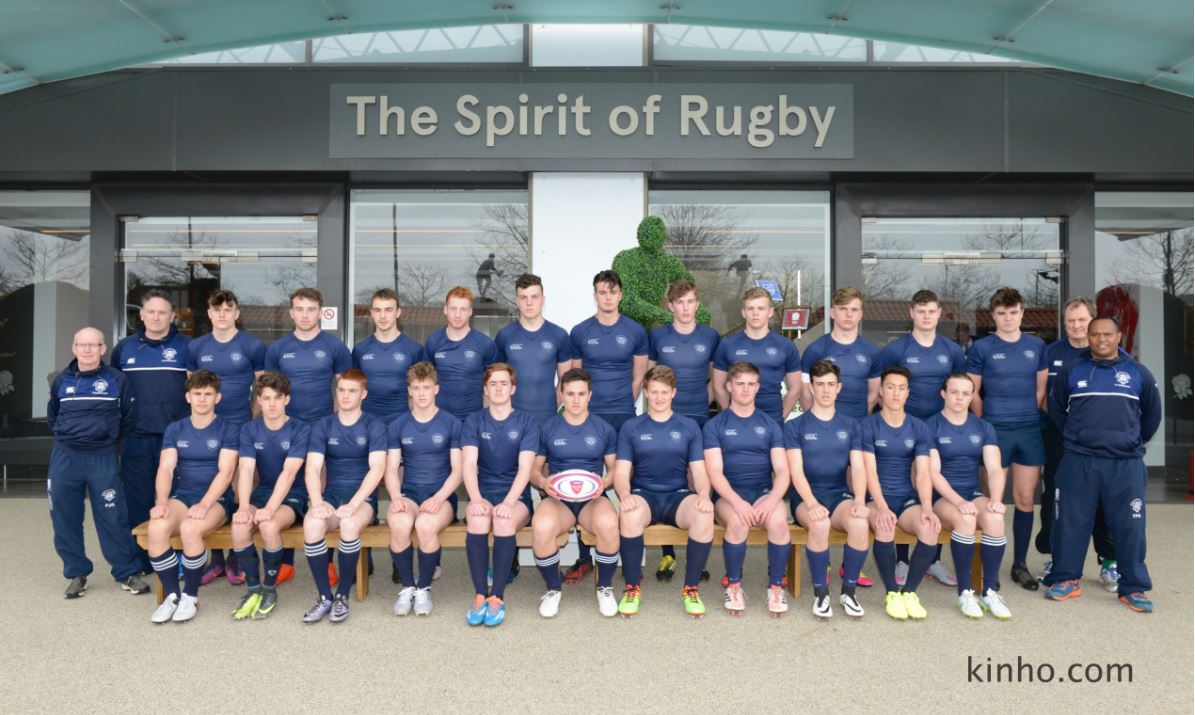
SDS
One of the advantages of having older children is that (allegedly) you can get them to help out by clearing some of the domestic chores. That’s the theory anyway, the reality seems at times to be rather removed from that utopian world where things like that happen on a routine basis. But, just occasionally, the planets become aligned and wonderful things happen. Take Mother’s Day, for example. Suddenly a house full of kidults becomes a microcosm of that halcyon world where jobs are done without nagging, meals are cooked, washing up is done and grass is cut before there is time to exert the usual necessary pressure. Just for 24 hours, but what a 24 hours that is! My faith in human nature and the fundamental basis of developmental psychology both restored at once…
There are some other aspects of human psychological development which are swinging into action at present across both school and home, I’m sure. The exam season is almost upon us; Year 10 exams take place between now and the end of term and I have had to point out to a number of my mentees (both Year 11 and 12) that there are just 5 school weeks until the start of the GCSE and AS examinations. Most academic departments are completing the teaching of new materials very shortly, and revision will cut in thereafter. Now is the time for boys to get serious, to get the business done so that success becomes a certainty rather than a mere possibility. For the majority of our boys that is par for the course, but some are not quite so far along the developmental path and so find the revision process a real trial. However much help they need, I know that my colleagues will do a super job encouraging and cajoling your son to give of his best.
Meanwhile, it will not have escaped your notice that the NFF consultation closed mid-way through last week. We have not been told when to expect an outcome, but in the meantime we have to deal with the more routine (but equally serious) cost pressures that are facing all schools at present. In common with most, we are having to cut, and more information will be issued to parents before the end of this term. What we have to try to do is to cut costs but minimise damage so that we can all get on with what matters most – helping our boys to develop, to mature and to excel while they are in our care.
Finally – and I never thought I would write this anywhere – Up The Bells, and see you at Twickenham!
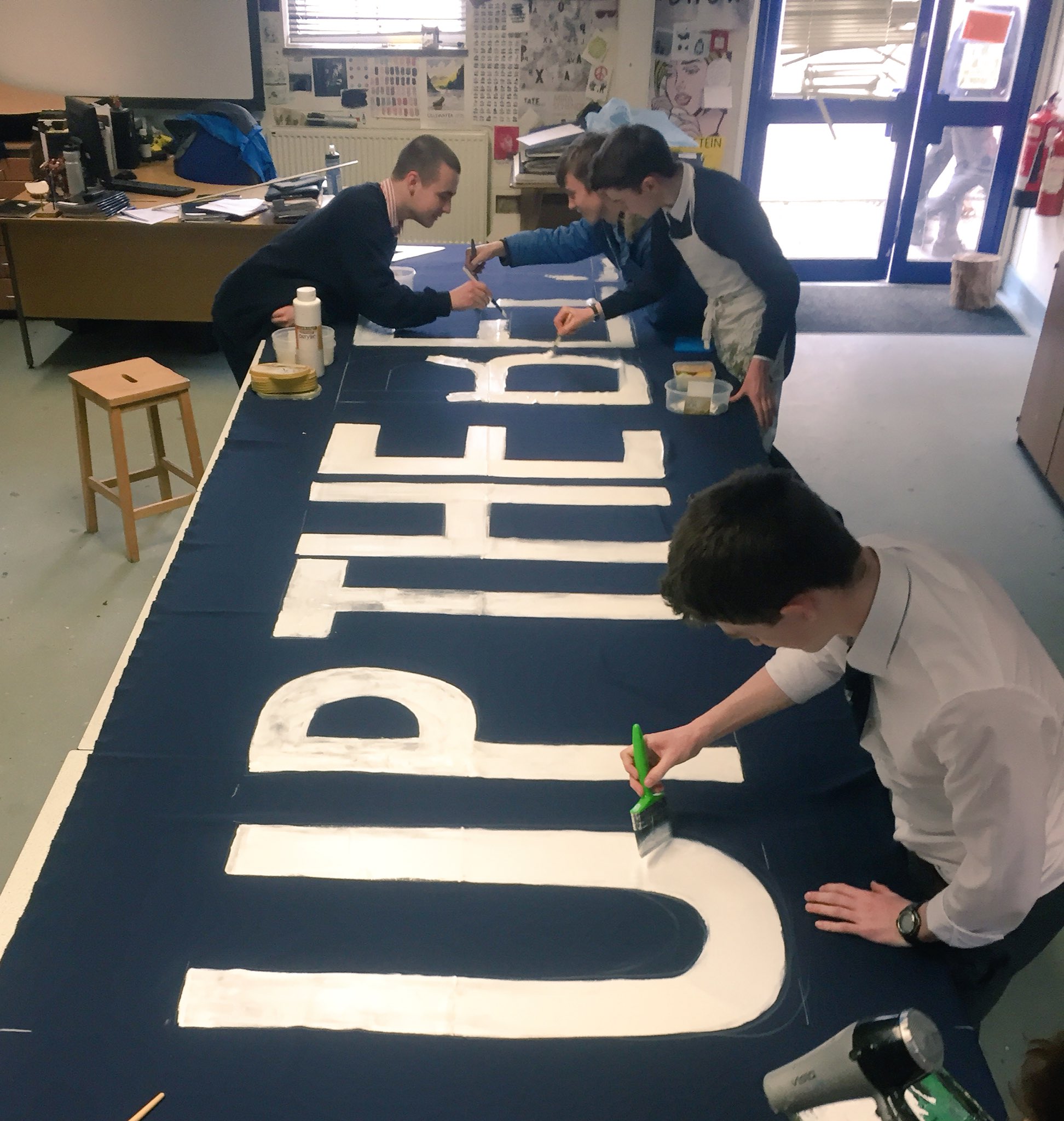
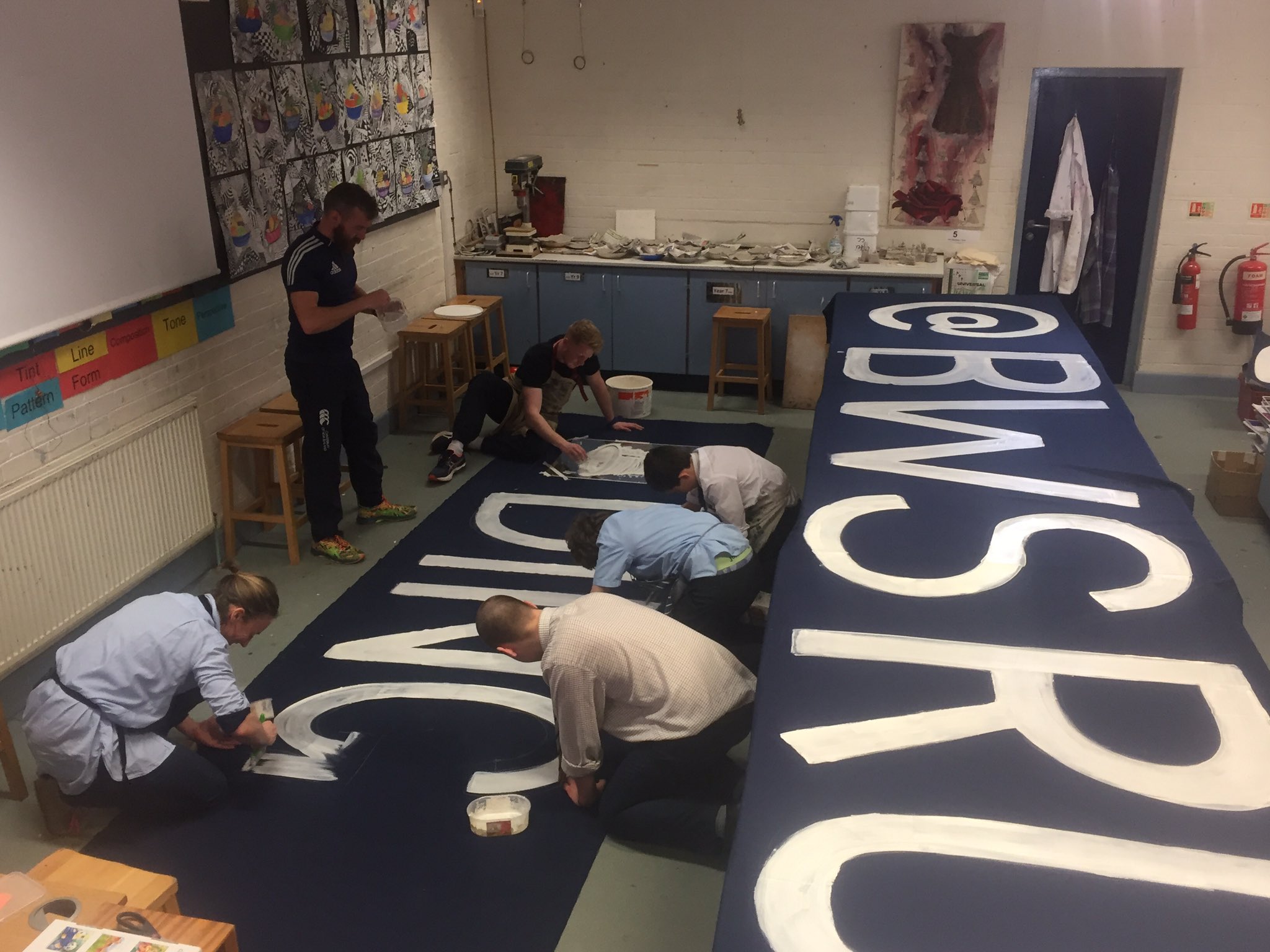
SDS
I was, by chance, reading the blog of another Head on Friday. How sad is that?! It was actually rather well written – the musings of an independent prep school Head Master as he looked across the state/private divide to see what was happening in the state maintained schools nearby. He said that the view was a chastening one, as his school’s strength was in Music which is precisely one of the subjects that is a casualty of the current funding arrangements in the maintained sector. He showed genuine concern, there was no gloating, just real sadness at the stifling of opportunity and the stunting of talent as minority subjects are marginalised and forced out because there simply is not enough money to pay the teachers. Grammar schools are not exempt, and at recent Heads’ meetings for selective schools around the country it has become clear that Music is vanishing along with other subjects with small student take-up; German, DT, the classics, in short the very things that make highly successful selective schools so distinctive and different. The things that make parents want to get their children into such schools in the first place. Good though most private schools are, why should academic diversity and reasonable class sizes only be accessible to those able to pay for their children to go to school? State selective schools punch above their weight in so many ways despite not being funded sustainably. Just imagine what we could do if we were funded properly!
Governors at BWS will this week be starting to look at the budget proposals that the senior staff have been working on to prepare for the 2017-2018 academic year. I have warned the teaching and non-teaching staff already that there will be pain to come as group sizes increase, we change some aspects of the management of the curriculum and we consider which subjects are viable to run and which are not. These are not easy times, but as with referendum outcomes it doesn’t matter which way you voted now is the time to get on and just do the job.
Finally, thank you to everyone who has taken the time to complete the National Funding Formula Stage 2 response form. If you have yet to have a go , then please do so before Wednesday this week as that is when the consultation closes (the link and guidance are pinned tweets @BWordsworths). Thank you also if you have written to your MP. I am sure that you will have seen and heard the impact that the weight of correspondence on this issue is having in Westminster. I will be at the Houses of Parliament once again on Monday to ratchet up the pressure for change once again. Wish me luck!
SDS
The 1st XV trip to Twickenham in two weeks’ time certainly seems to have caught the imagination of many in Salisbury. The back page of the Salisbury Journal was devoted to our team’s exploits at Allianz Park, and I quickly lost count of the number of people who have stopped me all round the town centre to say how well our boys have done. They are right of course. What an experience to come – just imagine as a schoolboy player running out onto the turf in that enormous stadium. Wow!
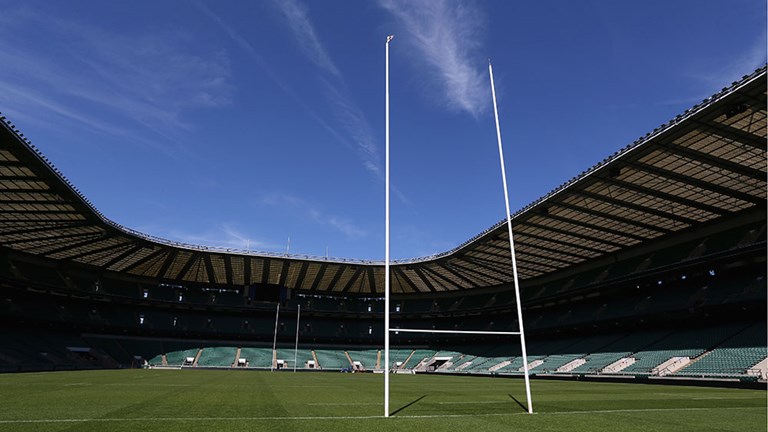
And it’s not just the local Rugby enthusiasts either, as there have been good luck messages coming in from across the full breadth of our interconnected world. I am sure that there will be a big BWS contingent pitch side on the day, and so there should be; given the circumstances the decision to shut the school early was a comparatively easy one to make, already vindicated by the fact that over 70 staff and 200 boys have already signed up to go. Like them, I can’t wait.
Meanwhile that’s not the only sport that has been going on. Our U13 and U 16 footballers were busy winning their respective local area matches, the Y8 and Y9 Basketball boys were playing in their County Competitions, the Junior and Senior Cross Country teams were at the Clayesmore Relays (finishing 3rd and 1st respectively) and the senior Tennis boys were away in Bolton competing in the National Finals of the Aegon Championships.

Mr Demain-Griffiths summed it all up on twitter by using the tag #marchmadness. I couldn’t agree more – but isn’t it great to see so many boys involved in so much sport at so many different events? It’s what school sport should be all about, standards and high levels of participation, but sometimes this can get swept away by the twin tides of bureaucracy and pressure on time. Not here and not now, but it’s something none of us should take for granted.
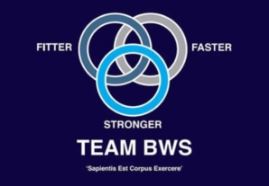
As I write this I have just returned from East Dean (near Chichester) where the Cambodia Expedition boys have been spending a weekend meeting their leaders and working together to hone their outward bound skill set. Endurance, navigation, first aid and emergency first aid were in the spotlight for them as they continue to prepare for this summer’s month-long outing to South East Asia. Rural West Sussex and the South Downs are not exactly analogous to what the team will experience when they travel to and beyond Phnom Penh, but I am sure that it will rain there too and they will probably get every bit as hungry from time to time as they have been this weekend! Once again what an experience for 17 and 18 year olds; I wish them and their leaders (Ms Steer and Ms Mihai) the very best of luck with both the remainder of the run-up and also on what will surely be a corker of an expedition.
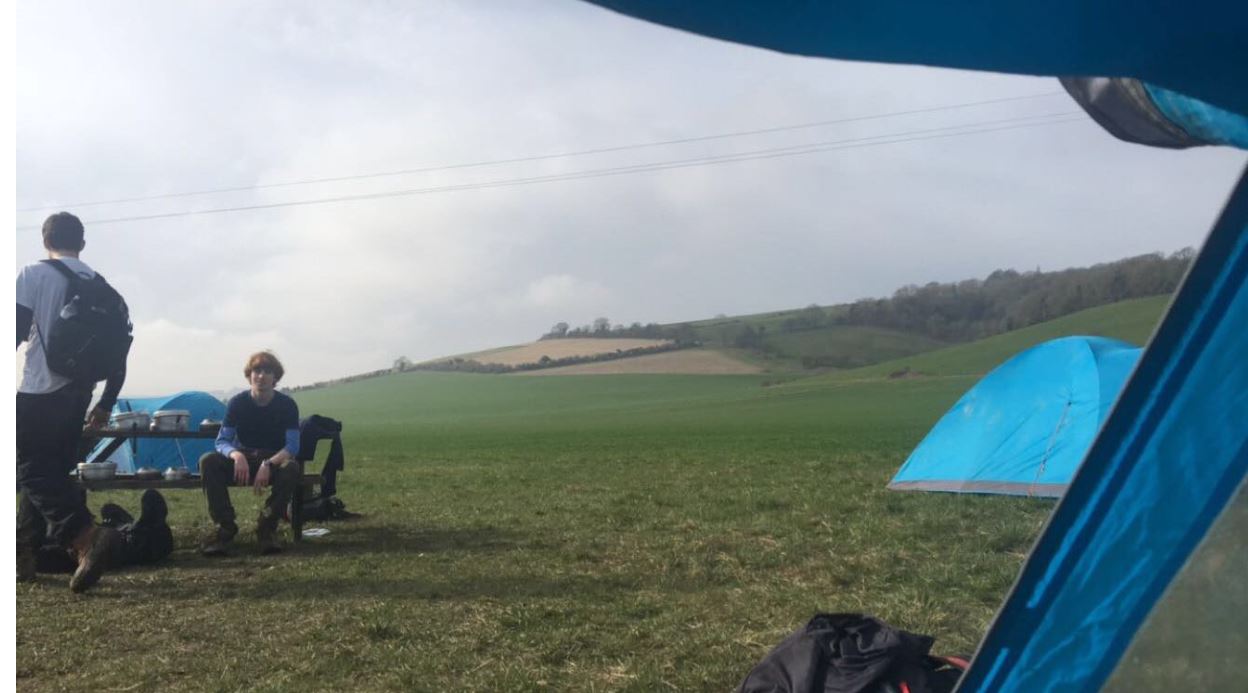
SDS
I write this having just returned from seeing a magnificent game of Rugby at Allianz Park, home of Saracens RFC. The boys of the BWS 1st XV took on and beat Bromsgrove School, who had won the NatWest U18 Schools’ Cup for the past two years. Two very good teams were on the pitch – there are no weaklings at the semi-final stages of a national competition – but the reality was that the BWS Team out-thought and out-ran their opposition for large parts of the match. The win was well-deserved, and that is not to denigrate a fine Bromsgrove side who gave everything; there is absolutely no doubt that the stronger team won on the day.
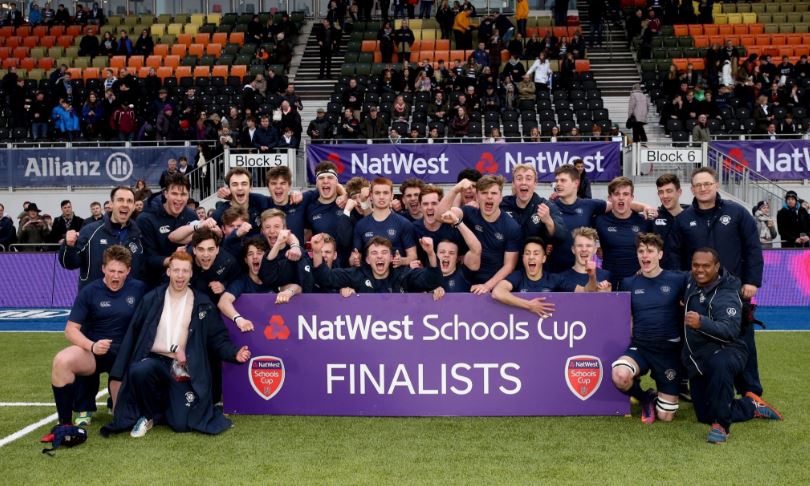
The final, against Warwick, is scheduled for Wednesday 29 March at England’s home ground in south west London and I am sure that excitement throughout the school, parents, governors and old boys of the school will only grow from here. It was also great to see Richard Hill (World Cup Winner) at the ground too, to watch the game. His message to the boys? Make sure you go one better than I did in 1991!

Last week wasn’t just about the oval ball though – there was masses going on. To give you a flavour I have reproduced some comments from Emma Baker, Head of Science, where she recounts the activities that went on under the radar during the week. She said this “There is lots of hard work going on in Science in supporting year 13 with the new style examinations, year 11 with prep for their exams and also year 10 with their internal exams. It is a really busy term and in addition to all of the normal excellent work going on in your classrooms, parents’ evenings, report writing etc etc. there is also a wealth of extra enrichment taking place.
Just the last two weeks has seen the culmination of a significant amount of preparation and hard work:
…and at the centre of it all the Head of Science sat there slightly bewildered but very pleased! This is not intended as a boast or an advertisement for what is probably the largest academic faculty in the school. Rather it is an illustration of the kind of thing that is going on day-to-day and that may (or may not) be seen and appreciated by parents and others who lead their lives outside the maelstrom that is the Bishop’s School.
So – a great week with a fine conclusion. We will give more news on the arrangements for 29 March shortly, as it is likely that a very significant contingent of the school community will want to travel to England Rugby HQ to support our boys. Their first national final in a quarter of a century beckons….
SDS
The inaugural outdoor Chess match at BWS took place outside the School Drama Studio in glorious spring sunshine. Thanks to the BWS Parents’ Association (whose donation funded the set of giant chess pieces) and the Site Team (who created the paving stone board) the gladiatorial confrontation between Mr Thorne’s Hotshots and a select team of boys was the hot ticket on Friday lunchtime. As yet I have not been officially informed of the outcome, though when I last saw the field of battle it looked ominously like the staff were on the back foot; the truth will out, I’m sure, [Editors note: The boys won by 13 seconds under speed chess rules...] but more importantly there will now be a rolling programme of matches over the remainder of this term and into the summer.
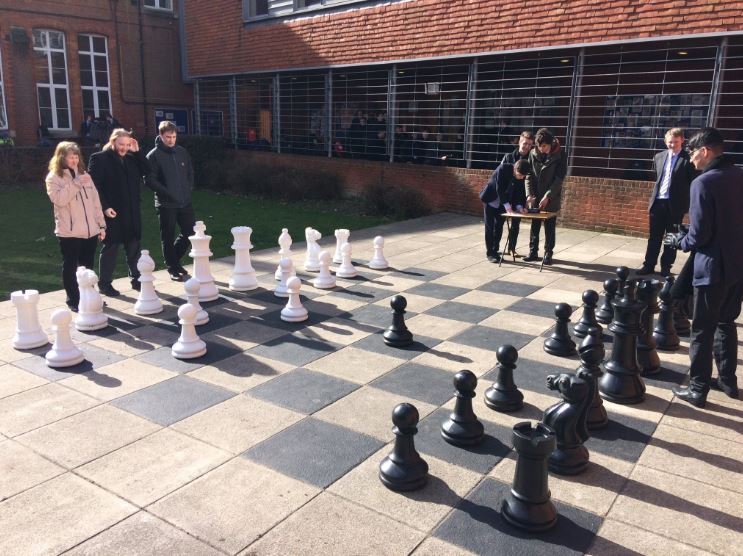
As the spring weather improves the chess pieces will be heavily used and I am hoping that the same will be true of the Petanque Pit and (in due course) the climbing wall that we have just acquired. Don’t believe your son if he comes out with that standard teenage mantra of ‘there’s nothing to do at lunchtime’…! Book Clubs, sports practices, music rehearsals, BBC Report, Chapel activities, Library, ICT Suites, DofE activities, Debating and Public Speaking crowd into the lunchtime space too, and that’s before the increasingly frequent support sessions for the boys in exam groups. There really is a lot going on!
Meanwhile, my job at the moment seems to be focusing on finance more at the expense of education. Last week’s meeting at Westminster with the Education Minister went as well as it could have done. The MPs were very supportive, the Heads’ arguments were compelling (though I would say that wouldn’t I?!), and I felt that we were listened to. The Heads of four grammar schools need to be listened to carefully, since they represented a combined pupil population of over 4,000 – all of whom will lose out under current funding proposals. I did also make the point that parents simply do not understand what underpins the unfairness of what is being proposed, and that (I think) had an impact; politicians always want to know which way the wind is blowing with constituents. The heads were ably supported by their local MPs – John Glen is doing a great job for us in this respect, along with his colleagues in the f40 Group.
I remain resolutely upbeat and optimistic that the right thing will be done by the school. As No11 garden emerges from the lengthy torpor of winter and the March radiance encourages bulbs to open on the lawns, I feel that there is momentum building elsewhere to change things for the better…
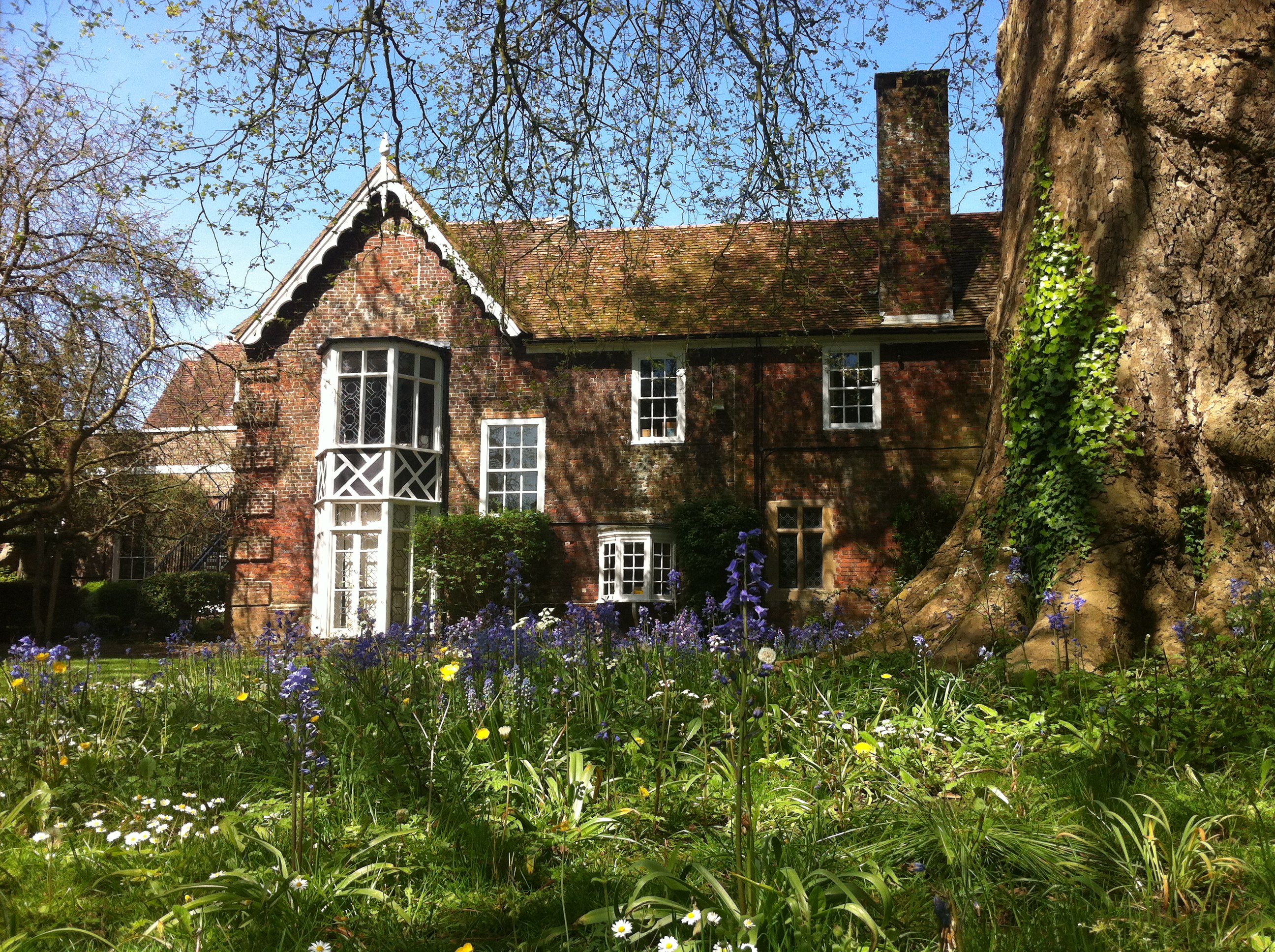
SDS
…so apparently said Madame de Pompadour, lover of Louis XV of France as she contemplated the possibility of France without a reigning monarch. The future motto of the RAF seems particularly apposite as we emerge from the half term holiday under yet another (annually repeated) financial cloud. This one is even more serious than those that we have weathered in the past however, as dramatically shown by a financial illustration from another selective school that I have just read. The school clearly states that if the National Funding situation remains unchanged then the academy will, in due course, become non-viable financially and is likely to close. It’s that stark this time.
Here at BWS we have started to prepare cost-cutting options for governors to consider, and they are bleak. They focus on the closure of non-core subjects, the slashing of extra-curricular provision and it is fair to say that the future of the Sixth Form at many grammars is now under threat. Post-16 classes have run at a deficit for around 5 years in most schools across the country and, because of their DNA, grammars have a disproportionately large number of sixth form students. In the past the budgetary hole opened by the Sixth Form has been closed by funds from lower down. The NFF changes would mean that this could no longer happen and smaller sixth forms will close. In Salisbury we do everything we can to keep subjects open between BWS/SWGS but the situation postulated by NFF makes even our cost effective joint provision untenable.
The question is, will the DfE listen? That is my mission later today when, together with three other grammar school Heads and our respective MPs I will be meeting with Nick Gibb (Minister of State for Education). I am sure that he will have many other similar meetings in the near future, and hopefully the sheer weight of unhappy Heads and back bench MPs may make an impression. Time will tell what form ‘le deluge’ will take…
SDS
Last week presented a polarised portrait for those of us immersed in selective education. The Salisbury Journal was full of the things that the boys at Bishop’s are good at. Sparkling examination results, sporting prowess, successes in Debating and Public Speaking, engagement with alumni and our first Harvard aspirant.
On the other hand there was the focus on how the majority of selective schools across the country could be financially ruined by the latest model for national funding of schools. The conflict between the two sets of headlines was stark; at the same time as we were celebrating so much excellence, it would appear that there is a complete lack of recognition of what it takes to run a school at national level. The differences are hard to reconcile, let alone make sense of.
What on earth is going on?
Wiltshire has, for many years, been on the receiving end of unfair, post-code defined and illogical levels of funding. Along with many other shire counties and regions away from London we have been deprived of money to run our schools, with resources flowing towards the metropolitan areas. Along with most other Heads I supposed that when a new formula was proposed it would do the obvious thing, ie redistribute funds to those at the bottom end and steadily reduce the disparities which had built up over the years. For almost every school in Wiltshire that is what the new model proposes – but not the two grammars. Almost every other secondary school in our local area emerges from the proposed funding change with an increase, usually 1.5-3%, which will have real benefits in cushioning them against the cost pressures to come in pensions and National Insurance. The two grammars both lose 3%, around £80,000 per year. The reason for this seems to be that more and more funds are being directed towards deprivation (as identified by pupil post code) and low prior attainment (ie pupils with low Key Stage 2 test scores). Selective schools across the country are working hard to encourage social mobility (I have written about what we are doing at BWS in this area before), but ultimately we have no control over who takes the test or how they perform.
The basic arguments against what is proposed by NFF are indisputable. Firstly, how can it be right to take a school in one of the lowest funded areas of the country and introduce ‘fair funding’ that results in a further cut for that school? Secondly, where is the evidence that devotion of so much money to solve social problems is effective use of resources? The Pupil Premium is separate to all of this, and yet there is no evidence that PP has made a difference – in fact Sutton Trust research shows clearly that many of the high cost intervention methods used by schools spending PP funds are largely ineffective. The most impact is gained very often by low cost, simple methods. Thirdly, in the past some local authorities were notorious for ‘top slicing’, in other words abstracting money from government grants before dishing out the rest to schools. That’s why so many schools, including most grammars, became academies. Yet now there is the prospect of a similar technique being used at a national level.
There is a constant refrain, quite rightly, that public services need to spend tax payers’ money in a cost effective and efficient way. I defy any time and motion expert from the DfE or the Treasury to take the train to Wiltshire and see what we do with our money and find savings that we cannot. The time for issuing ‘spending toolkits’ and ‘procurement advice’ from on high is past, I just need enough money to pay the superb staff that I have here at school, and to do that I will need to lobby against the existential threat presented by the current funding model. Fairness in funding is represented by evening out the financial playing field and allocating outstanding schools like BWS enough basic funding to operate. On the Today Programme in the week £4800 per pupil was given as the commonly accepted figure. If you can, please do respond to the current consultation which can be found here.
SDS
It’s one of the paradoxes in teaching…moving up the career ladder means that though you can then do your best to influence a greater number of lives for the better, those whose educational prospects you could have the greatest direct effect upon diminish in number. I came into teaching to teach – not to sit in an office in front of a screen, or talk to adults, or sit in meetings where some matters seem to become tangential to schools themselves let alone the children who are supposed to be the focus of all that effort and energy. And then there’s the impact of incursions; for the last decade and more I have maintained my teaching load at around a day a week. Though I have a degree of control over my commitments away from the classroom (and, indeed, away from Bishop’s entirely) that control is limited, and as a result at times I think that classes are in danger of getting a raw deal. Work is always set and then subsequently marked, feedback is given and learning still goes on but the very fact that I am not there to see my charges means that my conscience is pricked…and of course the last thing that I would want is to get told off by the Head of Geology!
Last week was a case in point. From the perspective of an established Head of a Church Grammar School there was a job well done. A large part of Wednesday was focused on the Rugby match for the 1st XV against the Judd School, which took place on a splendid (and unfrozen!) 3G pitch at the Tonbridge School’s site with an equally splendid outcome! I went on two wheels so that I could back in time for the majority of the Year 10 Parents’ Evening at BWS, which I managed to do despite the best efforts of the M25 four lane car park.
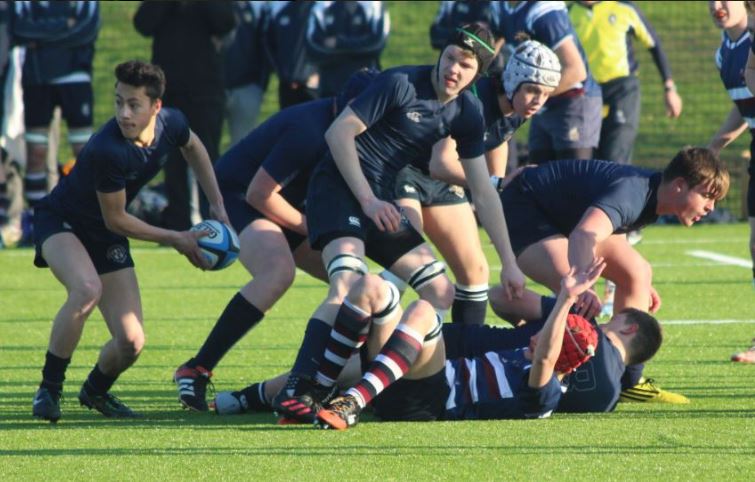
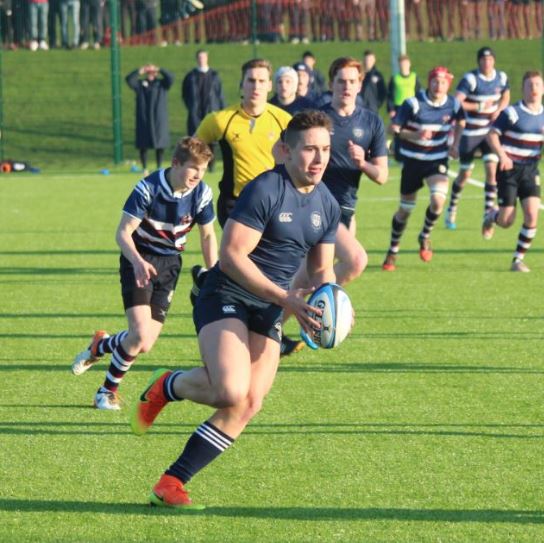
Thursday saw the first part of the morning (including half of my Year 12 lesson) taken by our monthly Cathedral Service. Mind you I suspect that some of my Lower Sixth Geologists may have been a little relieved that I was unable to devote more time to a forensic examination of their examination performances! Friday took me to Birmingham to a meeting of the Steering Committee of the Grammar School Heads’ Association; around 20 Heads of some of the best schools across the country debating the proposals of what has euphemistically been called the ‘National Fair Funding Formula’, of which more next week. Vital stuff – but yet another thing to divert me from what I still regard as my key task; no matter, Banquo’s Ghost (in the form of exam analysis) will duly return for my Year 12 next Thursday…and as the Cotswolds sped past on the return home in glorious winter sunshine, my thoughts were with them rather than dwelling on the technicalities of DfE consultation.
Getting the balance right is never easy, and I could always do better I’m sure. My problem in this respect is a scaled-down version of the whole school paradigm, as there is a compromise to be drawn between the need for academic drive and the need for maximising the opportunities for boys to all sorts of other exciting things which may not contribute directly to the delivery of results. All schools wrestle with that and so they should – there is little to recommend an arid purely classroom-based education devoid of excitement and variety and devoid of the opportunity to develop soft skills and breadth. My colleagues here do amazing things to try to make sure that our boys’ experience is rich and rounded – for Bishop’s Boys all the way from 4 foot 6” to 6 foot 4”!
SDS
One of my regular tasks is to scan the internet and social media (of various types) for what connections can be found linking the school, staff or boys to events and institutions in the local area or across the globe. Like most detective work it is painstaking and quite time-consuming, but in the same way it can turn up unexpected connections – gems of information – that can be absolutely fascinating. The stories that are buried in the years since boys have left the school come to life, illuminating the wealth of opportunity that exists for youngsters once they leave Bishop’s.
One of the best examples of hidden connections is provided by the now very significant web that is the school’s LinkedIn profile, and perhaps you are reading this blog through a link posted on the professional network right now? It wouldn’t be that surprising if you were, as last week’s blog had a readership of well over 300 BOBs (Bishop’s Old Boys), several of whom got in touch for the first time as a consequence. The longest response came from Barry who was at BWS in the early 1950’s; he remembered William Golding as form master and also as a teacher of SHE, as well as skinny dipping in the River Avon. Times, it would appear, have changed somewhat in education in the last 60+ years…
This makes it sound like the development of an alumni network is all my doing. Nothing could be further from the truth. Most of the excellent investigative work and subsequent setting up have been carried out by Benj Cunningham (OW), who has done absolutely sterling work on behalf of the school over the past 12 months. The nearly 1500 connections now present on LinkedIn are down to him, and he has been assisted in his work by Charlotte Wilson who has organised several very successful alumni events in both Salisbury and London; the next of these will take place at the Reform Club on 22 June this year.
Other work in this area is also under way as, with the very welcome help and advice of Colin Sharman (OW) we are in the process of setting up a Foundation for the school. Once established, this should be able to encourage broader social access to BWS and also assist with future fund raising. That’s an exciting prospect, addressing as it does both the issue of social mobility and also the need for further development on a site which is already almost unrecognisable to most BOBs who left more than 10 years ago.
Whichever route you are using to read this blog I hope that you feel in touch with what is going on in school, no matter how long ago your last contact might have been. Getting, and keeping connected has never been more possible and I would encourage anyone who has an interest in Bishop’s to take advantage of the connections that we offer…
SDS
Working out what on earth to say at the last school assembly of the Autumn Term can be a tough proposition. Over 1,000 people packed into a Sports Hall, waiting for the end to come and glorious freedom to erupt. An audience across the age range well aware that liberty awaits, and yet there is a collective need to tie the loose ends together from a frantic, full-on term. Words from me, judiciously chosen, can help but I have also employed Google’s excellent summary of the year in searches to help do the job each year for the past half-decade. Billions of people, trillions of searches can give a context for life in Salisbury set against a world in turmoil. Each year the zeitgeist is tangible; follow the short films back on YouTube and history unfolds before your eyes as a compelling story. The link to the 2016 version is on the main school twitter feed. Ignore the commercialism and the trans-Atlantic bias that creeps in from time to time, I can promise you that the 2 and-a-bit minutes viewing will be well worthwhile. I never leave one of the films either unmoved or unchanged; that is the power of media at its most potent.
2016 was a difficult year, as we all know and as the film shows. For me this was quite a difficult prospect coming into the assembly. I want to strike the right note; it’s not just the need to rather mechanically bring the proceedings of the term to an end. I feel that it is very important to conclude matters on a positive note, to build togetherness but also to send everyone away with something to think about for the coming holiday. Time away from school is not just for switching off; less pressure of work means that there is more chance to reflect and plan for the future. That’s important whether you are 15 or 50.
So 2016 was difficult. Political and economic instability, conflict and the awful consequences of terrorism are the echoes that reverberate from the 12 months past, with the filming coming to a halt with a desperately sad image of a tiny Syrian boy, bewildered, lost and plastered with the detritus of war. Hard hitting stuff, and it needs to be. After all, we are so lucky. Despite our agonising over identity, Article 50 or our chafing about the design and sustainability of western society the fact remains that we are prosperous, our politicians work for the greater good and war is a remote possibility. If only that were true everywhere.

What will the eighteenth decade of the 21st Century bring? Loose ends and uncertainty there will be . Brexit, Trump, inflation, who knows how those threads from 2016 will knit together? World leaders seem united too in bewilderment at the pace and unpredictability of events and the difficulty of knowing where the consequences will lead us all. In school this year will be all about opportunity and threat. We have the excitement of our new building and many more boys joining in Year 7. There will be significant changes to the way in which the school works, with departments and offices changing location and even year groups moving as Year 9 transfers to become a part of the Middle School for the first time ever. New exams at GCSE and A level, changes in the Sixth Form with most boys moving to 3 A levels and many more taking on EPQ. All of this work in school will be tempered by the battles to come over the model for schools’ funding on a national basis. Together with the governors I will be fighting to try to ensure that grammars in general (and Bishop’s in particular) get a fair deal from the government – a deal that is a great deal less punitive than the current proposal to emanate from the DfE as an early Christmas present!
Whatever the outcomes by the time the next festive season arrives, there is no doubt that the zeitgeist of 2017 will be one of change…whether that is in Salisbury or Syria, Whitehall or Washington.
SDS
Day-to day existence in a school like Bishop’s is fairly frenetic; what appears on the surface to be a serene establishment with well-established routines and working patterns can only sustain that impression with huge amounts of work behind the scenes by a team of staff determined to make things special for the boys. Looking back over the year is a somewhat dizzying experience as there was so much going on in so many areas in addition to all of the teaching and learning that is the life-blood of the school. The rhetoric on the website says that we aim to give an all-round education with real richness and breadth to our boys, and I think that the year’s-worth of activity during 2016 constitutes exactly that. See if you agree…
2016 began with future developments firmly on the radar. We knew that this could be an important year for the school as the outcome of the latest capital bid was under consideration by the Education Funding Agency; expansion of BWS would be conditional on a successful outcome. In addition we started meaningful work on reconnecting with school alumni for the first time in earnest, with Benj Cunningham (OW) starting to put together all of the information about our old boys and also launching our LinkedIn site (which has been outstandingly successful). The first two months of the Spring Term were very busy with overseas trips to Estonia (Debating), La Mollina (Skiing) and Paris (Art) as well as our HE Conference (58 Universities represented and over 700 students from 8 schools visiting), a Business and Economics Conference (students from 5 schools) and a Propeller Theatre production (2 performances and pupils from 4 schools). The following month was characterised by sporting success as our Junior Boys won the Bryanston Relays, our Senior Rugby players won the Canford7’s Tournament and then got to the Semi-Finals at Rosslyn Park too. Students from both France and Germany were with us on the UK leg of the exchanges and over 100 boys attended the Bronze Duke of Edinburgh Training Weekend here. Add to this the House Music Festival, with masses of great performances and a residential visit for our Cambridge aspirants (including sessions at the Godwin Climate Research Lab and the Corpus Library) and you can see just how busy life in the latter part of the Spring Term was.
April saw the Iceland Trip for around 50 Geologists at the start of the holiday and, for the first time, a series of Easter Revision Classes offered at BWS in Maths, Chemistry, Economics and Geography. Major schools events followed when we returned after the break – the 25th Anniversary Rugby Match at Allianz Park, the Joint Choral Concert in the Cathedral and also an EU Referendum Debate here at school organised by the students of the Politics Society and attended by over 300 people. The Summer Term is always crowded with trips and 2016 was no exception – groups from BWS visited France, Germany and Spain as well as many domestic destinations including (as usual) much of Year 9 departing en masse for Pencelli and the whole of Year 7 to Great Yews. Important news was received as we heard that almost £2 million had been approved for our new building, and plans were therefore on course to expand our 11+ entry to 160 from September 2017. The work for this started in earnest in May and accelerated through the Summer, with the Site Team achieving a minor miracle to ensure that (a) the site was able to function for the new school year and (b) there would be enough classrooms to house the curriculum too.
September started with the new site arrangement in operation. Cars were largely gone, and boys (for the first time in my nearly 20 years at the school) had more or less free reign across the entirety of the school’s footprint. The Autumn Term brought real diversity which has continued to date. Sports have been exceptionally strong, with BWS Teams into the latter stages of the Aegon National Tennis Competition, the 1st XI Footballers into the last 16 of the School’ FA Cup, the Junior Boys Cross Country Team finishing a splendid 8th in the ESAA National Finals and the 1st XV Rugby boys through to the quarter finals of the NatWest Cup. Extraordinary levels of success for one school – a real accolade for our PE Team led by Richard Demain-Griffiths. The production of ‘Ministry of Fear’ played to capacity audiences at the Studio Theatre and the BWS/SWGS Parents’ Association Christmas Fair saw the Sports Hall filled with stall holders and shoppers looking for present ideas. The Year 12 BWS Team in the ACAEW Base Competition finished second in their regional final; we won this last year and so their predecessors have just returned from a day spent at PWC Accountants! The year has finished on a high with over 90 boys signed up to take part in the BBC ‘School Report’ scheme, the Arnold Barks Engineering Lecture in the Sports Hall (4 schools’ pupils attending), the tour match against Ipswich Grammar School (from Brisbane), the Christmas Concert and the Carol Service to come.
This, of course, is just the bigger stuff. Add to the list a myriad of day trips, visiting lecturers, workshops, routine fixtures, masterclasses, STEM Days, enrichment activities and so on and you start to get a feeling for the richness that is on offer here. My enduring hope is that every boy – whether he is the most academic, sporty, thespian, musical, artistic etc. - will find something at which he can shine. If we have done that then we have done the job.
This is my last blog for the calendar year, so can I take this opportunity of thanking everyone – staff, parents, governors and friends of Bishop’s – for helping us to get so much done during the last 12 months. I send my very best wishes for a very happy and restful Christmas, and wish you the very best of luck for 2017. It looks like a really exciting year to come.
SDS
And so, with the first blast of Arctic Air of the winter we cruise into Advent. The final two weeks of the Autumn Term build to a crescendo in extra-curricular terms, with the Winter Concert due at St Martin’s Church in 4 days’ time and the School Carol Service in Salisbury Cathedral on the Monday following. This year we break quite early just for once so that there will be an appreciable period between the last day of term and the substantive start to festivities. With marking of Year 11 prelim exams out of the way hopefully the teachers’ batteries will carry them through to the last day intact – then the waiting and planning for Christmas really begins.
There are more ways in which I feel that we are in limbo, waiting for things to happen here at Bishop’s at present. I am impatient for the new building to be complete – now that it is so clearly taking shape as we live with the building site day-by-day, I can’t wait to see the transformation that will come about when it comes into use. It’s not just the dramatic improvement in bricks and mortar; we are tying in the new development with many other changes to try to make the most of the impetus that such a development can give. There will be changes in the operation of the pastoral system of the school, with Year 9 becoming a part of the Middle School and other changes in how we use the staff to better effect to support the boys in the run through to their GCSEs. Assessment will need to change to reflect the different allocation of the year groups and of course there will be another Year 7 tutor group coming in to the Lower School Section from September 2017. More boys in the first year means changes to the timetable and staffing and, in due course, a new House to add to the four that we already have – the first time since Headmaster Happold’s time that there will have been more than 4 houses at Bishop’s. I am in the process of thinking through the developments that we need over the next 5 years so that those boys are well catered for, and we will be establishing a Foundation for the school to help us to build for the future. The next half decade really does look very exciting.
Schools nationally are waiting for change too. The continuing Brexit birth-pangs mean that work on the National Funding Formula for Schools has been delayed, as I had anticipated in an earlier episode of this column. Nevertheless the latest news is that there will be a formula which will benefit the schools of the shire counties, and the new financial arrangements will start to be felt in the 2018-2019 academic year. There is absolutely no doubt that BWS will be a beneficiary of a more level playing field for schools’ funding. You may have noticed a link to a recent tweet on school budget cuts circulating in the twittersphere within the last week or so as some evidence of this. The Chancellor’s Autumn Statement makes it clear that though there is to be increased investment in public projects (and thus an inevitable deferment of the end of austerity) there will be no meaningful increases in the amount of money allocated to public services for the foreseeable future. Well ok, that’s predictable given the current circumstances, but it means that budgeting over the next two years will be quite tough as we have to absorb the costs of the additional boys but have to wait for the supporting funds to roll in a year adrift. In the longer term the benefits are very clear, as having a larger number of boys in Year 7-11 brings in the money that we need to make up for the woeful lack of funding available to pay for sixth form places; as the school grows towards 1100 pupils financial stability and security should become facts of life, but in the medium term (like every other grammar school that is expanding) we may have not be able to avoid deficit budgets. The Chancellor did in fact reiterate the fact that there will be £50 million set aside for each of the next 5 years to ‘enable successful schools to expand’.
I have just written to the Education Funding Agency to ask if our funds can be allocated on a current year basis for the period where the school is growing and cash is tight. No more money in total, but we get the funds when we need them most which seems (to me) to make perfect common sense and involve very little impact on the public purse with interest rates at rock bottom. I have my fingers crossed as the period of waiting continues.
SDS
I was ambushed last Friday. I was in London in a rather anonymous hotel in Kensington considering the way forward for A level Geology when, slightly embarrassingly my phone buzzed. I had remembered to mute it, so I avoided the collective accusative stares that result from an obviously audible ringtone, but the vibration was still there nonetheless so I had to look. The buzzfeed told me that Bishop’s, together with SWGS, had been ranked in the ‘top ten’ state schools in the South West of England by the Sunday Times this year – and I was asked for a comment by the local media. I made none.
You see, I felt slightly embarrassed about all of this. To tell the truth I had forgotten that any of the newspapers were going to publish anything of the sort, though I think that the Sunday Times had done so in previous years. I should have known. Secondly, I had absolutely no idea of the basis upon which any journalist had put together such a league table nor why they would have waited until nearly Christmas to do so. Lastly, though I support the availability of performance data in the public domain, to then make use of them to rank schools on a regional basis seems to make little sense to me either statistically, ethically or in terms of basic common sense. Consider this. The publication concerned is entitled ‘Parent Power’. Information empowers, there’s little doubt about that, but what proportion of parents would make this type of comparative information the basis upon which to take sensible, pragmatic domestic decisions concerning their children? Very few I suspect, which means that the articles written must be aimed primarily at enhancing the boast factor if and when it exists. It’s nice to be identified but does that automatically mean that all of the schools who are not fortunate enough to feature are by definition not good enough? I doubt it.
A local context helps to get matters into perspective. Here in Salisbury there is an opt-in and therefore partially selective secondary system. The two selective schools do pretty well, and that’s something that both are very proud of and work very hard at maintaining or even building still further. The 11-16 and other non-selective schools in and around the city do a super job though, with most out-performing comprehensive schools across the country despite the fact that many of the most able candidates go elsewhere. The Wessex Partnership Heads work closely together day in, day out, trying to ensure that all of the children in the local area get a good deal – irrespective of their starting points or their family backgrounds. Parents in South Wiltshire and West Hampshire have a real breadth of choice both pre- and post-16 – single sex or co-education, church or community school, local authority or academy or (in the future) multi-academy trust. Whichever path their children end up travelling on they should be confident they will attend a good school with a strong Head and committed staff. That matters.
SDS
…that’s what you’ll read if you go to the British Legion’s website this year and look at the Poppy Appeal 2016 pages. The Legion says, quite rightly, that there are a new generation of veterans who need to be recognised and remembered, alongside those who made sacrifices in the great wars of the twentieth century. It’s not just us oldies who should keep the flame alight, the responsibility must be passed on down the generations as the years go by. They must not forget.

That’s an intimidating task, but a hugely important one. After all, my parents were just too young to have fought in the second war; my father enlisted for national service in 1945 after VE Day and, though I had uncles in both Bomber Command and the Fleet Air Arm the conflict was always one step removed for me. If that is how it is for someone in their mid-fifties, how much more remote must it be for a boy in his early teens? But somehow those fundamental messages of the importance of fighting for values and freedoms, the bravery of those past who have fought for the preservation of our country and way of life must be translated into a language that is accessible and valued by this century’s boys. In the world of google, snapchat and instant gratification the words describing remembrance can’t be stuffy, staid and easily forgotten. This year in assembly I spoke about the Fovant Badges, five of which were carved into the Wiltshire Chalk by young servicemen briefly encamped at the foot of the scarp before migrating onto France and the Western Front. Using an immediate, unmistakeable and unmissable image will (I hope) create a lasting impression when the rest of the assembly has faded and gone. It is the memorable that counts.

Links also help, and links with the armed forces are present in this area more than most I would guess. I remember when Mr Moore (BWS’ Bursar and ex RMP) did a little research to see what military history lay in the genealogy of BWS boys; the stories that emerged were by turn fascinating, engaging and moving. There are other links too which make remembrance more vivid. Many of the young men who serve and perform amazing acts of bravery are barely older than our Upper Sixth Formers who are with us today. Tom Adlam VC was just 23 when he fought at Thiepval, leading a company of infantry many of whom would have been younger still. The immediacy of youth hits home still, as it does every time I see Tom’s picture in the BWS Chapel.
The boards in the school chapel list a significant number of old boys who lost their lives in WW1 and 2. The danger is that those are just names and no more. Perhaps the significance of the long engraved lists on boards high on the walls escapes our boys, despite the fact that most visit the Chapel on a weekly basis. Perhaps it is too much to expect them to be alert to the importance of memorial boards first thing in the morning. Even if this is the case though I always feel that there is a level of understanding and engagement at this time of year that is backed up by the fact that yet again we ran out of poppies to sell. Though many of our boys have no immediate experience of the impact of conflict on their lives, they see why 11 November is special.
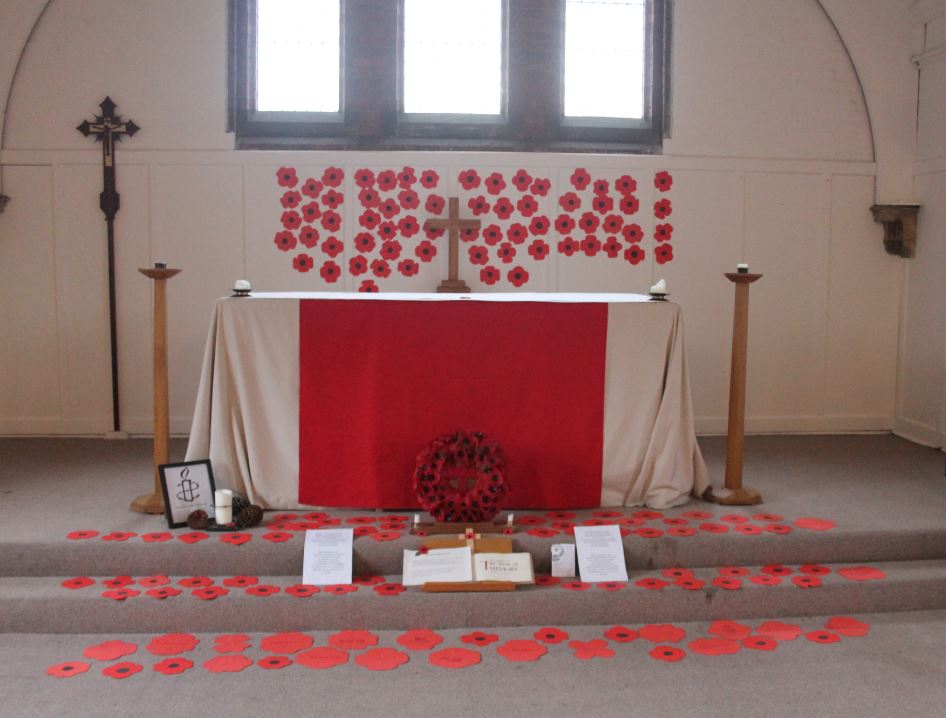
Are we rethinking remembrance then? To tell the truth, I am not really sure. What I am confident about is that the current generation at Bishop’s knows and understands the importance of what has happened in the past, and they also see and hear about the sacrifices of the present day. The atmosphere in the assembly hall, the silent school at 11am on Friday and the picture of the Rugby Teams lined up pre-match at the weekend tells me that. As it says on the twitter picture – ‘No words required’…
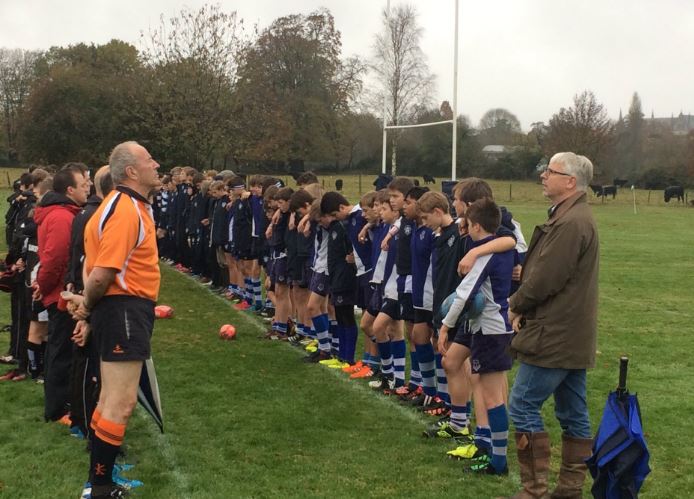
SDS
In the middle of the past week a letter from Rebecca Clark arrived in my post. Now letters to the Headmaster tend to be somewhat polarised in nature; sometimes they are very pleasant, telling me of good news of one variety or another (an OW’s degree or award, a gift to the school, the success of a bid, good behaviour on the train or a lecturer agreeing to come). That’s great. There are the other sort too, where things have gone wrong, for example complaints (rare but always possible), family traumas, resignations or illness. This time the news was good (I think). Rebecca is the Schools’ Commissioner for the South West of England, and she was writing to me to congratulate the school on getting one of the highest scores for ‘Progress 8’ in the region. ‘Well done’ (she wrote) ‘for navigating your way through the new qualification landscape in such an effective way. You should be very proud of your pupils and staff. Well, I am. And yet the letter still left me with a nagging doubt. Had we really ‘navigated our way’ over the past couple of years or had we simply been doing the best job that we could under circumstances that have been less than ideal? It is always nice to get plaudits from the great and the good, but were these (unsolicited and unexpected as they were) really justified?
Investigation of that small conundrum requires a little background on the nature of assessment, which perhaps does not immediately spring to mind when considering a subject for a blog that is both elevating and captivating, but still, here goes. Progress 8 is a statistic which compares pupils’ attainment at GCSE in 8 subjects compared to how they performed in English and Maths in their SATs towards the end of their primary schooling. The eight subjects which are used are English and Maths (which count double) and six other ‘facilitating subjects’ from a prescribed list. Most Progress 8 scores for secondary schools will lie between -1 and +1, with the average being 0. A score of +1 means that on average, pupils are gaining one grade higher than at other schools across the country and vice versa, and of course half of all schools will be negative and half positive. Simple really!
Except, sadly, it’s not. The problem is that, as with all statistical data there is an area of uncertainty and/or error, which means that no-one can really be sure that a score shows a full and accurate representation of performance whether the number in question is above or below zero. Then bear in mind that in a typical year around 20% of the boys joining BWS originate from within Salisbury’s prep schools and so they will not have a Key Stage 2 baseline for us to refer back to. And then there are the current problems with marking at GCSE. If you have a son in Year 11 you will know only too well the farcical marking of English Literature by the AQA exam board which has meant that all of the boys’ scripts have had to be re-assessed with over half of the grades increased on appeal thus far. No-one can legislate for that, not teachers, nor statisticians nor schools’ commissioners. The appeals trundle on, the data will, no doubt be recalibrated and re-released after Christmas but meanwhile in the real world the boys (and the school) are moving on to greater things that are more under our control in teaching, learning and exploring new things.
Don’t get me wrong here. I’m not criticising Ms Clark for writing, and I’m not complaining about receiving a nice letter! The idea of measuring progress is actually a good one, and I can understand why the DfE is having a go at introducing a progress-ometer for schools. My doubt is over the methodology and the danger that too much will be read into a measure that is the product of a statistical cooking pot. The further that those performance statistics are removed from the actual results scored by our boys, the more doubt that I have. Heisenberg postulated that in the infinitesimal quantum world of sub-atomic particles, measuring two dependent variables (eg location and momentum) was a problem; the more precisely one was known, the less accurately the other could then be defined. I think I know how he felt…and so my annual reflection on the school’s performance is driven by simple data and comparison with other top boys’ grammars countrywide.
Of course there is another way in which Heisenberg’s thinking has resonance in this area. When I was taught about the Uncertainty Principle at school my understanding was that if we try to measure something that is very small then an exact outcome is never possible. The very act of measurement changes the behaviour and properties of the particle or wave so that the original state cannot be exactly determined. There’s my other misgiving about some methods of assessment. In choosing how to gauge performance, the DfE then has a causal effect on the behaviours within schools; exam board data shows that far more resources in comprehensive schools have been poured into appeals at the C/D borderline than anywhere else. Hardly a coincidence when the established benchmark measure has been %5A*-C for some years. Heisenberg has profound implications for quantum mechanics, but we need also to consider the application of the observer principle to educational psychology too.
SDS
It won’t, I am sure, have escaped your notice that during the last week one of the elements of the Queen’s Speech in parliament was quietly abandoned. The expressed intention of passing legislation to compel all schools, whether successful or not, to become academies had been in intensive care for some time and so it was no surprise when it was formally dropped from the agenda for this parliament. It was, of course, very unlikely to work – and you don’t have to look into the far distance to see why. Local context is really very important when considering such a fundamental change to the way in which a school operates and to simply cut across that critical contextual detail in the interests of creating a more uniform system seems (to me) to fly in the face of common sense. I suspect that everyone involved in the teaching profession would feel that there can be circumstances where changes have to be made, where a school is failing and only root and branch reform will do but this is not the case in most examples. The same is true of multi-academy trust creation. It makes all sorts of sense for some schools to link together to realise economies of scale, to centralise back office functions and to make the most of mutual support. I am sure that this will apply for MATs proposed for the local area; our very successful but very different group of non-selective schools may very well look at such an arrangement in the future. For others (and I include BWS in this) a convincing case is much harder to make in the face of increased costs, increased bureaucracy and tiers of management/governance and issues of accountability. The governors’ view at present is that this school’s interests both now and in the future are best served by Bishop’s remaining as a strong but stand-alone academy, though we will continue to maintain our very good working relationships with a variety of other local providers. This view has been endorsed by David Carter, the National Schools’ Commissioner.
The replacement for the academy bill looks likely to be an initiative which focuses on the expansion of selection in some form. This will almost certainly polarise opinion country wide as has been very evident in the national media and elsewhere. I had the opportunity to discuss this issue in some depth with MPs at the House of Commons just before the half term break, and came away from that meeting feeling some reassurance that the matter was being thought through in a careful way and with appropriate consultation rather than following a similarly ill-fated path to the academy bill. The consultation has just closed, so the details will not become clear for some time, but my impression was that this would be enabling legislation for local areas to use if desired, and that the arrangements for any new selective schools would be somewhat more flexible than just an 11+ test. What underpins the idea is the same conundrum that we wrestle with here at Bishop’s each year – social mobility, and the role that grammar schools have in trying to ensure that the brightest and best can access a fast paced academic education whatever a child’s background. That’s a really hard nut to crack, and it’s not sorted yet, but we are making inroads as you may have seen in my press release around a week ago.
What is certain is that here in Salisbury there is an very good and highly effective group of secondary schools which work closely together for the benefit of all of the youngsters from South Wiltshire and West Hampshire. This has recently been enhanced by the opening of both the Sixth Form College and the University Technical College, where Simon Firth and Gordon Aitken (respectively) have delivered for Salisbury youngsters. Boys and girls have real choice in the local area and no longer have to commute long distances to colleges. We can, together, cater well for pre- and post-16 students whatever their academic aptitudes and career aims might be…
SDS
Many will have heard the piece on the BBC Radio 4 ‘Today’ Programme this morning which focused on social mobility and access to grammar schools. It is the case nationally that children entitled to claim free school meals are under-represented at most selective schools, and this is an issue we are trying to tackle at Bishop’s. We have changed our test to a less coachable version, children entitled to FSM are given precedence over others and we offer free booster classes to Year 5 children whose parents are in deprived circumstances. We are also increasing our intake to 160 at 11+ from September 2017 so as to encourage more applications from a broad spectrum of families. All of these initiatives are having an impact already and will encourage more social mobility in the future. Building aspiration and breaking down barriers is hard, slow, but essential work, and of course boys do need to reach the necessary standard in the first place.
It is also worth saying that nearly half of all grammar schools now include FSM as a criterion in their admissions policies. To do so has only been legal for two years, so rapid progress is being made, and the Grammar School Heads Association is actively encouraging all existing grammars to take similar steps in the near future.
I am sure that, with the hard work that is being done both locally and nationally, selective schools will offer access to the world beating education that we all strive to offer – to children from the broadest range of backgrounds.
SDS
One of the jobs of a Head is ‘the vision thing’ – to spell out the direction of travel for a school, aspirational yet realistic, launched in high flown rhetoric at major school events and yet spelled out in a way that is readily accessible by all members of the school community. This job forms the mantra (and source of income) for leadership gurus and consultants the world over as leaders in both public and private sectors seek to ‘lead from the front;, ‘keep people on board’ and ‘surf on change’…the tide of Newspeak ebbs and flows, but is never in danger of receding entirely. And yet I wonder about the validity and relevance of the mission statement emblazoned on school headers and corporate vehicles alike; isn’t much of organisational change and development more of an exercise in pragmatism and common sense? Yes, we need to have a clear sight of where we are headed, but an obsessive or unduly idealistic approach on the way may not help much. Much like using a compass on the apocryphal D of E Outing, it’s the accuracy of the incremental bearings and steps that count. The analogy can be extended further of course, as it helps if one is not driven off course by temporary diversions. A firm and steady route at a sensible pace will get us all there.
That is one of the major disadvantages of operating in the public sector in general and schools in particular. The 5 year electoral cycle means that turbulence is likely in terms of policy; whatever one administration does is invariably partially reversed by the next, which means that instead of a firm and steady route youngsters and teachers tend to encounter significant change as a matter of course. The advantage of being in a school like Bishop’s is that some of the bumps in the road can be smoothed considerably, and others avoided altogether. In my 14 years as Head here I have lost count of the number of ‘initiatives’ which we have simply either disregarded entirely or adapted to our own design and purpose. Complacent? Emphatically not! What we need to do is to focus relentlessly on those two essential goals – giving boys what they need to enhance their life chances and ensuring that we offer them a truly extraordinary breadth of opportunity while they are with us.
Change continues to swirl around English education currently. The post-Gove curriculum and examination changes continue to create some confusion and uncertainty. At Sixth Form level we are steering towards September 2017 when the standard offer for the boys that join Year 12 will be three linear A level qualifications; the most able will probably take 4 examined courses, but the bulk of each year group will have the standard allocation of 3 courses together with an Extended Project Qualification of their choice, together with various enrichment options as is customarily the case at BWS. Reform of examinations, reports and pastoral working is under way lower down the school too, but at a pace driven by our own priorities and in a direction that will benefit our boys.
There are, of course, some other big things out there, with Multi-Academy Trusts and the expansion of selection in the forefront. It is notable however that these are not the issues that are pre-occupying Heads in both the selective and non-selective sectors at present. Instead it is funding (or rather the lack of it) that keeps Heads awake at night. Funding is one of the major drivers for the expansion planned to our intake for September 2017; for every post-16 student we get approximately £4,000 per year, barely more than a Key Stage 3 boy and less than the per pupil amount for each boy in Key Stage 4. Financial certainty in the longer term can only be assured if we increase our income lower down the school and also strengthen our arrangements for income generation elsewhere. The introduction of a National Funding Formula should help, given the derisory settlement that Wiltshire currently gets, but it is our own action and planning that will offer a degree of certainty for the future in an uncertain world…
SDS
A new week starts and things are moving on steadily with the building work on site. Sadly the large crane that was supposed to have arrived on site first thing this morning has been caught up in the swirling maelstrom euphemistically known as the Bath one-way traffic system; no doubt it will arrive in Salisbury later today or tomorrow so that classes will have to switched at very short notice from the DT rooms. Such is life in a school undergoing reconstruction on a site the size of a postage stamp! Having said that there may be a delay it is also good to see that there is also a tangible shape to the new classroom block, as scaffolding and walkways at first floor level bring things more into focus.


The logistical knock-on effects from the work have moved on a stage, with some teachers now able to park at Britford Lane; priority is being given to those with childcare complications, those who car share and those with long commutes but the stark truth is that there is not enough space for all who need it. This is also true of parking on the site outside school hours, where precedence has to be given to visitors who are paying to use school facilities. Unfortunately we are no longer able to accommodate worshippers from St Osmund’s on the site at the weekend, for instance; if you are a member of the congregation perhaps you could help to get this message across to everyone who attends the church? I understand, only too well, the difficulties of finding a parking space on a Saturday or Sunday morning but there really is nothing now that we can do to help…
The crane isn’t the only vehicle to be delayed in Bath. On Saturday our visitors from Kingswood School were also delayed, though the late kick-offs did not dent the appetite for high quality competitive Rugby from both sides. Though Bishop’s emerged the winners at most levels this year it is certainly not the case each time the fixture arrives; I would like to say a big thank-you to the staff and boys from Kingswood for making the journey across and thereby making such an enjoyable fixture a reality.
Tomorrow is the first monthly BWS Cathedral Service, starting at 0900 and finishing approximately 0940. The whole school will go across the Cathedral Green in an immense crocodile. You are very welcome to attend; quite apart from the service itself I always think that it is quite an experience to see the sheer number of boys snaking their way along the diagonal path towards the North Porch of St Mary’s! The service will focus on Tom Adlam VC, who was a Bishop’s Boy in the early years of the school before serving on the Western Front in the Great War. His VC was awarded for his part in the Battle of Thiepval in 1916 – you may have seen that a commemorative paving stone was unveiled in his honour just 2 weeks ago in front of Salisbury Guildhall, with a wreath being laid at the event by senior prefects from the school.

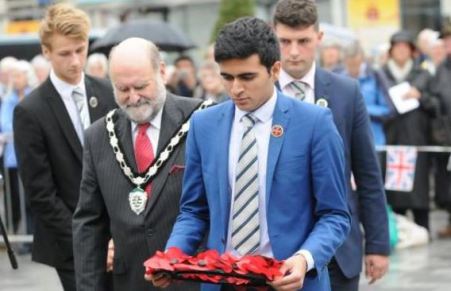
There are, I suspect very few schools with such illustrious alumni, and no other state school that I know of is able to celebrate being together in such a splendid setting.
SDS
There is, of course, something of a conceit which is barely concealed in the very idea of a blog. The concept of sketching out one’s thoughts and then posting them and expecting others to read. That is not the objective of this regular column; rather it is my aim to engage as many readers from the community of the school as I can, and by doing so bridge the gap which inevitably exists between a secondary school and the people who live and work in the ‘normal’ world outside. No-one who has not worked inside a school full of youngsters on a regular basis can ever hope to have an understanding of what life is really like on the inside of the school gates, so this is intended to be the next best thing. I hope that you find it by turn useful, informative and occasionally even entertaining; whatever else is true about life in Bishop’s it is never, ever mundane!
I write this sitting in the Library on a Monday after school with a fair number of boys using PCs while at Homework Club. It’s rather difficult for them as the sun is shining brightly outside the high windows on what is probably one of the last really warm days of the year. The day has been one (once again) dominated by the activities within the building compound. First thing this morning a crane capable of lifting up to 60 tonnes inched its way through the gates, followed by one of the biggest articulated trucks that I have ever seen.


Timber – large lumps of it – were the order of the day as the jib swung into action, at one point lining up perfectly to give the illusion that the spire could be lifted too. Around the site a forest of tubular steel demonstrates that the building is ready to grow upward. It’s all very exciting.


The knock-on effects of the building are pervasive. Cars have disappeared from the main parking area at the southern end of the site, quickly replaced by teeming masses of younger boys who roost on the plastic bollards like so many cormorants on a striped breakwater. The displacement of humanity continues at the other end of the site too; boys occupy the garden of No11, and though ball games have had to be curtailed in actual fact the boys now probably have more space (collectively) than they had before construction started. What’s more the space is safer for them to use too, as fewer vehicle movements mean that they can move around the site more or less at will. There are some benefits to be felt, although it is undoubtedly true that life will become more tricky as the weather gets more wintry in nature. The staff, meanwhile, are having to find alternative parking away from our city centre site. We have now provided a small number of spaces at Britford Lane, and we are hoping to increase this provision later on during the year. One thing to bear in mind later in this academic year is that there will be little or no parking available on site when there are evening meetings, as we still have lettings in the Sports Hall as usual. The days of free parking for all are now in the past…
SDS